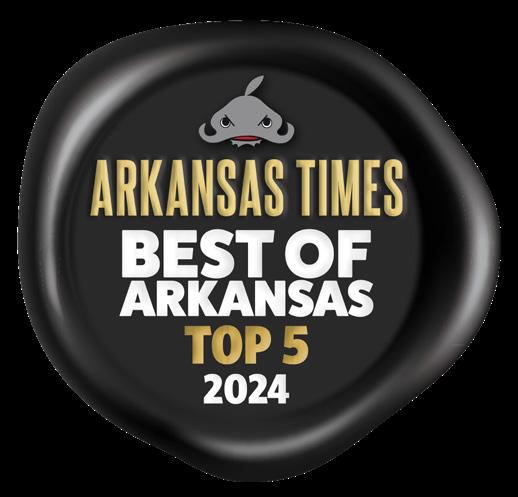




VOLUNTEERS TURN IN 100K+ SIGNATURES, MEET ROADBLOCKS IN BATTLE FOR ABORTION RIGHTS









JONESBORO 2840 S Caraway Rd. Jonesboro, AR 72401
jonesboro.hgi.com

www.beechwoodpinnaclesales.com

State officials look for ways to thwart the will of the people on abortion rights.
By Austin Gelder, Benjamin Hardy, David Ramsey and Matt Campbell
32
Old blood, new blood and hope eternal for the future of Razorbacks athletic programs.
By Beau Wilcox
From the Vault: Arkansas Times’ longstanding love affair with skinnydipping.
Q&A: With Holly Dickson, director of the ACLU of Arkansas.
Big Pic: Arkansans and the Olympics.
The Reel Queer Film Festival at The Studio Theatre, ‘Jitney’ at The Rep, ‘Dovetail Purses’ at ESSE Purse Museum, The Summer Get Down Music Fest at The Hall, a riverside return from Turnpike Troubadours and more.
How early is too early to talk to your kids about money?
By Tricia Larson
CUE THE JETS: Hog fans count down to the kickoff against Brigham Young University at Donald W. Reynolds Razorback Stadium in September 2023.
Jen Fawkes on the feminist subterfuge in her debut novel, “Daughters of Chaos.”
By
Daniel Grear
Different Dough’s Detroit-inspired pies are drawing a crowd.
By Dave Anderson
What the medical marijuana amendment aims to change — and how it compares to law in neighboring states.
By Griffin Coop
Nostalgia, fireworks and the view from Willow Street.
ON THE COVER: Reproductive rights supporters cheer on the July 5 delivery of signatures in support of putting abortion on the ballot. Photo by Brian Chilson.
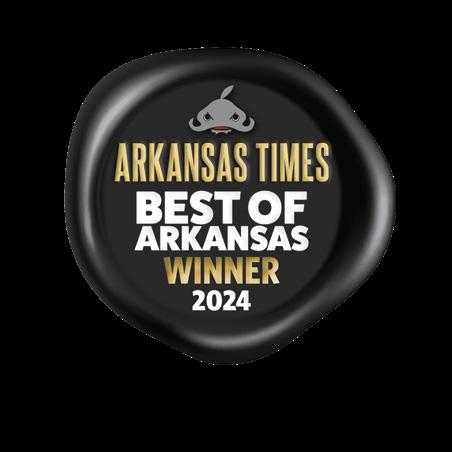
• University Transfer Curriculum
• Nursing
• Emergency Medical Technician
• Health Information Technology
• Cybersecurity
• Entrepreneurship
• Business
• Airframe and Powerplant Technology
• Culinary Arts

• Welding
• Automotive Technology
• HVAC-R
• Advanced Manufacturing
• Diesel Technology
• CDL Training
• Continuing Education
• Specialized Training for Business and Industry
• Many More!



PUBLISHER Alan Leveritt
EDITOR-IN-CHIEF Austin Gelder
CREATIVE DIRECTOR Mandy Keener
EDITORIAL DIRECTOR Stephanie Smittle
MANAGING EDITOR Benjamin Hardy
ASSOCIATE EDITOR Rhett Brinkley
CANNABIZ EDITOR Griffin Coop
DAILY EDITOR Lara Farrar
ENTERTAINMENT EDITOR Daniel Grear
INVESTIGATIVE REPORTER Matt Campbell
REPORTER Debra Hale-Shelton
AGRI AND ENVIRONMENT REPORTER Phillip Powell EDITORIAL INTERN Milo Strain
EDITOR EMERITUS Max Brantley
CONTRIBUTING EDITOR Mara Leveritt
PHOTOGRAPHER Brian Chilson
DIGITAL MARKETING MANAGER Madeline Chosich
DIRECTOR OF DEVELOPMENT Wythe Walker
ADVERTISING ART DIRECTOR Mike Spain
GRAPHIC DESIGNER Katie Hassell
DIRECTOR OF ADVERTISING/ SPECIAL PUBLICATIONS PUBLISHER Brooke Wallace
ACCOUNT EXECUTIVES Terrell Jacob, Kaitlyn Looney and Evan Ethridge
ADVERTISING TRAFFIC MANAGER Roland R. Gladden
SPECIAL SECTION MANAGING EDITOR Becca Bona EVENTS DIRECTOR Donavan Suitt
DIRECTOR OF CANNABIS SALES AND MARKETING Lee Major IT DIRECTOR Robert Curfman
CIRCULATION DIRECTOR Jackson Gladden
CONTROLLER Weldon Wilson
BILLING/COLLECTIONS Charlotte Key
CHAIR MAN Lindsey Millar
PRODUCTION MANAGER Ira Hocut (1954-2009)

ARKANSAS TIMES (ISSN 0164-6273) is published each month by Arkansas Times Limited Partnership, 201 East Markham Street, Suite 200, Little Rock, Arkansas, 72201, phone (501) 375-2985. Periodical postage paid at Little Rock, Arkansas, and additional mailing offices. POSTMASTER: Send address changes to ARKANSAS TIMES, 201 EAST MARKHAM STREET, SUITE 200, Little Rock, AR, 72201. Subscription prices are $60 for one year. For subscriber service call (501) 375-2985. Current single-copy price is $5, free in Pulaski County. Single issues are available by mail at $5.00 each, postage paid. Payment must accompany all orders. Reproduction or use in whole or in part of the contents without the written consent of the publishers is prohibited. Manuscripts and artwork will not be returned or acknowledged unless sufficient return postage and a self-addressed stamped envelope are included. All materials are handled with due care; however, the publisher assumes no responsibility for care and safe return of unsolicited materials. All letters sent to ARKANSAS TIMES will be treated as intended for publication and are subject to ARKANSAS TIMES’ unrestricted right to edit or to comment editorially. ©2024 ARKANSAS TIMES LIMITED PARTNERSHIP


THURSDAY, SEPT


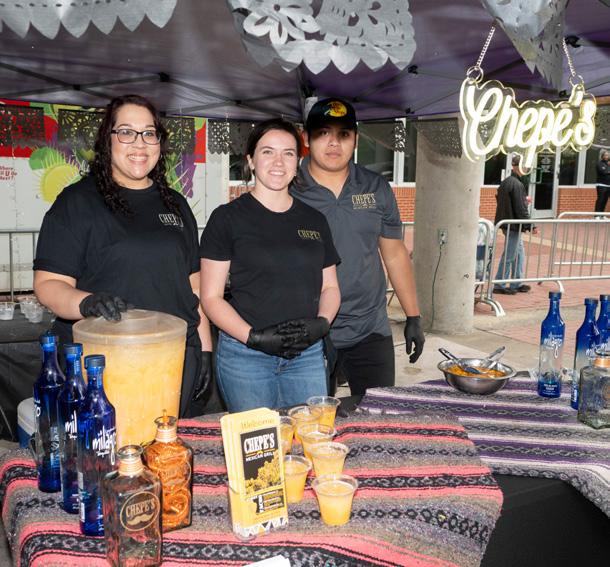









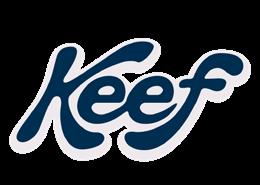










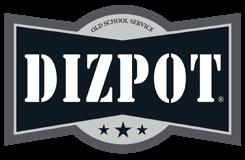




ping illegally out of their clothes and un abashedly into the water. Yes, indeed, Arkansas is thawing out nicely”:
As a sport, skinnydipping started a long time ago, back when people wore fig leaves for clothes. It is said that a number of English kings did it, some with more abandon than others, and President Johnson is supposed to have paddled nude in the White House pool. It has been popular down through the years because it has always felt so good. Of course, you don’t have to buff it to feel good in the water, but just try enjoying a shower in a pair of cutoffs or a long soak in the tub with your bathing suit on.
Nowadays, skinnydipping in Arkansas has gained widespread popularity and is regarded by some as a real problem. The State Police may look at you twice if they catch you at it but they will also lock you up, and the Parks and Tourism people avoid the subject altogether in their literature, no doubt fearing the power of suggestion. As it was once explained to me, “We can’t have naked people lying around on our islands and shores, swimming and frolicking and volleyballing and who knows what else all over the place. …”
Longtime Arkansas Times reporter Leslie Newell Peacock stripped away the emperor’s legislator’s clothes in a 2007 story titled “Naked Comes the Bather,” laying bare the hypocrisies of Sec. 5-68-204 of state law.
Where can you skinny dip when our blistering Arkansas summer rolls around? Anywhere you want. Where can you legally skinny dip? Nowhere.
Arkansas’s got one of the most restrictive laws on nudity in the nation, various nudist
websites who’ve done the comparisons claim. Arkansas law (Sec. 5-68-204) prohibits persons from exposing their “private parts” to anyone except a spouse or doctor. Not only can we not go about in the nude, we can’t even “advocate, demonstrate, or promote” nudity. Which would make it illegal to try and change the law.
But as we all know, the law is a ass, in this case one that’s covered up. It’s blithely ignored anywhere there is water, of course, unless perhaps in those snaky sloughs that flow slowly through the flatlands.
The private part of private property is cover enough (though the Arkansas law, read literally, doesn’t even allow that). But for those of us who don’t have our own lake or river to cool our skin in, public property will have to do. And it does.
So, where can you skinny dip, we asked, on [DeGray Lake]? “Anywhere you want,” said Mark Campbell, assistant superintendent of the state park. He was, of course, being facetious. He knows the law. He also knows that there are quite a few “secluded coves” where people have been known to swim in the buff. There’s a beach off Highway 7, and some people claim to have taken it off in that quite public area, but Campbell hasn’t seen it. “It’s a good place to look at girls in bikinis,” though, he added.
The only nakedness DeGray’s park personnel see commonly is at Caddo Bend Recreation Area, where sometimes they’ll see “a young lady with their top undone,” lying on their stomachs, reading a book in the sun. That’s OK, he said, until they rise up and someone is affronted.
Greers Ferry has a reputation for nude frolicking — it won a 2003 “Best of Arkansas” prize from this newspaper for best place to skinny dip, and the Greers Ferry Lake/Little Red River Tourist Association ran an advertisement in the Times expressing its gratitude.
Benny Rorie, the natural resource specialist (who better to ask?) for the Corps of Engineers lake, acknowledged that bare skin is dipped into the 31,500-acre lake. When rangers on boat patrol after quiet hours, which start at 10 p.m., shine a light on people bobbing up and down, their clothes on the bank, they “kindly ask them to depart,” Rorie said. A couple of years ago, a ranger in a boat came across a man shooting photographs of his nude wife posing against a bluff. They were asked, kindly, to cut it out.
Being discovered by a ranger can be embarrassing, of course. On the Cossatot River, which is designated a national wild and scenic river and natural area, things do get wild and scenic. A park employee who came across a couple on a gravel bar enjoying one another’s company was going to give them their privacy, but the man decided to try and act naturally, asking the park employee questions about the
river as he pulled on his shorts.
The Highway 278 bridge over the Cossatot, by the way, would not be a good place to break Arkansas law. There’s a camera mounted there to take river readings. Ranger Steve Walker, quoting his boss, said, “You have to be careful what you do in the wilderness because somebody will probably see you.”
Eureka [Springs] is also famous for natural bathing in Beaver Lake and the Kings River. The website swimmingholes.org notes that
scriptions and directions to 37 swimming holes in Arkansas (only Hogscald gets the skinny mention) and was last updated in January, a petition drive to keep the boats from coming to the Hogscald Hollow cove is under way.
Nudity does not equate with hanky-panky, contrary to the fantasies of the members of the Arkansas Legislature. Families do swim undressed — especially if they aren’t American. This writer was at Cedar Falls on Petit Jean Mountain when a family of four casually doffed their clothes for a plunge into the lovely deep pool at the bottom of the falls. They were speaking French, and it was the most natural thing in the world to them to slip out of their togs and into the water. And surely, natural it is.
***
In response, we received a letter from a Dr. Paul Rappaport of the Federation of Canadian Naturists, a reader from far-flung Ancaster, Ontario, calling for either Newell Peacock in handcuffs or else the rebirth of The Natural State’s tourism strategy:
The article “Naked comes the bather” was a revelation. But if promoting nudity in Arkansas is illegal, the author must be arrested. Surely Arkansas courts can find this person guilty of something: if not breaking the “All Nudity is Evil” law, then how about treason? Surely skinny-dipping goes against national security, God, and politicians — all of which are pretty much the same anyhow, right?
It says in some book that God created man naked in his own image, in the garden of Eden. I guess Arkansas doesn’t believe that book. As for the present-day divinely created human body, Arkansas has the reputation of being the most backward and phobic state in the country. Saying the law is an ass doesn’t quite — pardon the notion — cover it. What about the entire state legislature?
Arkansas should either prosecute your writer or repeal its absurd, unconstitutional, anti-human legislation immediately — and declare several public beach areas clothing-optional. (Just watch the revenue come in, folks.) It could go from national pariah to national leader instantly.
***
Hogscald Hollow south of Eureka off [Route] 148 was once a hotspot for skinny dipping until word got out “and over to the marina.” Eventually, the writer says, a flotilla appeared to “check out the nekkid people” and watch them leap from a 50-foot cliff into the river there. According to the website, which features de-
Finally, though presumably appropriately clothed, Arkansas Times contributing editor David Ramsey logged a convincing rebuttal in the summer of 2013 to the results of that year’s Best of Arkansas poll, in which readers declared via the ballot process that Wild River Country (RIP) was the state’s “Best Place to Swim.” More on the shuttered North Little Rock water park that, as Ramsey correctly notes, “is neither wild, nor river, nor country”:
Dear readers, despite your vote, it is not the “Best Place to Swim.” Actual swimming, while possible, borders on downright rude. The pools are packed with teenagers scream-
ing, flirting and doing the Dougie. Wild River Country is for them. It is not for people seeking summer relaxation. It is not for grumps, scolds, cynics or agoraphobes. WRC is not the place for caution or quiet. Grownups are welcome, but a grownup state of mind is not.
On a recent Saturday, my wife and I braved the hordes and spent an afternoon at the Country. It had been years since either of us had been to a water park. It will likely be years before we return. We splished and splashed, got proper sunburns, and stoked our endorphins. Despite the fact that we are well past 16 years old and were stone-cold sober, we had a pretty good time. Here is our report.
PEOPLE WATCHING: Will the woman with a “Love see’s not with the eyes but with the heart” tattoo one day face the decision of whether to pay for apostrophe removal? Outside the confines of a water park, will the guy with the sunburn line perfectly forming the shape of a tank top go shirtless and fool people into thinking he’s actually wearing a tank top?
WRC PRO-TIP ONE: Bring water shoes. Flipflops are liable to fly off on the rides but good Lord, the concrete is unrelentingly hot if you go barefoot. We kept thinking we’d get used to it. Nope. On the plus side, the goal here is to get in touch with your inner child, and few things are as infantilizing as hopping from shadow to shadow, screaming “ouch” every time your feet hit the sunlit ground.
THE LINES: This is the core problem with water parks. It’s hot, so you want to go on a ride and get wet! But so does everyone else! A pie chart depicting the amount of time we spent in line and the amount of time we spent on rides would probably be depressing. Especially when you spend the slow climb up the stairs behind grown men telling multiple strip-joint stories with the same “I’m not drunk enough for that” punch line. My suggestion is to keep in mind that the seconds of fun awaiting you are in fact more rewarding after the minutes of aggravated waiting. Think of Emily Dickinson: “To comprehend a nectar requires sorest need.”
WRC PRO-TIP TWO: Sneak in booze. Let’s grant that it would be a completely terrible idea for a water park to sell alcohol but let’s also grant that grown folks are probably going to have a better time at a water park if they’re a bit sauced.
THE WAVE POOL: Pass. The wave pool is not our scene. We were all ready to be nostalgic but they don’t even play “Wipeout” when the waves come anymore. Two points on the wave pool: 1) The number of personal-injury attorneys with online advertisements specifically referencing wave-pool accidents would freak me out if I was one of the lifeguards. But to their credit, the lifeguards were some of the least freaked-out people you could ever care to see. 2) As you enter the pool, you have to step over the deeply bronzed people sunning on the


RIP, WILD RIVER COUNTRY: Where the covertly buzzed braved the sting of chlorine and the scald of hot concrete.
“beach” — the painted slab of concrete by the water. Or if you’re a child, you jump over them and splash them with pool water. If the Times had a “Worst Place to Sunbathe” category, the wave pool beach would beat out the I-40 median.
LORD OF THE FLIES: Water parks are not just for teens, but run by teens. Other than the very unhappy-looking dude cooking hamburgers (by the way, it seems really cruel that he had to wear a black uniform as he stood over a giant grill in 95-degree heat), every single employee was a teenager. There probably aren’t that many large operations that would be well served by bored, adolescent managers making eyes at each other, but I have to say, WRC does all right.
WRC PRO-TIP THREE: Sneak in snacks. Sometimes people actually get a hankering for the “World Famous Chicken Tenders Combo” and pay the full $30 admission to WRC just to get their hands on that delicious chicken plate. Just kidding! The food is heinous.
THE RIDES: So yeah, it’s hot and there’s a lot of waiting and the whole place smells like coconut suntan lotion. But you know what’s fun? Sliding down the water, by inner tube or by bottom, and landing in a pool. That’s fun.
We may be creaky-kneed adults who are a little scared of heights, but we were undaunted. We tried every ride in the park. We
rode the twists and turns of the Pipeline and the free fall of the Accelerator. We braved the darkness of the Vortex. We labored through the butt skidding and foot cramming of the Wild River Rapids. We wondered about the oddly humid section of the Cyclone. I experienced genuine fear on Black Lightning and White Lightning, which are not intended to be scary. But you slide down an open-air shoot, and as I swung up the sides, back and forth, I became convinced that the physics weren’t designed for adults and I would fly out into the trees. I nearly crushed my elbow bracing myself to be tossed into the wilderness.
Our final turn was on Vertigo, the one ride I distinctly remember from previous trips to WRC. For some reason they chickened out and didn’t call this “The Toilet” but the genius premise is that you slide straight down a thin, steep, enclosed tube and then are shot out at high speed into a giant bowl, where you spin round and round until you plop into the water. Vertigo is WRC’s masterpiece. Glorious spin, inglorious plop. I’ll admit it, we still felt the rush of adrenaline on the ride home. Or it might have been the sting of chlorine. Either way, it was summertime in the U.S.A., and we were riding high.


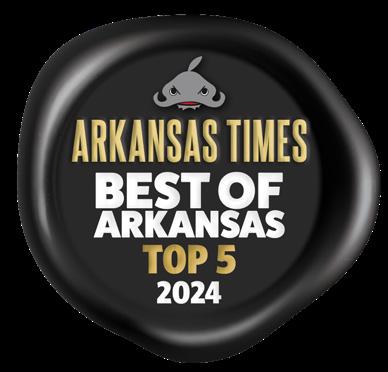
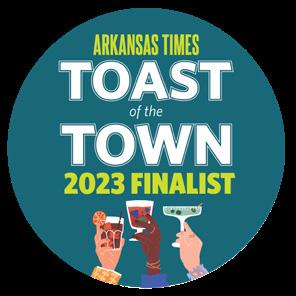


ACLU of Arkansas Executive Director Holly Dickson said her eyes were first opened to racial injustices in Arkansas and the nation as a child, when she saw the advocacy of Black Arkansas trailblazers like Nolan Richardson and Lencola Sullivan, the first Black woman to be crowned Miss Arkansas. After law school in Little Rock, Dickson launched a private practice focused on civil rights and employment law. She joined the ACLU of Arkansas in 2006 as legal director where, among other big moves, she blocked a ballot initiative that would have barred LGBTQ+ people from adopting children. In 2019, Dickson became the state ACLU’s interim executive director. She took on the position permanently in 2020. Now, as the ACLU of Arkansas celebrates its 55th anniversary, it faces new setbacks, including Arkansas’s restrictive abortion ban, set in motion by the Dobbs v. Jackson Supreme Court decision in 2022. Dickson said she felt as though Arkansans were facing the same legal and political debates they have for decades.
What’s the most rewarding part of your job? And what’s the most frustrating?

CURRENTLY READING: “West with Giraffes,” by Lynda Rutledge and “Shielded,” by Joanna Schwartz
HOBBY: Visiting zoos with family
EDUCATION: UALR’s William H. Bowen School of Law
The most rewarding part of the job is the people connected with the work. The people with whom we do the work, the people we do the work for, the people who make the work happen, even some who are obstacles to the work. As for the most frustrating part, we have a saying in our office: “Everything old is evergreen.” We no longer have Roe. We still don’t have women’s equality. Racial justice has gone backwards. All of those old struggles still exist, so the most frustrating part for me is not being able to get immediate results. We want to have that world that was promised to us — the world we wish to live in, the promises of the Constitution, civil rights laws being implemented and respected, now. … It’s the continuing onslaught of folks who are trying to fight those old fights. I don’t think history will be on their side, but the frustrating part is the harm to the people happening in the meantime while we do our work.
How would you characterize the work the ACLU of Arkansas has done over the past 55 years?
Trendsetting, in many ways. When we first started doing
LGBTQ rights work, it was very unpopular. It was the ’80s, so no one was doing it, and a lot of our donors and supporters did not care for it. But we have always kept a varied agenda and docket. We’re not just looking to advance one issue area, we are trying to advance all of the civil liberties and civil rights guaranteed to Arkansans and Americans. You pick your issue area, and I can find something in the 55-year history of the ACLU of Arkansas where we have worked to advance it. Not only issue and topic diversity, but also geographic diversity. A lot of people think that the ACLU is just in Little Rock, or it’s an urban organization, but we’ve worked in cities, towns and spots in the road across the state.
You’re Arkansas born, raised and educated. Is it difficult being in frequent opposition with those leading the state you call home?
Would you characterize it that way? I wouldn’t, because I’m consistently and primarily in opposition to the politicians who have been elected to office, but I think they’re out of step with most Arkansans. These [issues] are not just legal questions for us. They are affecting Arkansans’ lives and opportunities, and we don’t just challenge them to get good rulings or rack up academic wins. We look for impact cases that protect the fundamentals of democracy — transparency, free speech, right to association, all of those things — as well as the systemic equality that we know we are still striving for in this country. I think maybe it’s the libertarian streak that runs throughout Arkansas as well, that we tend to think for ourselves, and [it’s the] same with most people, including a lot of the legislators you may never think we’d work with. I tend to look for commonalities, and even if we’re never going to agree on any issues, I want to find commonality in another person’s humanity. I think coming from that sincere place, which is a persona most Arkansans share — that we do care about one another, whatever you may say about your politics. When you are faced with a person’s needs, that’s a person, and we care about people. So one of the best things has been getting to work with unlikely allies.
—Jack Clay
FIVE OLYMPIC STORYLINES WE’RE FOLLOWING FROM AFAR.
There’s no shortage of athletes with ties to The Natural State competing for the gold at the 2024 Paris Olympic Games. If you’re a Razorback fan who mostly supports the big three — football, basketball and baseball — you can root on the Hogs’ undersung track and field stars, who have been quietly winning national championships (more Division 1 titles than any other university!) and breaking collegiate records along the way. Here are some storylines we’re following at this year’s Games. For the full list, visit arktimes.com.

Arkansas Razorback graduate Hunter Woodhall — a doubleamputee sprinter and three-time Paralympic medalist — and wife Tara Davis-Woodhall — a world champion long jumper known for donning a cowgirl hat and boots before and after competitions — will make the trip to Paris together to compete for Olympic and Paralympic gold. The Northwest Arkansas couple runs a popular YouTube channel with more than 700,000 subscribers and worked a pre-Olympic shift together at Fayetteville’s Raising Cane’s in July.
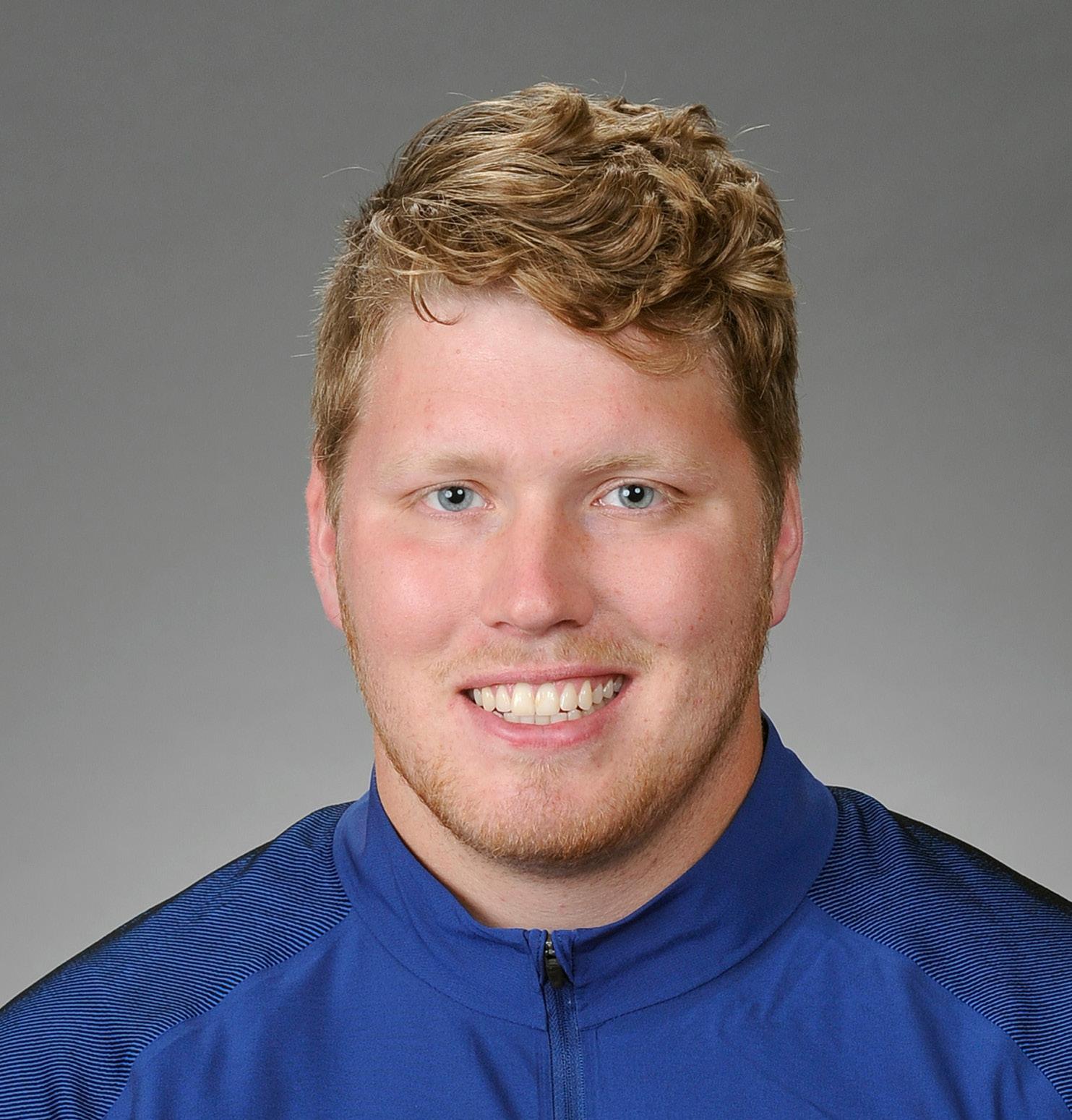

JOSCELYN ROBERSON
Ryan Crouser, an Arkansas volunteer assistant for the men’s track & field program since 2020, will compete for his third Olympic gold in the shot put. He holds the world record and Olympic record in the event. According to the Paris Olympics website, Crouser spends part of his time training in Fayetteville and fuels his body-building workouts by eating up to 5,500 calories a day.
Joscelyn Roberson, an incoming freshman and World Champion from Texarkana, Texas, will be the Razorbacks’ (aka Gymbacks) first representation at the Olympic Games as a traveling replacement athlete for Team USA. Gymbacks Coach Jordyn Wieber won the Olympic gold medal at the 2012 London Olympics and led Arkansas to one of the best seasons in program history in 2024, finishing seventh overall at the NCAA Championships.


Northwest Arkansas’s vast network of bike trails has provided training grounds for the Bentonville-headquartered U.S. National Mountain Bike Team. In June, U.S. Cycling CEO Brendan Quirk — who spent part of his childhood in Little Rock attending Catholic High School for Boys — announced at a press conference that this year’s mountain bike team is sending its full quota of two men (Riley Amos and Christopher Blevins) and two women (Haley Batten and Savilia Blunk) to the Olympic Games for the first time.
Former Razorback runner Nikki Hiltz set a U.S. Olympic trials record this year in the 1,500 meter race, securing their first Olympic berth. Hiltz, who uses they/ them pronouns, came out as nonbinary and transgender on International Trans Day of Visibility in 2021. Assigned female at birth, Hiltz has chosen to postpone testosterone hormone therapy to qualify for the women’s division. “Going to the Olympics is such a dream of mine,” Hiltz said in a 2023 interview with Runner’s World. “But it’s also such a dream of mine to take testosterone or grow facial hair or have top surgery ... sometimes I can really resent this sport.” After breaking the American record in the mile in 2023, Hiltz posted to Instagram to acknowledge the significance of their achievement. “How cool is it that in a country who seems to be fixated on hurting trans people, a very out, very proud trans nonbinary athlete now holds their mile record? There are a lot of things I could probably attribute my recent successes to, but I think the most powerful tool I have is my joy.”











SATURDAY 8/17. THE HALL. 7:30 P.M. $15-$35.
I’m a little reluctant to use the word “festival” to describe only four performances over the course of a single night, but the lineup for The Summer Get Down Music Fest — advertised as a communion of Afrobeat, soul, funk, R&B and hip-hop — is so good that I’m willing to give its organizers a pass. The choice alone to pair the eight-piece, genre-fluid Funkanites (pictured above) with the trumpet-led jazz fusion of the Rodney Block Collective — two of Central Arkansas’s grooviest and most technical groups, both of which have over a decade of gigging under their belts — is enough to seal the deal on this being a stellar show. The addition of Little Rock native DJ Xavier Riley and North Little Rock producer Chordandjocks, whose lo-fi instrumentals morph from one glitchy shuffle to the next, is just icing on the cake. Get tickets at littlerockhall.com. DG

SATURDAY 8/17. FIRST SECURITY AMPHITHEATER. 6:30 P.M. $54-$241.50.
When Oklahoma country rock outfit Turnpike Troubadours take the stage at First Security Amphitheater on Aug. 17, it will be two weeks short of six years since they were last scheduled to play in Little Rock. That was when, while touring in support of their terrific 2017 album “A Long Way From Your Heart,” erratic performances from frontman Evan Felker forced the band to cancel multiple shows, including a September 2018 concert at Robinson Center. An indefinite hiatus for the band followed shortly after, and many fans feared the worst. With the release last August of their sixth studio album, “A Cat in the Rain,” it’s safe to say those fears were unfounded. Felker’s songwriting has always been at its best when he blurs the line between poetry and narrative, like a sort of red dirt Rudyard Kipling, and the new album is no different. Whether he’s singing about longtime love in “Brought Me,” lamenting a breakup in “Lucille,” using deer hunting as a metaphor for life in “The Rut,” or talking about an old Gulf Coast relationship in the title track, “A Cat in the Rain” shows Felker can still write with the best of them. Charles Wesley Godwin and Tyler Halverson are set to open. Get tickets at ticketmaster.com. MC
THROUGH SUNDAY 9/15. ESSE PURSE MUSEUM. $8-$10.
Who says handbags have to be dainty? That seems to be one of the questions driving New Orleans-based artist Jennifer Dove Cooper, whose handmade purses are fashioned from recycled materials, like egg cartons, clothing scraps and water bottles. She then intricately decorates them with papier-mache and paint, pushing her one-of-a-kind designs to a darkly illustrated and occasionally whimsical place. An exhibition of Cooper’s work is on display at the ESSE Purse Museum, open 11 a.m.-4 p.m. Tue.Sun., where a selection of her jewelry, ornaments and decor is also available for purchase. DG
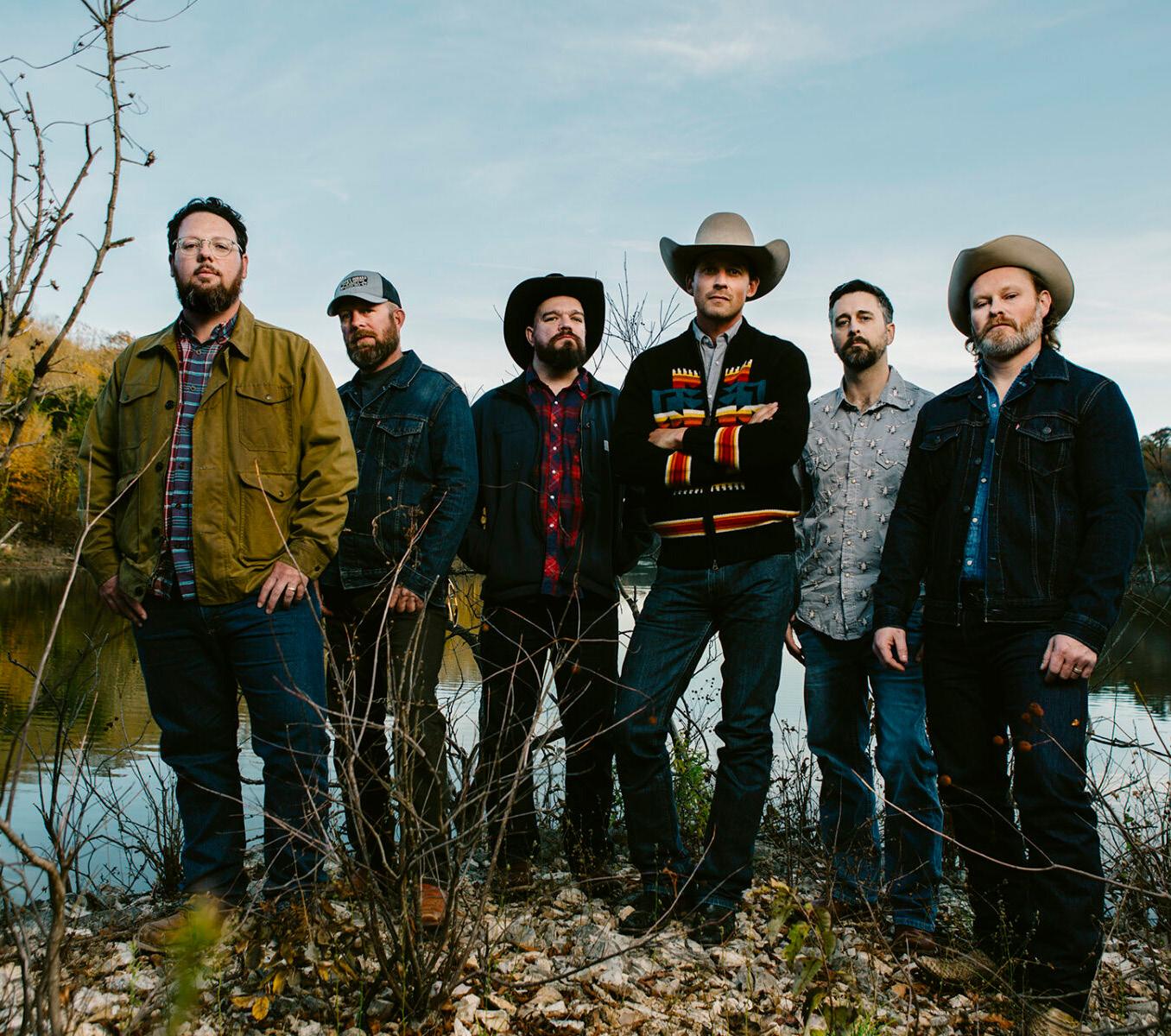
SUNDAY 8/4. WHITE WATER TAVERN. 5 P.M. $10.
It gets dimmer with each passing year, but rock ’n’ roll used to be dangerous. Go look at tapes of young punks The Who going ape, tearing crap up. Hell, country music used to be a perilous proposition when sweat-drenched, liquored-up honky tonks needed only a George Jones noshow to erupt. Whether you wish to lament or decry those bygone days, it was a sign that the music and music-makers meant something. There isn’t a band that recalls those antiquated visceral jolts more than Central Arkansas outfit The Frontier Circus. Led by the towering, slightly unhinged and indefatigable Frontier Dan (Danny Grace), The Frontier Circus is an essential experience, playing an encyclopedic collection of rock/country/punk mash-ups with unmatched energy and comic flair underlined by oversized sombreros and Nudie suits. The occasion for the White Water show is the release of their new album, “Back in Town,” produced by Jason Weinheimer and filled with cover songs you never knew you needed. And what’s this? The return of Grace’s former band The Rockin’ Guys as well, who haven’t performed live in 15 years? We’ve declared national holidays for less. The Frontier Circus plays first. Get tickets at whitewatertavern.com. WT
THURSDAY 8/22-SATURDAY 8/24. ROBINSON CENTER. 7 P.M. THU.; 8 P.M. FRI.; 2 P.M. SAT. $20-$65.
In a rare partnership, the Arkansas Repertory Theatre and the Arkansas Symphony Orchestra will join forces at Robinson Center, coupling the state’s finest actor-singers with the state’s finest classical musicians for a semi-staged concert production of “Hello, Dolly!” A turnof-the-century comedy about a meddling and exuberant widow-turned-matchmaker who’s slyly trying to set herself up with one of her wealthy clients, the musical won 10 Tony awards when it premiered on Broadway in 1964, setting a record it would hold for the next 37 years. Though “Hello, Dolly!” will only be performed for three days, the large capacity of Robinson Center should allow a comparable number of guests to see the show as would be accommodated by a traditionally longer run at The Rep. Get tickets at therep.org. DG

MONDAY 8/26. SIMMONS BANK ARENA. 7:30 P.M. $29.50$179.50.
Often shirtless and always transcendent, bandleader, singer and percussionist Maurice White of Earth, Wind & Fire died in 2016 of complications from Parkinson’s disease, assuring once and for all that he’d not live long enough to witness the monumental ways in which his work would reverberate elsewhere in the music world. Then again, had he broken the laws of biology and lived to be 200, the same would be true. Earth, Wind & Fire was seminal not only because they so elegantly merged disparate elements of multiple kinds of music (jazz, R&B, gospel, classical, pop), but because they showed the world (the mainstream, at that!) that none of those genres would exist at all without Black innovators. Fortunately for listeners at this August arena concert, cornerstone EWF members Philip Bailey, Ralph Johnson and Verdine White (Maurice’s brother) seem to be carrying the torch with aplomb and energy, if reviews of recent concerts are any indication. Co-headlining the evening are rock vets and fellow genre-blenders Chicago, whose intricate vocal arrangements and imaginative horn riffs form the backbone of not only ’70s-centric rock radio, but American high school marching band repertoire. Get tickets at simmonsbankarena.com. SS

THURSDAY 8/8-SUNDAY 8/11. STUDIO THEATRE. $25-$125.
In honor of its 10th year, the Kaleidoscope Film Festival is rebranding itself as the Reel Queer Film Festival, a name that puts its identity as a celebration of LGBTQ+ moviemaking front and center. In addition to a slew of shorts, many of which come from Arkansas-connected filmmakers, this year’s lineup includes feature-length films like “The People’s Joker” (pictured above), a stylistically inventive parody that uses familiar superheroes to explore gender identity; “If I Die, It’ll Be of Joy,” a French triptych documentary portrait of three elderly people reckoning with the intersections of their queerness and aging; “Big Boys,” a tenderhearted camping trip flick about a clumsy 14-year-old boy who’s harboring a crush on his older cousin’s boyfriend; and “Sebastian,” a drama about an aspiring novelist in London who’s secretly moonlighting as a sex worker in order to do research for his debut novel. Find weekend passes and tickets for individual showings as well as a full schedule of screenings, meet-ups and panels at reelqueerfilm.org. DG
TUESDAY 8/6-SUNDAY 8/18. ARKANSAS REPERTORY THEATRE. $20$65.
The centerpiece of indispensable playwright August Wilson’s career is a series called “The Pittsburgh Cycle,” a collection of 10 plays about the Black experience, each set in a different decade of the 20th century. All but one of the plays takes place in the Hill District, a group of historically African American neighborhoods in Pittsburgh where Wilson was born. All of the plays were also performed on Broadway, though “Jitney” — Wilson’s treatment of the ’70s and the first of the series that he penned (minus extensive rewrites) — was the last to make it there, premiering in 2017, over a decade after his death. Oriented around a group of unlicensed cab drivers whose livelihood is threatened by the dubious promise of urban renewal, The New York Times deemed “Jitney” a “free-form urban concerto, shaped by the quickwitted, improvisatory spirit that makes jazz soar.” Get tickets at therep.org. DG
TUESDAY 8/20. RIVERDALE 10 VIP CINEMA. 7 P.M. $12-$14.
In the fall of 2020, director Steve McQueen released “Small Axe,” a series of five distinct but thematically connected films depicting the experiences of West Indian immigrants living in London. Taking place from the ’60s to the ’80s, some of the films — like “Mangrove” — were rooted in actual events. “Lovers Rock,” the second in the series, instead dramatizes a vibe and was unquestionably the breakout of the anthology. Coming in at a brisk 68 minutes and set in 1980, the film occurs mostly at a dancecentric house party, where a prospective couple — played by Amarah-Jae St. Aubyn and Micheal Ward — meet for the first time. Little dramas play out, and the DJ keeps the reggae and soul pumping throughout. The film entered the world at exactly the right time; viewers witnessed not only a beautiful expression of Black physicality, but a room full of bodies unfettered by the confines of social distancing — and unburdened by the societal prejudices and restrictions that lurk around the edges of the festivities. Get tickets at riverdale10.com. OJ
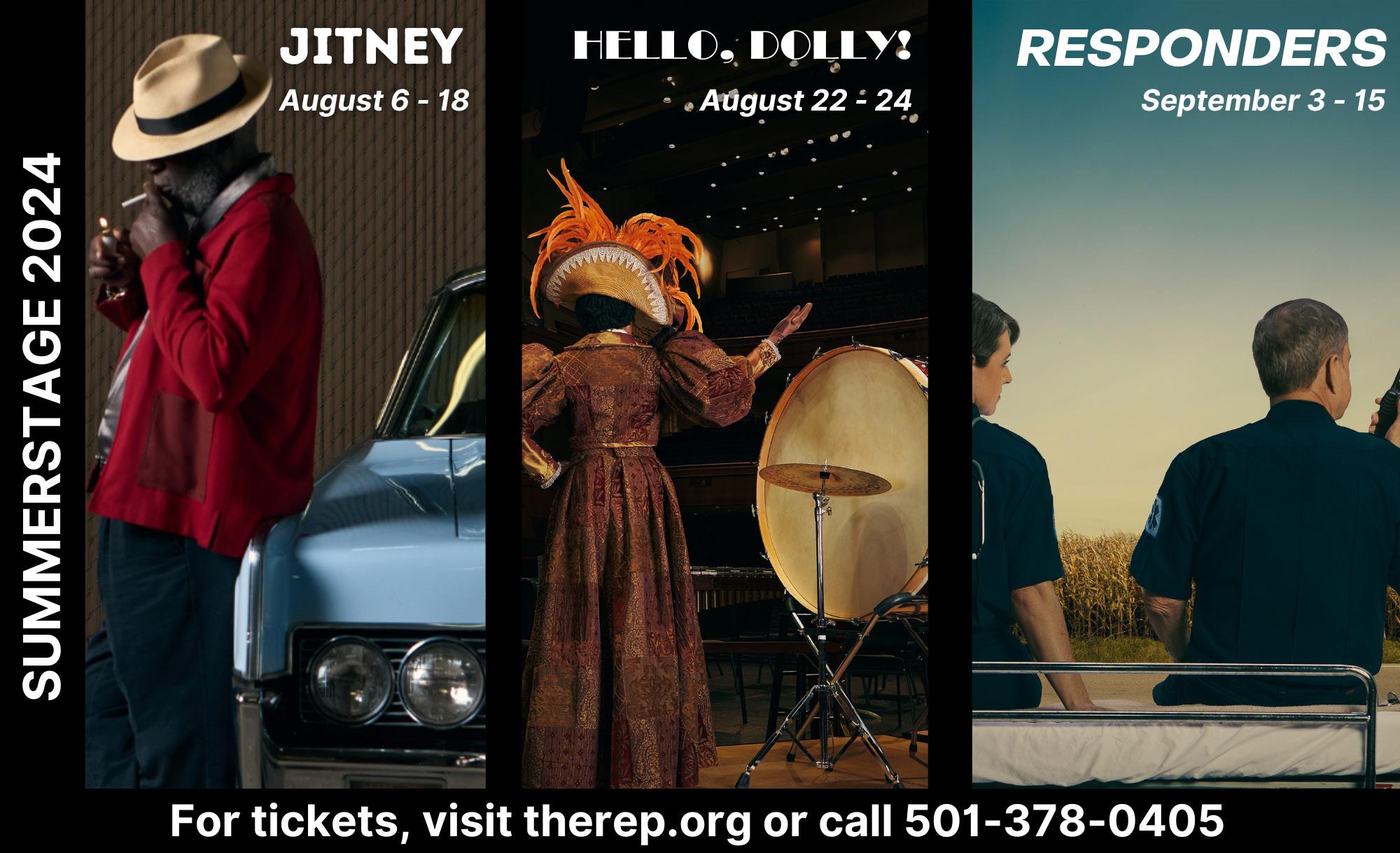
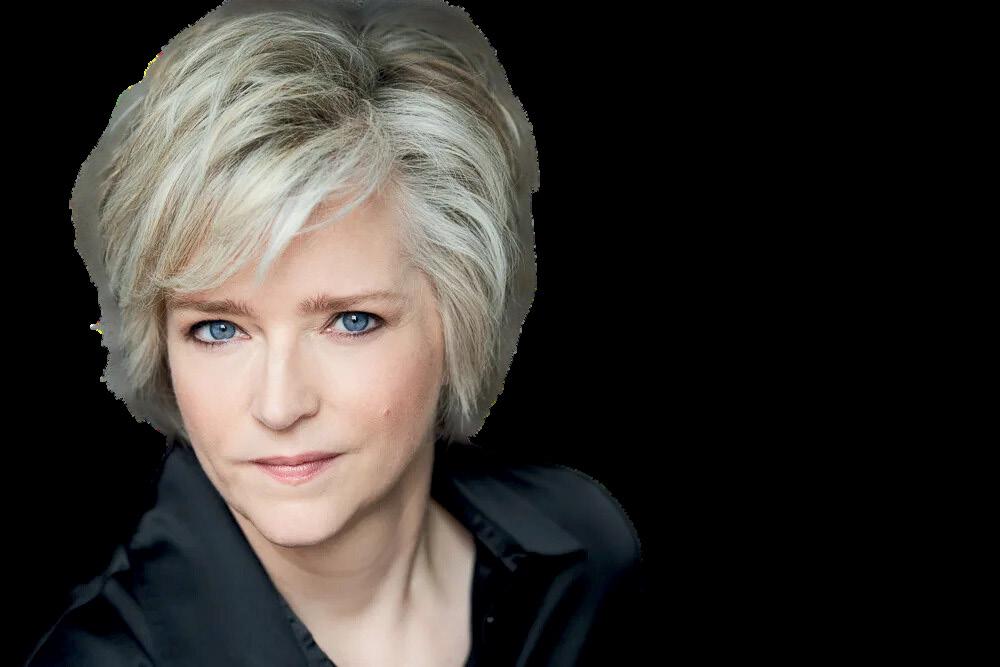

Karin Slaughter is the author of over twenty New York Times bestselling novels, including Pretty Girls, The Good Daughter, and Pieces of Her.Her books have sold more than 40 million copies in 120 countries. Pieces of Her is a #1 Netflix original series, and Will Tren airs on ABC and streams on Hulu and Disney+. Slaughter founded the Save the Libraries project, a nonprofit supporting libraries.
Pretty Girls, The Good Daughter, Pieces of Her.
Pieces of Her Will Trent
Thursday, August 22 | 6:30PM CALS Ron Robinson Theater Register at CALS.org.
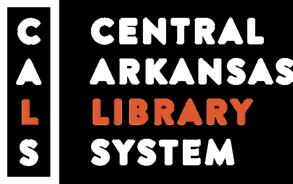



BY AUSTIN GELDER, BENJAMIN HARDY, DAVID RAMSEY AND MATT CAMPBELL PHOTOGRAPHY BY BRIAN CHILSON
Worn down after the homestretch push for signatures and woefully out of practice at winning much of anything, the first abortion amendment supporters to arrive at the state Capitol the morning of July 5 took a while to warm up.
Women in T-shirts printed with inspirational quotes and with hand-lettered posters tucked under their elbows dribbled through the security line starting around 11 a.m. that Friday, fresh-scrubbed but ruddy from hours, days and weeks of pacing sidewalks and manning tables in the summer sun, stubbornly collecting signatures in a bid to place a rollback of the state’s near-total abortion ban before Arkansas voters.
Rumors had started spreading the day before among the cadre of clipboard-wielding volunteers that their moonshot might actually pay off. A week that started with a 13,000-signature deficit had reached the 90,704 signatures needed to get on the November ballot by Friday, and then some. The scene on July 5 was a victory lap: Meet at the Capitol to whoop and holler and turn in boxes upon boxes of signed petitions. Pass it on.
Her sweaty sidewalk hustle finally done, Sebastian County volunteer captain Kellie Cobb clicked briskly into organizer mode as she waited for the petition to arrive. By noon, she was handing around a sack of multicolored “TRUST WOMEN” buttons to the swelling crowd and making sure everyone who’d
arrived empty-handed got a slogany sign to shake: “Arkansans Know Best,” “Healthcare Is Private,” “The People Rule.”
A dispassionate PTA-mom efficiency helped Cobb and her fellow volunteers collect tens of thousands of signatures in what Arkansas conservatives like to brag is “the most pro-life state in the country.” By Friday morning, though, exhaustion and elation punched through in a collective dam break.
“We’ve all been crying all day,” Cobb admitted. “Our solidarity, the love of this group, these canvassers, 300 women across Arkansas. We’re all sisters now.” (Organizers trained hundreds of volunteers but estimated the core group that brought in most of the signatures numbered around 350.)
That sorority included women of all ages, doctors in lab coats and children dashing around with increasingly wilted posters in their grips.
There were men in the crowd, too. Dr. Chad Taylor, a Little Rock OB-GYN and advocate for abortion access especially in cases where nonviable fetuses are doomed to suffer and die, brought his 83-year-old dad. A veteran who manned submarines in the earliest days of the Cold War, Don Taylor said he admired his son’s bravery.
“His mother would have been proud,” he said.
Mostly, though, it was women who rushed the doors and leaned over the rotunda rails when a moving truck finally pulled up out-
side shortly after 2 p.m. The unsuspecting movers hired for the job soaked in a hero’s welcome as they maneuvered dollies towering with white banker boxes through the cheering horde.
In the end, Arkansans for Limited Government, the group formed last fall to sponsor the amendment, turned in the signatures of an estimated 102,730 registered voters. Unlike with most petition campaigns that manage to hit the threshold, paid canvassers collected only a fraction of the total — about 14,000. The other 88,000 or so were gathered by volunteers like Cobb, pounding the pavement in cities and towns in every corner of Arkansas, speaking to friends and family and neighbors, and arguing the righteousness of the cause.
A message sent out that day from Arkansans for Limited Government celebrated the moment but cautioned volunteers there would be more heavy lifts in store: “... on Monday we get back to work because women’s lives are at stake. The hardest job is ahead of us, and we will not fail,” Executive Director Lauren Cowles wrote.
Those words proved prescient. Five days later, on the afternoon of July 10, Arkansas Secretary of State John Thurston announced he was throwing out the abortion amendment on a technicality.
The secretary of state’s office oversees the
WOMB, THERE IT IS: Movers haul in boxes full of signed petition sheets for the Arkansas Abortion Amendment.

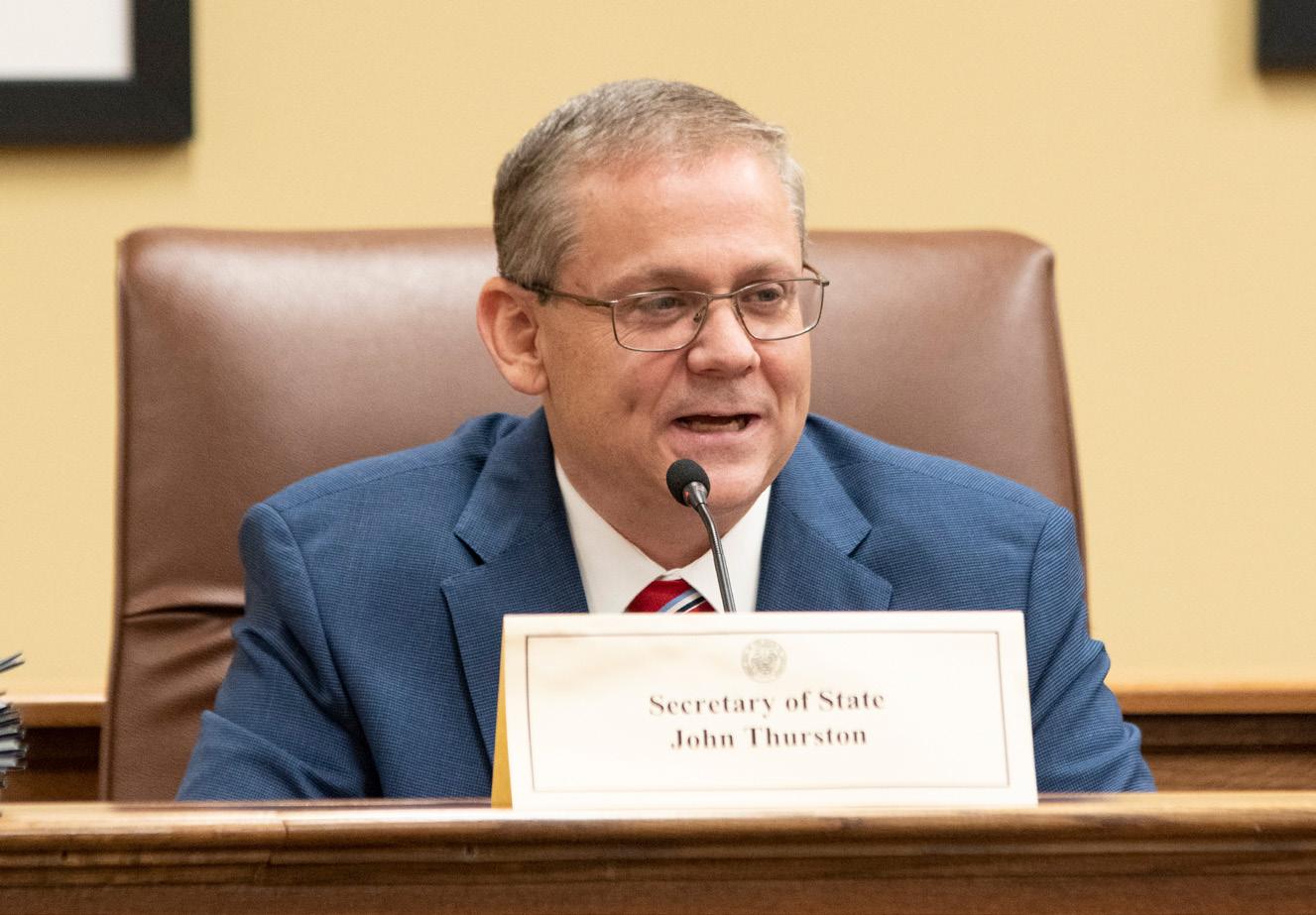
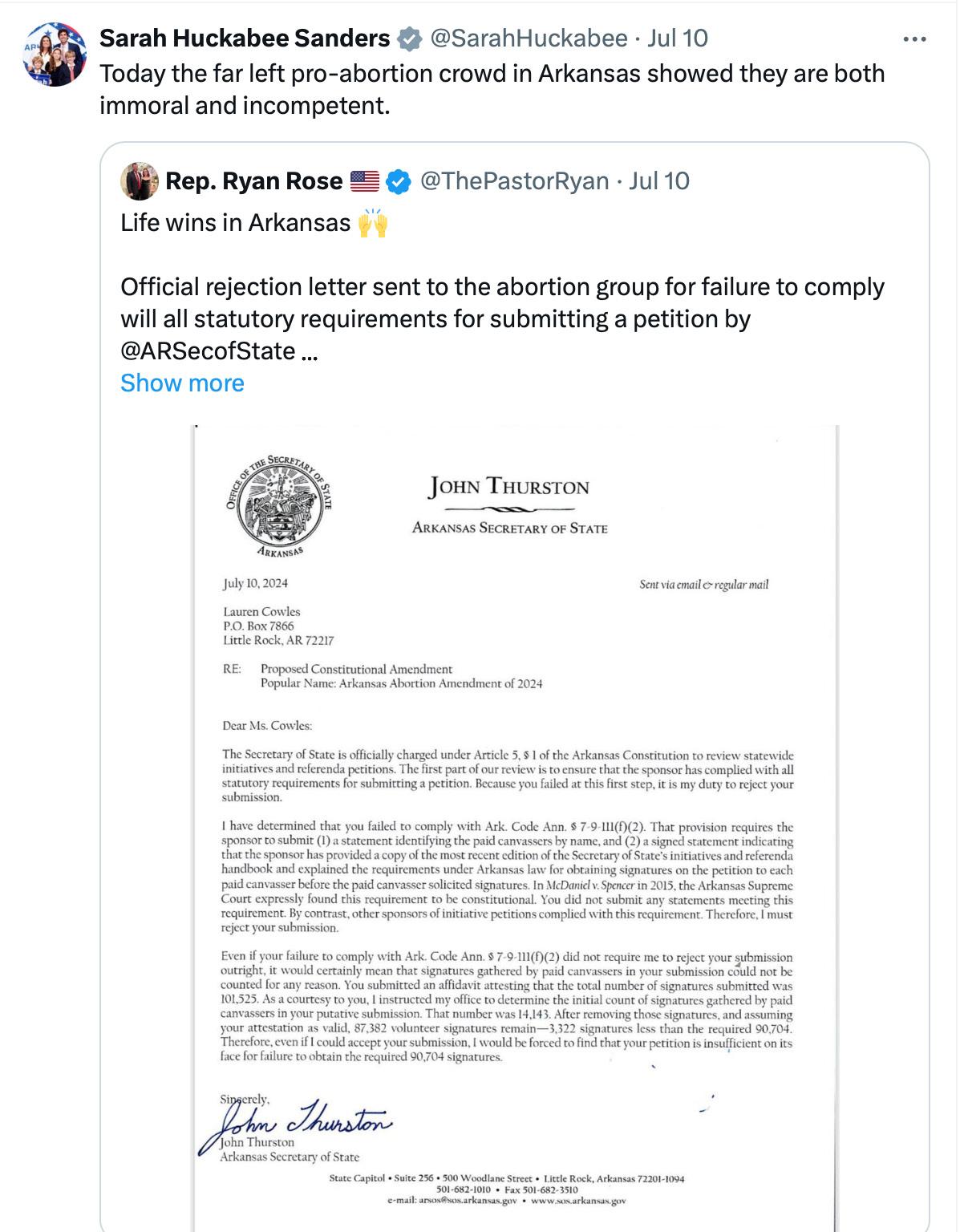
ACCUSATION OR CONFESSION?: Secretary of State John Thurston’s (top) explanations for the rejection continued to shift, while Gov. Sarah Sanders predictably took the opportunity to hurl insults on social media.
nuts and bolts of Arkansas’s ballot initiative process. Its staff is responsible for counting signatures, verifying those signatures belong to registered Arkansas voters and ensuring the groups behind petitions follow the rules.
In a perfunctory rejection letter, Thurston said abortion rights supporters hadn’t turned in a pair of required statements along with their petition — one listing the names of paid canvassers and another affirming that canvassers had been properly trained on state law. The group would have no chance to correct the error, he added.
State officials and anti-abortion activists pounced as soon as the news broke. “Failure to follow such a basic requirement is inexcusable,” Attorney General Tim Griffin gloated via official statement. “The abortion advocates have no one to blame but themselves.”
Gov. Sarah Huckabee Sanders piled on, too, assuming her usual snarl. “Today the far left pro-abortion crowd in Arkansas showed they are both immoral and incompetent,” she tweeted.
It was a gut punch for the organizers and their supporters — had all that effort really been for nothing, sunk by an unforced error?
But the next day, July 11, the plot thickened. When the Arkansas Times first asked Thurston’s office for all supporting documents Arkansans for Limited Government had submitted with its petition, a spokesman provided just three pages of records. Not long after, in response to a follow-up Freedom of Information Act request, he emailed back to say he’d “misspoke”: There were more records after all. Once the secretary of state’s office released the full slate of documents — more than 870 pages — Thurston’s reasons for nixing the abortion petition began to look more ticky-tacky.
The group had, in fact, turned in a list of all its paid canvassers. It had also submitted an affidavit from each canvasser attesting he or she had received the proper training. The only thing the group failed to turn in on July 5 was a signed statement from the organizers themselves, affirming that canvassers had been trained.
This statement is a requirement under the law, and is listed as one of the required elements for submitting a petition in the secretary of state’s handbook on ballot initiatives. But complicating matters further, Arkansans for Limited Government did in fact submit such a statement on June 27, eight days before the deadline, which would seem to cover at least the canvassers hired by that date.
In the days that followed, Thurston doubled down on his decision to reject the petition, but his explanations kept shifting. The June 27 statement shouldn’t count, he claimed, because it should have been signed by a different person. And he insisted the statement had to be turned in at precisely the same time as the signatures.
As Arkansans for Limited Government pointed out, there was another problem with Thurston’s argument. State law outlines a multi-step process for checking petition signatures, and the specific requirement cited by Thurston only seems to come into play at a later stage — not during the initial
count of signatures. That small distinction has huge consequences, as it could open the door to a “cure period” for Arkansans for Limited Government to collect additional signatures. Thurston still refused to begin counting.
On July 16, the group filed a lawsuit asking the Arkansas Supreme Court to intervene. And on July 23, the court gave them at least a partial victory: It ordered Thurston to begin counting signatures collected by volunteers.
The order said nothing about signatures from paid canvassers, though — the crux of the dispute. The court only said it “reserves the right to issue further orders and proceed in accordance with state law.”
As this magazine went to press July 25, the fate of the Arkansas Abortion Amendment remained up in the air. The safe money is still on disqualification: The state Supreme Court is dominated by conservatives, and the court has a history of derailing would-be ballot measures on technicalities. But the July 23 order indicated that at least three of the seven justices would have sided with abortion petitioners.
If one of the remaining four justices agrees with the group’s arguments, even in part, they may still have a fighting chance. It wouldn’t be the first time organizers have beaten the odds.
Even if they lose the fight for access to the 2024 ballot, though, this much is certain: Arkansas women will try again.
Arkansas’s all-out abortion ban is one of the most punishing in the nation. With the U.S. Supreme Court’s Dobbs decision in 2022, a trigger law kicked into effect in Arkansas, banning abortion in all cases except to save the life of a mother. There are no exceptions for rape, incest or cases in which a fetus is guaranteed to die before birth or very soon after. That’s a tough pill in a state that already leads the nation in maternal mortality, teen pregnancy and infant mortality stats. Enter a small squadron of Arkansas women unwilling to accept such a draconian edict. Given the Republican Party’s total dominance in Arkansas, the effort might seem futile. But recent ballot initiatives in similarly conservative states have successfully preserved abortion rights.
Policies that gain traction elsewhere can miss the mark in Arkansas, where voters skew solidly red but also bristle at state government telling them what to do. Polling data and vibe checks suggested Arkansans want to be able to make their own choices under extenuating circumstances but would balk at allowing elective abortions up to viability, the standard under the now-defunct Roe v. Wade decision.
According to the 2022 Arkansas Poll, the

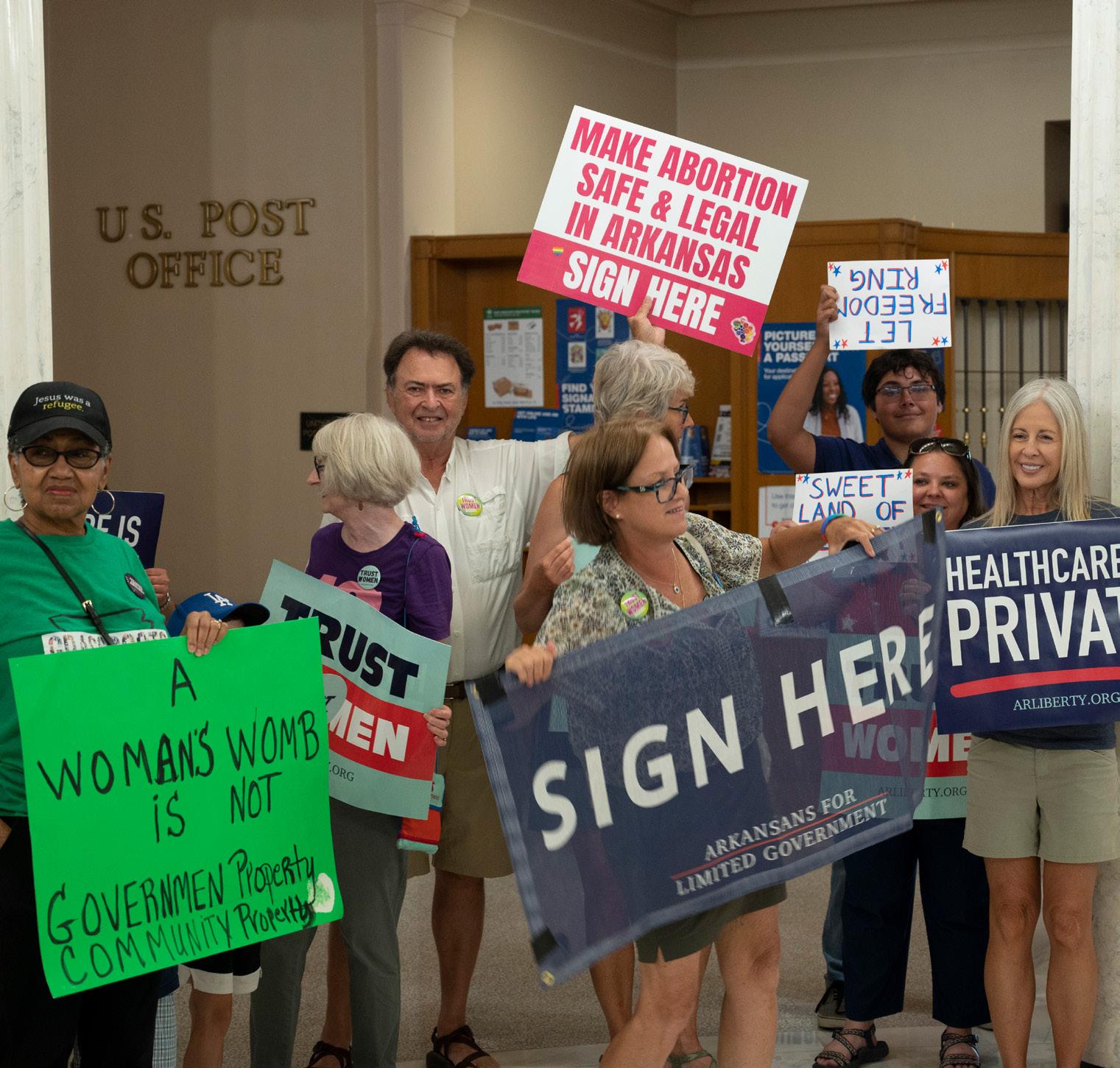
YOU BETTER WORK: The state-spanning sorority of signature collectors hustled through their July 4 holiday (above), then turned up at the state Capitol July 5 to celebrate. Sebastian County volunteer Kellie Cobb (holding the “SIGN HERE” banner) said she and fellow reproductive rights advocates had been putting in more than 40 hours a week for months.
University of Arkansas’s annual measure of public opinion, only about 14% of voters support a total ban on abortion, while 21% said it should be legal under any circumstances. The vast majority, 58%, said it depends.
“The bottom line is that our policy — effectively a total ban — is far from the expressed preference of voters,” UA professor and pollster Janine Parry told the Arkansas Times earlier this year.
As such, crafters of the Arkansas Abortion Amendment measured, weighed, tweaked and formulated a proposed amendment specifically tailored to fit the state. The proposed language aims to balance Arkansas voters’ don’t-tell-me-what-to-do attitude with their conservative social predilections. The result was a state constitutional amendment to enshrine access to abortion through 18 weeks after fertilization, and in cases of rape, incest, fatal fetal anomaly and when the health of the mother is endangered.
As with all solid compromises, this one chafed on both sides. The 18-week cutoff underwhelmed Planned Parenthood, the American Civil Liberties Union and other national groups that could have sent support and significant amounts of cash, but didn’t. They considered Arkansas’s compromise amendment a step backward from protections under Roe v. Wade, and therefore not worth it.
At the same time, the usual pro-life suspects homed in on a lack of gestational age limits for abortions in cases of rape, incest, fatal fetal anomaly or to save a mother’s health as evidence that the amendment would spawn a wave of late-term abortions.
Rightwing extremist state Rep. Mary Bentley (R-Perryville) joined a scrum of hardline anti-abortion activists pushing fables of women killing their babies months or years after birth. At her most hyperbolic, she recently shared a tweet from an account with the handle “Dumfukdetector” of a clip from “Twilight” in which Dakota Fanning’s character chucks a toddler into a raging bonfire. “This is the evil we are dealing with!” Bentley wrote. “We can take care of women in crisis, there is no reason to kill babies. #RightToLife”
Former state Sen. Jason Rapert, infamous for trying to require fetal heartbeat checks via vaginal probe for Arkansans seeking abortion care before Roe v. Wade fell, issued a sarcastic blessing of hearts after Thurston rejected the petition on July 10. “Wouldn’t you hate to be the person responsible for screwing up approval of an alleged 100,000 person petition gathering operation?” he said on Twitter. “Well, when you actually think killing babies is compassionate I guess you aren’t really a rational thinker anyway.”
A hundreds-strong coalition of doctors and other medical providers offered a very different perspective. The current ban blocks

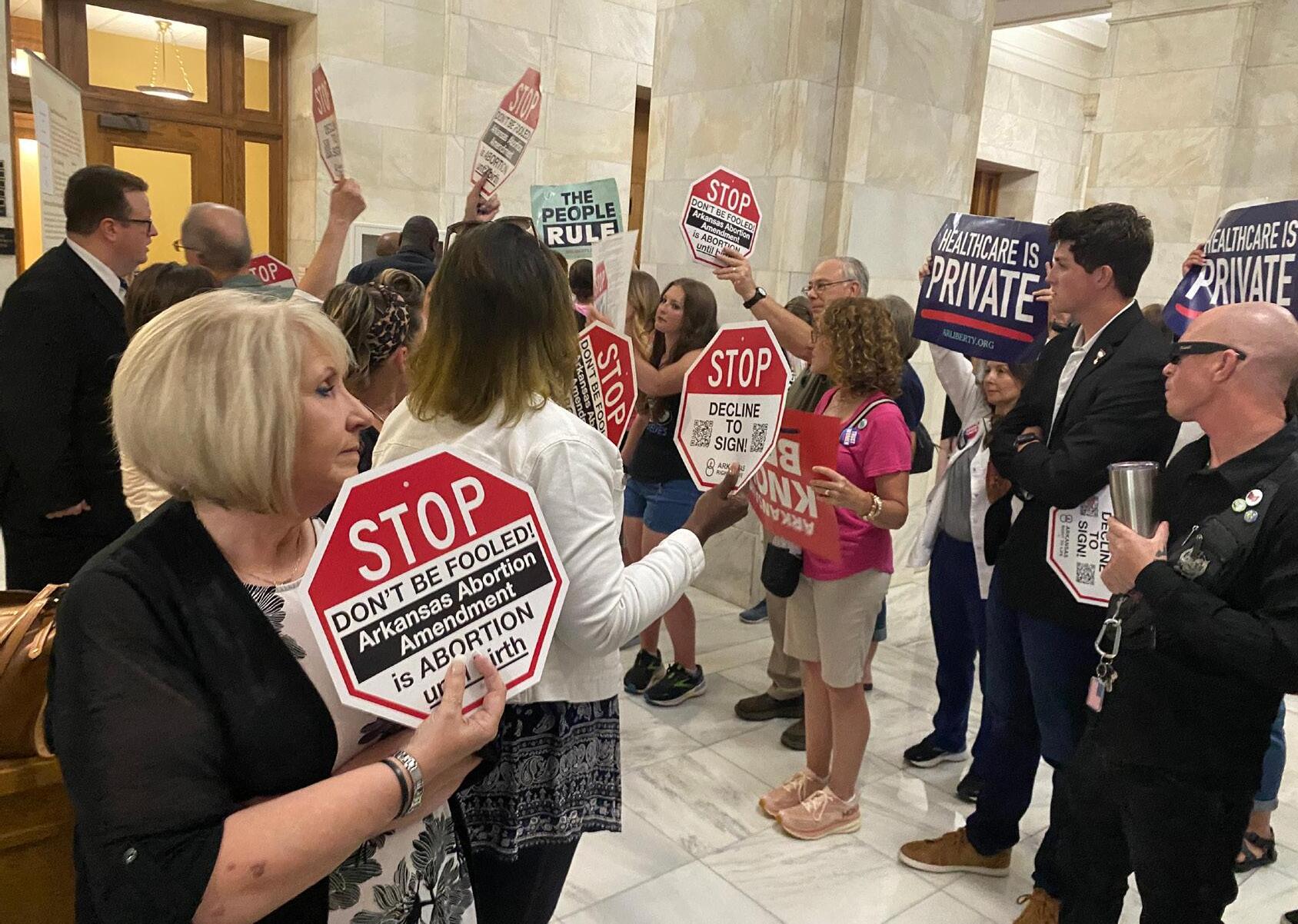
“ WE JUST WANT TO TAKE CARE OF WOMEN. WE WANT TO BE ABLE TO CARE FOR THEM BEFORE THEY GET CRITICALLY ILL. AND WE DON’T WANT TO BE AFRAID FOR OUR MEDICAL LICENSES.” —DR. JILL MHYRE
doctors from intervening until women are literally on their deathbeds. And unclear language in existing law means that even then, doctors who step in to provide abortion care are scared they’re breaking the law, a misstep that could cost them their medical license and up to $100,000 in fines.
Dr. Jill Mhyre, an obstetric anesthesiologist and one of the white coats who celebrated at the Capitol July 5, said she’s tired of having to witness unnecessary suffering and withhold relief until death is imminent. “We just want to take care of women. We want to be able to care for them before they get critically ill. And we don’t want to be afraid for our medical licenses,” she said.
Plenty of Arkansans agreed. Most of the 102K-plus signatures came courtesy of a volunteer team. Arkansans for Limited Government trained roughly 800 volunteers on legalities and best practices for canvassing. About 350 of them did most of the heavy lifting in the field, although many of the sleepers shot back into action in the final weeks.
And while Arkansas abortion rights supporters missed out on the big institutional funding that helped clinch victories for similar efforts in other states, Arkansans for Limited Government had collected $409,082 in donations as of June 30, enough to hire the paid canvassers who secured signatures in some of the farther-flung counties without volunteers on the ground.
It turned out to be a mixed blessing. Without paid canvassers’ 14,000 signatures, Arkansans for Limited Government would have fallen short of the all-important 90,704 threshold. At the same time, questions over paperwork regarding paid canvassers are at the center of the ongoing legal ruckus.
Battles as bitter and seemingly unwinnable as the current fight over abortion rights in Arkansas have been won before.
In 2022, Kansas voters rejected an anti-abortion constitutional amendment referred by their conservative state Legislature by an 18-point margin, 59-41. Kentucky voters said no to a similar measure later that same year. And last year in Ohio, voters decisively approved a constitutional amendment to protect the right to an abortion up to viability.
This November, initiatives to restore or constitutionally protect abortion access are expected to be on the ballot in Arizona, Colorado, Florida, Maryland, Missouri, Montana, Nebraska, Nevada, South Dakota and (maybe) Arkansas. Some are blue or purple states that already allow abortion, but others are deeply conservative states that happen to have a process for citizens to initiate ballot measures.
Missouri and South Dakota ban abortion
in almost all cases; Florida prohibits it after six weeks. Those states, along with Arkansas, are the new front lines in the post-Dobbs fight for reproductive rights.
Having a direct democracy process on paper, though, doesn’t mean voters can necessarily access it. In Arkansas, where conservatives monopolize all three branches of government, the deck is stacked against organizers.
Lawmakers have set up a “Squid Game”-level obstacle course that ballot hopefuls must try to navigate. From 2013 to present, the Arkansas Legislature has passed 12 laws changing the initiative process, nearly all of which were designed to make things more difficult and tedious under the guise of “preventing fraud.” The latest roadblock is a new law passed by the Legislature last year requiring petitioners to collect signatures from a certain number of voters in at least 50 of Arkansas’s 75 counties, rather than the 15-county requirement laid out in the state constitution.
Meanwhile, Thurston, Griffin and other executive branch officials play referee, calling fouls they say are fatal to the effort. Conservative courts affirm it all.
This year, several other progressive ballot initiatives fell short of signatures for the November ballot, while two proposals backed by big casino and marijuana money managed to reach the threshold (see sidebar). But even those well-funded initiatives could still be disqualified between now and November.
“National groups are hesitant to help fund ballot initiative campaigns here because they say Arkansas is ‘direct democracy in name only,’” said Arkansas Public Policy Panel Executive Director Bill Kopsky, who helped lead this year’s unsuccessful push for the Arkansas Educational Rights Amendment. “They don’t want to spend a couple million dollars, then watch as a group undertakes a massive effort, collects all the signatures — only to have the court throw it off the ballot for some random reason.”
That nightmare scenario has happened before. In 2020, an effort to establish a gerrymander-busting bipartisan redistricting process attracted twice the number of signatures required to get on the ballot, but was tossed out of the running by the state Supreme Court on the thinnest of procedural grounds.
Chris Melody Fields Figueredo, executive director of the national Ballot Initiative Strategy Center, has a bird’s-eye view of direct democracy efforts nationwide, and said the roadblocks in Arkansas aren’t altogether unique.
“As more and more people are turning to ballot measures to move forward issues and policies that communities care about, we have seen an uptick in challenges throughout the process,” she said.
Fields pointed to Ohio, where a cohort of
In addition to the abortion rights amendment, there were five other groups trying to place measures on the November 2024 ballot via the initiative process. Groups pursuing a constitutional amendment needed to gather 90,704 signatures by July 5, or 10% of the votes cast in the last gubernatorial election. Sponsors of initiated acts needed 72,563 signatures, or 8% of the same figure. Groups also had to gather a certain number of signatures from at least 50 of Arkansas’s 75 counties (though that provision is being challenged in court on the basis that the constitution requires only 15 counties). Here is a brief summary of the other measures, the groups formed to sponsor them and how the various groups fared in their signature gathering:
The most successful of all of the direct democracy attempts was Local Voters in Charge’s proposed amendment to revoke the existing casino license in Pope County and require local voter approval before casino licenses could be issued in the future. It’s the latest chapter in a bitter dispute between well-heeled casino interests backed by rival tribes in Oklahoma, the Cherokee and the Choctaw. The group Local Voters in Charge, which raised nearly $2.5 million for their campaign, submitted more than 162,000 signatures and said it met the signature threshold in all 75 Arkansas counties.
If the casino effort was the most successful initiative in 2024, the push to expand medical marijuana access in Arkansas was a close second. The measure’s sponsor, Arkansans for Patient Access, submitted more than 111,000 signatures to get the Arkansas Medical Marijuana Amendment on the ballot, and met the required 50-county threshold as well. The amendment would allow pharmacists and nurse practitioners to certify patients for the medical marijuana program, eliminate the $50 charge for patient cards, extend the life of cards from one year to three, eliminate the prohibition on dispensary sales of pre-rolled joints and allow patients to grow some plants of their own.
For AR Kids hoped to get the Arkansas Educational Rights Amendment on the ballot, which would have held private schools that accepted voucher funding to the same educational standards as public schools. It also would have guaranteed voluntary pre-K, aftercare and summer programs for all students, as well as additional services for students with disabilities and low-income students. They reported being about 31,000 signatures short as of the deadline and did not submit the signatures to the secretary of state’s office.
Following Gov. Sarah Sanders’ use of a special legislative session last September to try to water down the state’s Freedom of Information Act, a bipartisan group formed Arkansas Citizens for Transparency to enshrine the transparency law in the state constitution. They aimed to undo some of the changes Sanders made last year and prevent the state Legislature from making future changes to the FOIA. According to the group, they fell “just short” of the number of signatures needed, though they met the threshold in 50 counties. They said they chose not to submit the signatures to save the secretary of state’s office “unnecessary work.”
Along with the proposed amendment, Arkansas Citizens for Transparency also hoped to get an initiated act on the ballot. A separate act was necessary for procedural reasons because the group needed to avoid making statutory references to the existing Freedom of Information Act law within the proposed amendment. The act would have provided definitions and clarified/amended the statutory framework for the FOIA. Organizers reported falling short of the 72,563 signatures required for this measure to be on the ballot, and they chose not to submit the signatures gathered.
The Arkansas Period Poverty Project sought an initiated act that would have eliminated sales taxes on feminine hygiene products and diapers, known colloquially as a “pink tax.” They gathered and submitted just under 44,000 signatures, roughly 29,000 short of what they needed, and qualified in only 19 counties, failing to make the November ballot.
“I DON’T WANT TO SEEM JADED, BUT NOBODY EXPECTED SARAH [SANDERS] TO MAKE IT EASY.”
—VOLUNTEER KELLIE COBB
conservative state lawmakers made an unprecedented last-minute play to strip the courts of jurisdiction over the abortion rights amendment approved by voters in 2023 and give that power to the Ohio Legislature instead.
“This is what we are seeing more and more. It’s tied to the rise of authoritarianism across the country, where people who are elected to office are going out of the way to undermine the power of the people,” she said.
A couple of weeks after that triumphant July 5 at the Arkansas Capitol, Kellie Cobb said she’s settling back into normal life. She dedicated 40-50 hours a week for months on end to the Arkansas Abortion Amendment effort, she said. Since Thurston’s unilateral decision July 10, Cobb has been following all the legal twists and turns and trying to manage expectations.
“I think we were all a little disappointed, but I’m not completely surprised,” she said. “I don’t want to seem jaded, but no one expected Sarah [Sanders] to make it easy.”
Cobb said she’s proud of volunteers’ efforts and certain they will rally to do it all over again if they have to. But they’re not giving up on this round yet.
In the face of ongoing obstruction from the state, organizers with Arkansans for Limited Government vowed to fight on.
Thurston’s actions “have thwarted the will of the people,” they said in a court filing July 22. “AFLG is a grassroots group, with hundreds of volunteers collecting the vast majority of the 101,525 signatures submitted for the Amendment. Petitioners, and the people they represent, exemplify the very spirit of the initiative process the Constitution protects.”

BY BEAU WILCOX PHOTOGRAPHY BY ARKANSAS ATHLETICS

Twoshort years ago, I wrote a cover story about the great fortunes that had enveloped the University of Arkansas Razorback athletic program in 2021-22. Baseball and basketball carried the torch, and football had been revived from the dead.
Two short years later, I’m apologizing for putting that hex out there, but also trying to see the sun through the recent cloud cover. Despite obstacles that befell the high-revenue sports, there’s reason for optimism, thanks to a couple of key personnel changes and a renewed influx of top-tier talent in most of the sports that have been teetering.
As much as anyone else in or around Fayetteville lately, Razorback football coach Sam Pittman, ironically, symbolizes all of the dashed and renewed hopes of Arkansas athletics for the academic year ahead.
He’s still the same gregarious, eminently likable Sam — the guy who disarmed a lot of us with charm and energy on his hiring in 2019 — but obviously there are a few seasons of wear showing now. He’s also, as much as anyone else in major college football, trying like hell to be around for 2025.
It was in that spirit that Pittman chose to face the ubiquitous cadre of reporters last week. SEC Media Days are always a godforsaken spectacle, and especially so in this new era of expanded, geographically mismatched super-leagues.
Pittman could’ve resorted to his frustrating pattern at the end of a lost 2023 campaign, where he alternately bristled at questions about his future and lamented his own lack of direction — often in the same press conference.
Instead, he’s leading the narrative on how other Arkansas coaches, staffers and athletes will take on 2024-25. After an often miserable 2023-24 athletic season, someone has to rework the selling points.
“If we can take 4-20 to 9-4,” Pittman said, recalling the abject two-year disaster he inherited from Chad Morris, “we can deal with 4-8, too, and that’s what we’re going to do.”
And, perhaps most importantly, he’s all smiles again. I’ll take that as a good sign.
FROM ‘NIL’ TO ‘nil’ AND BACK
For the Razorback program to fully, globally recover from a forgettable past several months, this summer had to signal changes
on the monetary side of things.
Arkansas has never been able to rely upon financial resources from within, so saith Captain Obvious. But as oversimplified as it sounds, for a brief moment in the summer of 2021, the Razorback football program seemed to have unique momentum.
When the U.S. Supreme Court sanctified the rights of amateur athletes to profit from their name, image and likeness, Arkansas stood a better chance to compete against heavier hitters. It would’ve also appeared that the momentum of a 9-4 season in the fall of that year, when the Hogs battled like hell in every game and ended up winning a New Year’s Day bowl, broadened the program’s appeal.
And it did, as LSU stalwarts Dwight “Nudie” McGlothern and Landon Jackson came in, along with some other key transfers and higher-tier recruits. But behind it all, the Hogs had to reckon with the fact that everyone else was at least on the same footing already.
I’ve suggested in prior blog posts for arktimes.com that UA Athletic Director Hunter Yurachek and his staff didn’t get the needed gusto for the Arkansas Edge collective (the official pool of NIL funds supporting UA athletes) out there soon enough. To be honest, that program wasn’t really promoted heavily until 2023, and by then there were already concerns mounting that it wouldn’t have the ability to remain on pace with other Joneses in the region.
It wasn’t shortsightedness or negligence on anyone’s part. The ushering in of NIL and the broad reach of the transfer portal unfolded rather quickly — and after decades of fans’ lamenting that the moneyed Arkansans couldn’t play a legal role in helping fund the ever-growing monster of an athletic program.
Speaking of that, it’s why 2023-24 ended up so disappointing across the major programs on the hill. Arkansas was the 20th-ranked revenue generator among collegiate athletic programs according to USA Today’s 2022-23 analysis. And there’s no question that while fellow SEC programs represented 10 of the 19 above the Hogs’ $152 million, Arkansas isn’t sitting too far behind numerous other competitive programs.
Yes, I used the “c” word: “competitive.” Arkansas generally wasn’t, when it came to football, bottoming out with some listless defeats against Auburn, Mississippi State and Missouri. Quarterback KJ Jefferson and

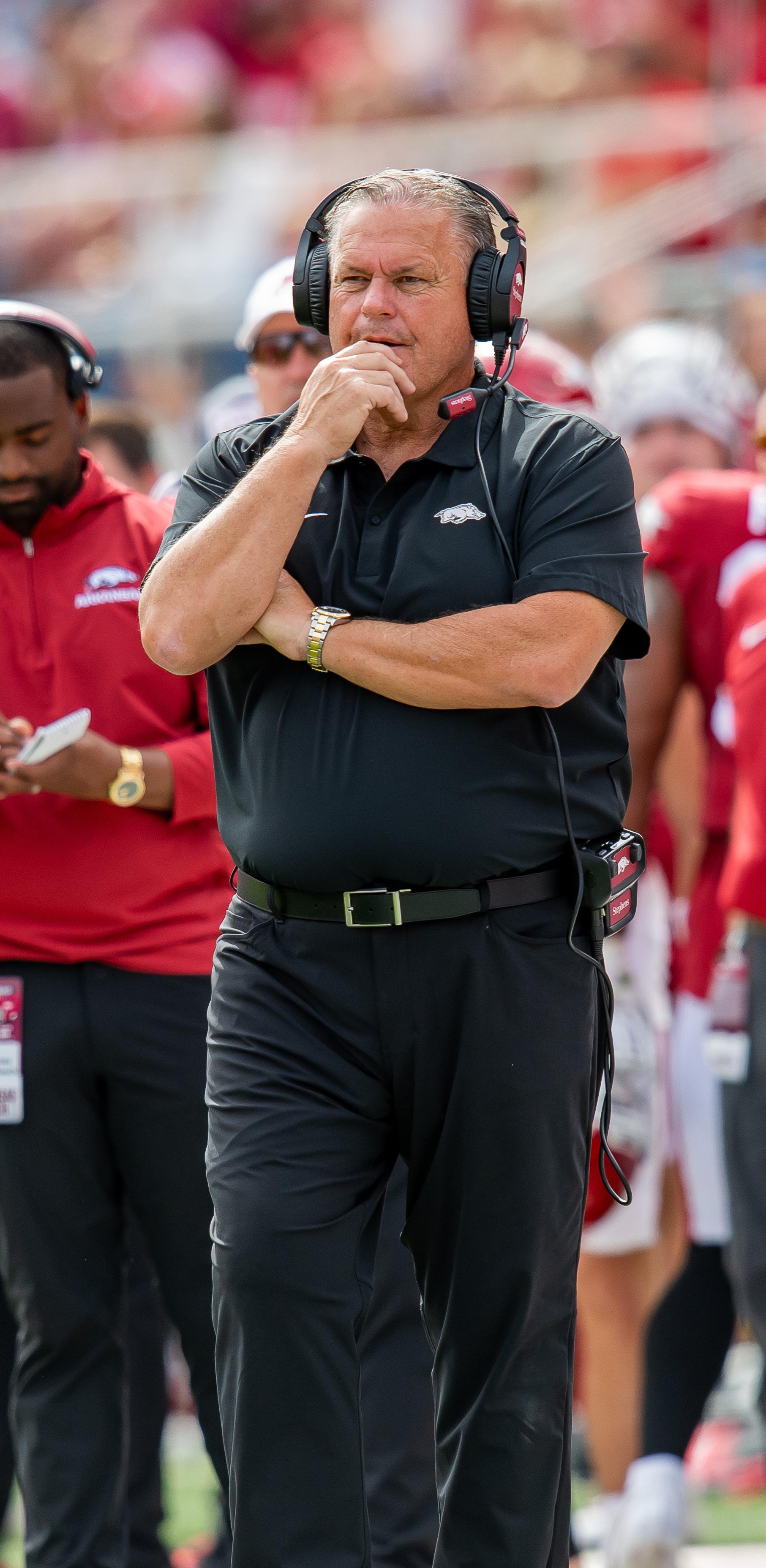


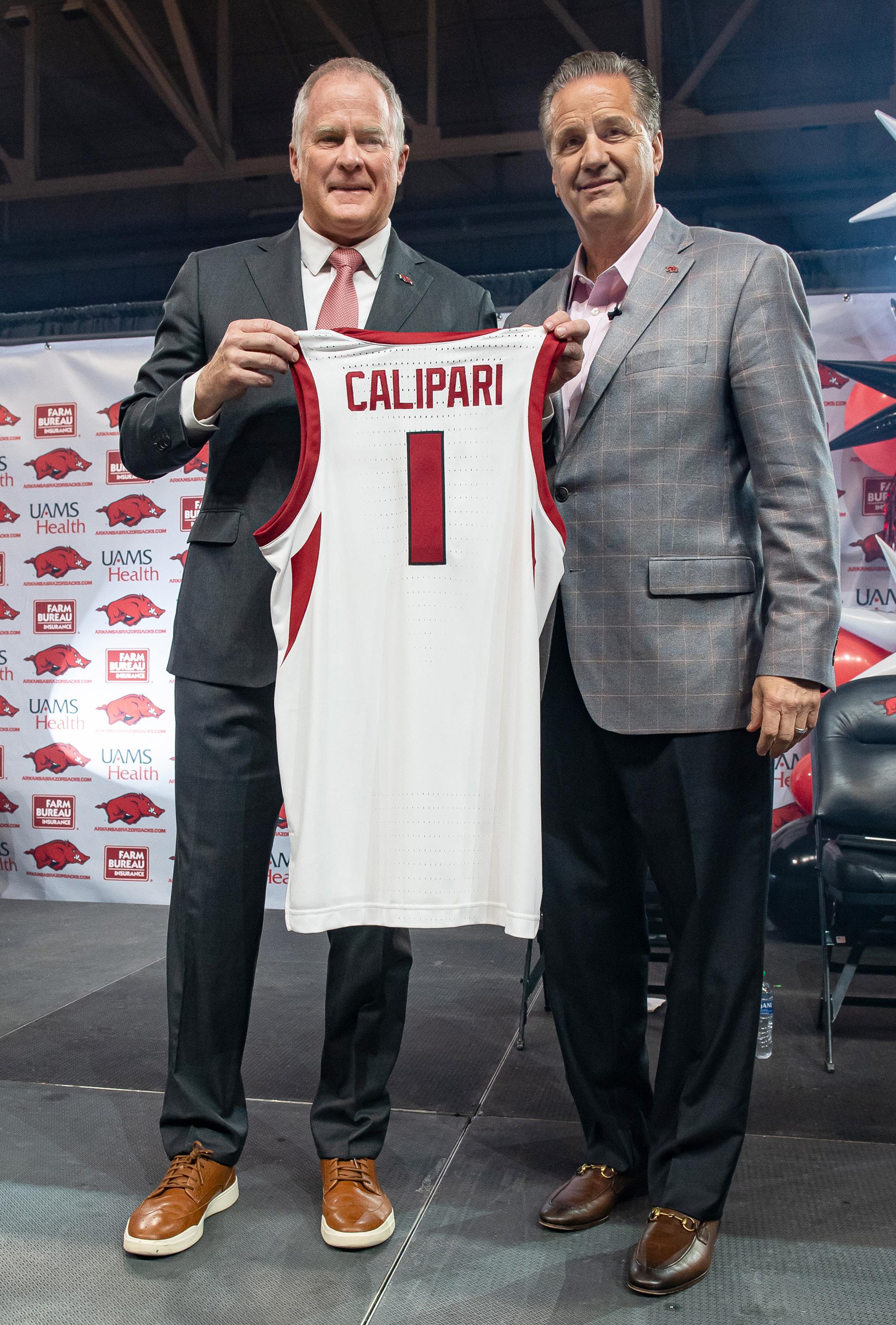
running back Raheim “Rocket” Sanders, largely beloved for three years, became the lightning rods for Razorback fan animus; the former’s social media suggested he threw a lot of his NIL money on various toys, while the latter appeared out of shape and proved injury-prone as a result. They left for Central Florida and South Carolina, respectively, and linebacker Chris “Pooh” Paul Jr. took off for Ole Miss. The offseason wasn’t entirely pretty.
It somehow got worse on the basketball court, too.
Eric Musselman is presumably no longer the Razorback coach because 2023-24 played out in a very ugly way. An early, shocking loss to UNC-Greensboro at home set in motion a rather complete disintegration. Much as the football team did, the basketballers looked frustrated and disengaged most of the year. They flopped to a sub-.500 record and Musselman, not long after the season ended, found a safer haven for him and his family in Southern California.
That was a stunning sequence of events, and it overshadowed a lot of dissension and strain in the women’s program, too. The affable Mike Neighbors also showed resignation and lost his surefootedness as both a game manager and “players’ coach.” Almost all of the Hogs’ top producers —including Saylor Poffenbarger (Maryland), Maryam Dauda (South Carolina) and Samara Spencer (Tennessee) — elected to leave. After a couple of underwhelming years, Neighbors finds himself in a similar position as Pittman going into 2024-25: win and you’re in, lose and it’s curtains.
The last hope for salvation of the rough ride for many fans rested on the diamonds at Bogle Park and Baum-Walker Stadium. Softball and baseball, both thriving still despite disappointing conclusions to the prior seasons, started off strongly.
And Courtney Deifel and Dave Van Horn both guided their teams to accomplished regular seasons. Pitcher Hagen Smith was electric all season for the baseball team and was a finalist for the Golden Spikes Award for college player of the year; on the softball side, Bri Ellis, Reagan Johnson and Morgan Leinstock made the All-SEC first team.
Then Memorial Day came around, and again, both teams looked like they had peaked in April. Smith’s only truly bad start of the year, naturally, occurred in the Fayetteville Regional when he got knocked around by Kansas State. And that essentially ended the Hogs’ season far short of expectations again. Deifel’s team also got bounced from a home regional when the bats fell silent.
Against that NIL backdrop, the whole year
of Razorback sports largely appeared messy. Musselman’s exit was especially vexing and upsetting to a lot of Hog fans who felt he had been worthy of more assurances from Yurachek after the season. All the noise around the portal didn’t help, since most of it related to talented players who understandably wanted to use their skills elsewhere. And there were persistent rumors that Arkansas was way, way behind on the fiscal side of things.
Arkansas’s offense was so disjointed last fall that Pittman had no choice but to dismiss Dan Enos after week 8, following an ill-fated experiment as offensive coordinator. The offensive line was historically terrible, and Jefferson and Sanders never synced with each other or the rest of the unit at all.
So, how to fix the 69th-rated offense in the nation for 2024? Well, when Texas A&M sent Jimbo Fisher packing for an ungodly sum, somebody became available again.
That “somebody” was obviously A&M’s offensive coordinator Bobby Petrino, and the Pearls column spent a lot of time over the years dogging the former Razorback honcho for his nomadic, mercurial ways. But Petrino’s sole season as Fisher’s offensive coordinator wasn’t bad at all, and his offense generated almost 25% more yardage than Arkansas’s downtrodden unit.
Mostly, though, Petrino got this chance because Pittman desperately needed a splashy hire. It recalled the 2005 offseason when Houston Nutt, prone after consecutive 5-6 and 4-7 seasons back-to-back, begrudgingly handed over play-calling duties to high-octane high school coach Gus Malzahn, who brought five high school stars with him. That generated a lot of excitement quickly, and even though the “Springdale Five” experiment fizzled spectacularly, it also boosted team morale and the Hogs promptly went 10-4 and won the SEC West outright for the first time ever.
Does Petrino’s return, celebrated in late November as a redemption story, bring something new to the table? Hard to say. My jaded view is that his best days as a coach are behind him, but I also respect that he has greatly endeared himself to me as a person. He’s done the atonement tour properly, frankly, and took the coordinator position graciously.
That was hardly the most nervous period of the year, as it turned out. When Musselman made his decision to bolt, the ensuing coaching “search” looked more like a scramble. Arkansas was going to aim for some unrealistic candidates, or at least social media projected it that way. For a couple of days in April,
Arkansas basketball looked like the football team did when Morris finished his wrecking ball routine. There were no coaches, no players and no real prospects for the upcoming campaign as a result.
Then, on a nice Sunday afternoon, the news broke that Yurachek stood on the verge of hiring Kentucky coach John Calipari, long reviled here and definitely not someone who
It sure wasn't how anyone scripted it, but Bobby Petrino and John Calipari are now Arkansas state employees, and the psychological impact of those hirings is already significant.
endeared himself to this author. How in the hell did THAT happen?
Simply put, the coffers opened, and that’s the primary reason the outlook got rosier overnight. Calipari’s postseason shortfalls in recent years aggravated fickle UK Wildcat fans, and he saw an opportunity to leave with dignity and grace. He took it, and I respected that as much as anything.
Tyson Foods’ chairman John H. Tyson and
his relationship with Calipari meant everything in this context, but it proved that Arkansas could be audacious, risky, creative and competent. Yurachek and Tyson sat down with Calipari, made the sales pitch they maybe weren’t expecting to make, and it worked.
All the Hog animus toward Calipari faded rather quickly. Many criticized the compensation he secured ($7 million, plus annual retention payments of $500,000), but nowadays, butts in seats matter more than anything, and he will keep Musselman’s momentum on that front and enhance it. If nothing else, Calipari consistently brings the aura of prestige and swagger to a program.
FROM
It sure wasn’t how anyone scripted it, but Bobby Petrino and John Calipari are now Arkansas state employees, and the psychological impact of those hirings is already significant. Pittman’s energy feels new.
“I want to win. I don’t care about all the rest of it,” Pittman said at Media Days when the subject of Petrino potentially succeeding him was broached. “This has never ever, ever been about me. I’m grateful to be the head coach at Arkansas, and I’m trying to make the people of the state of Arkansas, the team and the staff proud to be a part of the program.”
It’s that kind of genuine affection for the state that made Pittman earn genuine affection in return, and even if some of that goodwill is gone, he is adopting the right attitude — and, slowly, the recruiting outlook has changed for the better. As for Petrino and Calipari, they have both said and done all the right things since donning red and white.
“I know this will be a little different for a lot of people,” Petrino said at his hiring, “but I’m grateful to Coach Pittman for giving me this chance and looking forward to getting my feet on the ground, walking into the facility and seeing everybody. It’s time to get it cranked up.”
That last burst of enthusiasm is what keeps me afloat right now. It will all still come down to the performance of young people, of course. Everyone’s eager to see the talent that Calipari ported from Lexington and beyond — and to get behind the rebuilt basketball, baseball, softball and other programs that continually make the state proud (golf, gymnastics and soccer, to name three excelling ones). And track and field will always remain an elite staple.
Let’s see how 2024-25 goes. WPS.
This Pearls is dedicated to eternal Hog optimist and zealot Yancey Prosser. May he rest well, for he lived well.


with Nichole Niemann





• University Transfer Curriculum
• Nursing
• Emergency Medical Technician
• Health Information Technology
• Cybersecurity
• Entrepreneurship
• Business
• Airframe and Powerplant Technology
• Culinary Arts
• Welding
• Automotive Technology
• HVAC-R
• Advanced Manufacturing
• Diesel Technology
• CDL Training
• Continuing Education
• Specialized Training for Business and Industry
• Many More!




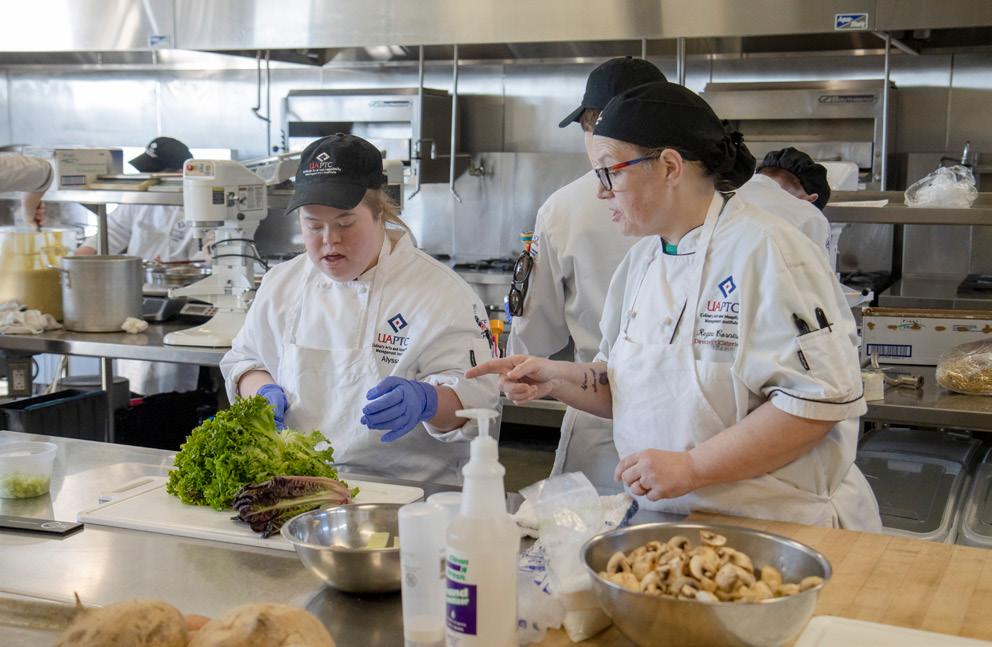


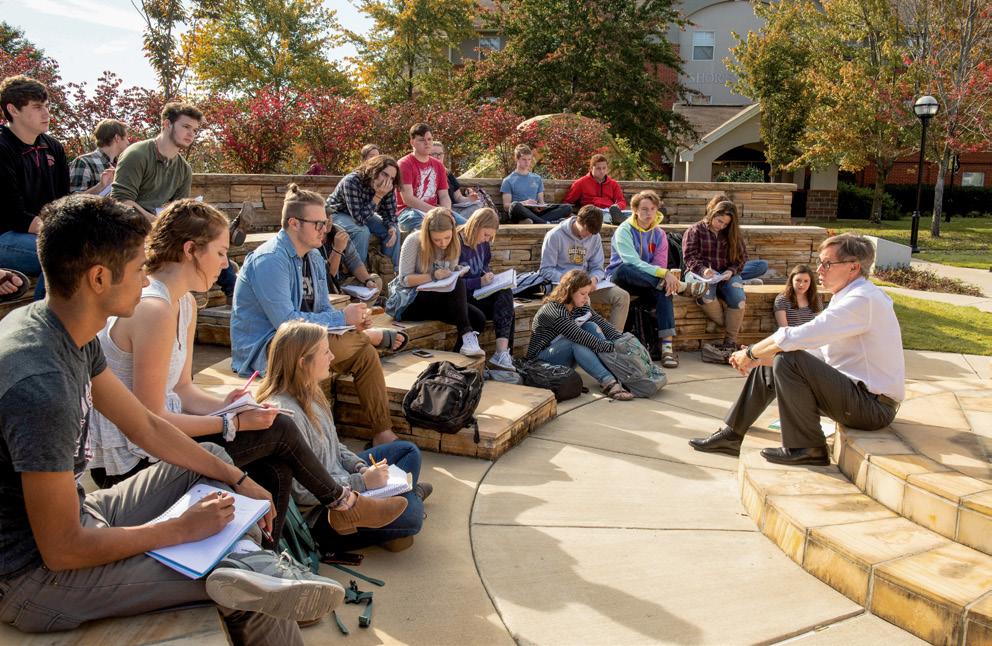

PUBLISHER Alan Leveritt
COLLEGE GUIDE EDITOR Becca Bona
CONTRIBUTING WRITERS
Kelli Reep
Caleb Patton
CREATIVE DIRECTOR
Mandy Keener
GRAPHIC DESIGNER
Katie Hassell
DIRECTOR
Brooke Wallace
ACCOUNT EXECUTIVES
Terrell Jacob
Kaitlyn Looney
Evan Ethridge
ADVERTISING TRAFFIC MANAGER
Roland R. Gladden
DIGITAL MARKETING MANAGER
Madeline Chosich
DIRECTOR OF DEVELOPMENT
Wythe Walker
ADVERTISING ART DIRECTOR
Mike Spain
EVENTS DIRECTOR
Donavan Suitt IT DIRECTOR
Robert Curfman
CIRCULATION DIRECTOR
Jackson Gladden CONTROLLER
Weldon Wilson
BILLING/COLLECTIONS
Charlotte Key
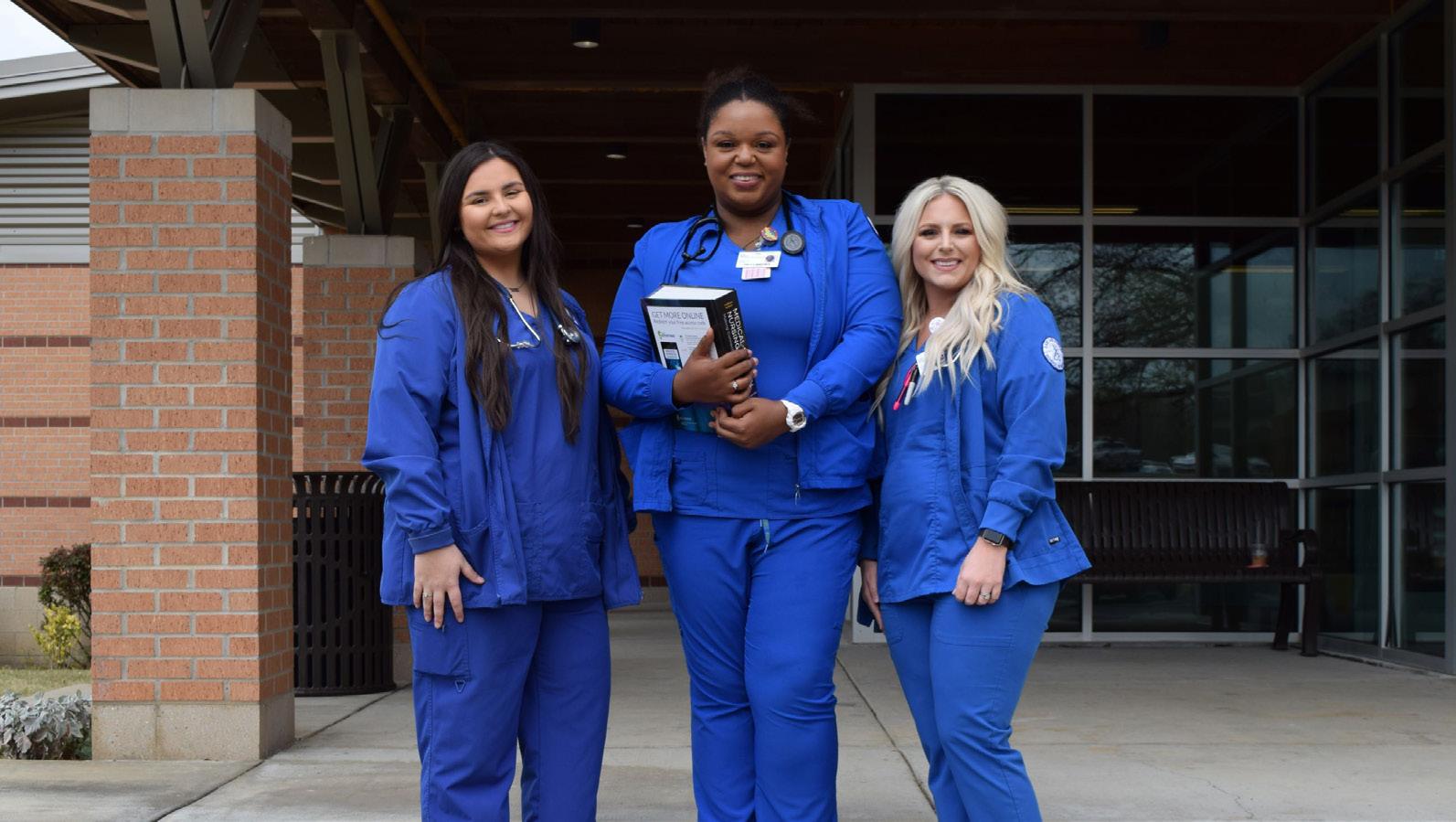



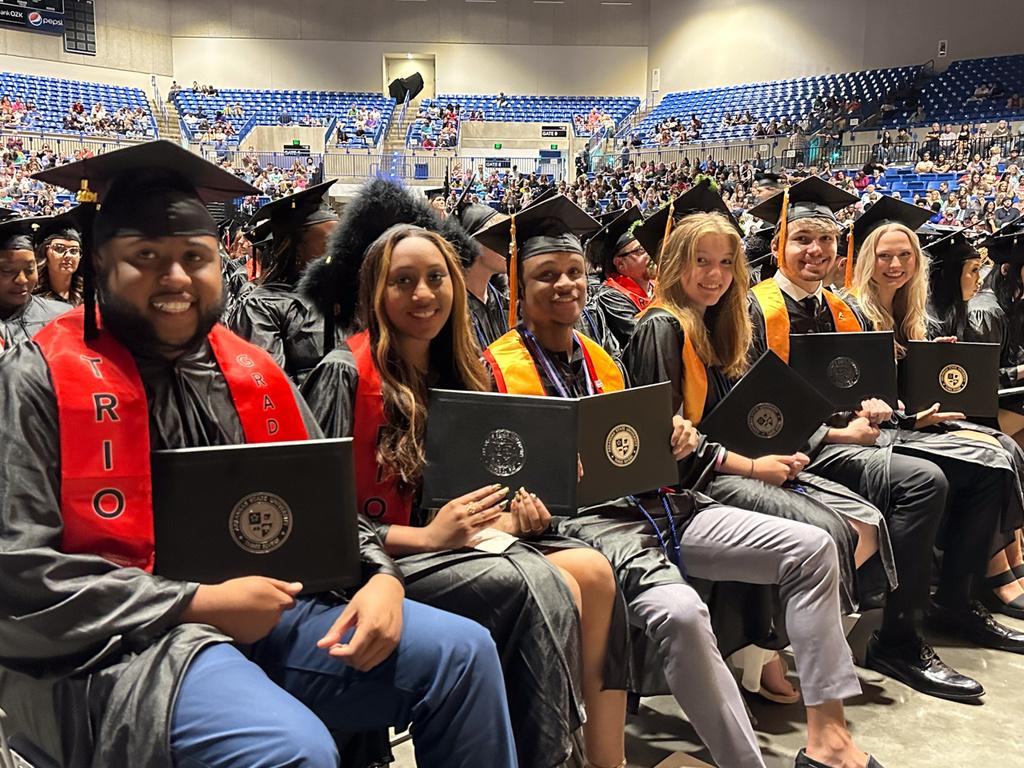

In a post-COVID world riddled with what at least feels like a stagnant economy, many are questioning the decision to go to college. Here are a few things to consider about why finding your dream college can still be a relevant use of time, money and energy:
According to Pew Research, individuals with a college degree earn significantly more over their lifetime than those with only a high school diploma. The earnings gap is substantial, with bachelor’s degree holders earning, on average, $900,000 more over their careers. This increased earning potential can provide greater financial stability and personal and professional growth opportunities.
Similarly, a recent Forbes article notes that college graduates have lower unemployment rates. A degree often opens doors to more job opportunities, including positions less vulnerable to economic downturns. Employers frequently seek candidates with specialized knowledge and skills acquired through higher education, making degree holders more competitive in the job market.
Beyond financial benefits, a college education fos ters personal development. The Pew Research report notes that college graduates report higher levels of job satisfaction. The college experience enhances critical thinking, communication skills and the ability to navigate complex environments, contributing to personal fulfillment and resilience.
Attending college provides more than learning experiences. It can also provide valuable networking opportunities. According to Forbes, relationships built during college with peers, professors and professionals can lead to job opportunities, mentorship and collaborations.
Pew Research indicates that college graduates tend to have better health outcomes and access to health care. Education often correlates with healthier lifestyles and greater awareness of health resources, leading to improved overall well-being.


Sources: Pew Research Center, Forbes Advisors


College-educated individuals are more likely to engage in community service and civic activities. They contribute positively to society by voting, volunteering and supporting local initiatives, fostering a more informed and active citizenry.
If you’re unsure about a traditional, four-year college experience, consider the alternative options available. There are also apprenticeship programs and associate degrees that might suit your needs, especially when considering your financial options, aid and scholarships. Many respectable jobs don’t require bachelor’s degrees, and learning isn’t relegated solely to the classroom — you can always earn lived experiences.


Either way, it’s never too early to plan your next steps in your education journey, whatever that looks like.














The Free Application for Federal Student Aid (FAFSA) rolled out changes in 2023. The updated form is meant to be easier for incoming college students to navigate. Here’s a rundown of what to expect:
The form has been streamlined to make it easier and quicker to complete. This change is particularly beneficial for first-time applicants who find the process overwhelming. The new FAFSA requires fewer questions, many of which can be automatically filled out using the IRS Data Retrieval Tool. This tool pulls tax information directly from the IRS, reducing errors and saving time.
The FAFSA is more accessible now than ever, thanks to the new mobile-friendly design. You can complete the form on your smartphone or tablet, making it convenient to apply from anywhere.
Changes in the FAFSA also mean expanded eligibility for more students. The new form aims to be more inclusive, ensuring that students from diverse backgrounds have a better chance of qualifying for financial aid. This includes increased access to Pell Grants, which do not need to be repaid.
To assist with the transition, the Federal Student Aid website provides comprehensive support. This includes step-by-step guides, FAQs and live chat options to help you through the application process. Don’t hesitate to use these resources if you encounter any issues or have questions about specific sections of the form.
It’s crucial to start preparing early. Gather all necessary documents, such as your Social Security number, driver’s license and tax returns. The sooner you complete the FAFSA, the better your chances of receiving financial aid, as some funds are distributed on a firstcome, first-served basis.
Once you’ve submitted your FAFSA, you’ll receive a Student Aid Report (SAR) summarizing the information you provided. Review this carefully to ensure everything is correct. Then, you’ll receive financial aid offers from the colleges you listed on your FAFSA. Compare these offers to see which school provides the best financial package that suits your needs.
Be mindful of deadlines. Missing the FAFSA deadline can significantly reduce your financial aid options. Also, remember to reapply every year you’re in school to continue receiving aid.
The updated FAFSA form is designed to make applying for financial aid more straightforward and accessible. By taking advantage of these changes and available resources, you can confidently navigate the financial aid process and focus on your educational goals.
For more detailed information and support, visit the Federal Student Aid website: studentaid.gov.


These Arkansas scholarships are worth noting. For a comprehensive list specific to your situation and needs, visit the Arkansas Division of Higher Education’s scholarships application management system page. There, you can create a profile, answer questions specific to your scholastic journey, and see which scholarships you might qualify for as you continue your education.
ARKANSAS ACADEMIC CHALLENGE SCHOLARSHIP:
ELIGIBILITY:
This is open to Arkansas residents who are high school seniors or current college students, with different criteria for traditional and nontraditional students.
APPLICATION:
The YOUniversal Scholarship Application, which can be found on the Arkansas Department of Higher Education’s website, must be completed.
FUNDING:
The college offers varying amounts of financial aid based on academic year and performance, with the potential for renewable funding throughout college.
( ArFuture ) GRANT:
PURPOSE:
The ArFuture Grant covers tuition and fees for qualifying certificate and associate degree programs in high-demand fields at Arkansas public institutions.
ELIGIBILITY:
Open to Arkansas residents who enroll in programs that lead to high-demand occupations as determined by the Arkansas Division of Higher Education.
COMMITMENT:
Recipients must complete mentoring and community service hours each semester they receive the grant.
APPLICATION:
Requires completing the FAFSA and the ArFuture application by the specified deadlines.
PURPOSE:
The ARHEG provides financial assistance to Arkansas residents pursuing graduate or professional studies in specific health fields such as chiropractic medicine, dentistry, optometry, osteopathic medicine, podiatric medicine and veterinary medicine to allow them to attend participating out-of-state institutions.
ELIGIBILITY:
This program is open to Arkansas residents enrolling in qualifying health education programs, which address the state’s shortage of health care professionals.
COMMITMENT:
Recipients are required to fulfill specific service obligations upon graduation.
APPLICATION:
Requires submission by the specified deadline, with the grant amount varying by program and institution.

PURPOSE:
The LEO provides financial assistance to dependents of Arkansas law enforcement officers who were killed or permanently disabled in the line of duty, covering tuition and fees at public institutions.
ELIGIBILITY:
Open to dependents who provide proof of their relationship to the officer and the circumstances of the officer’s death or disability.
COMMITMENT:
Recipients must maintain satisfactory academic progress to continue receiving the scholarship.
APPLICATION:
Requires submission of documentation and other required materials by the specified deadline.
PURPOSE:
The MDS provides financial aid to dependents of Arkansas residents who are military personnel killed in action, missing in action or taken as prisoners of war, covering tuition and fees at public institutions.
ELIGIBILITY:
This is open to dependents who can demonstrate their relationship to the service member and provide documentation of their status.
COMMITMENT:
Recipients must maintain satisfactory academic progress to continue receiving the scholarship.
APPLICATION:
Requires submission of documentation and other required materials by the specified deadline.
PURPOSE:
The GHETS supports high school seniors in Arkansas by covering tuition, fees and other educational expenses to bridge the gap between high school and college.
ELIGIBILITY:
Open to Arkansas residents who demonstrate academic achievement, leadership qualities and community involvement.
CURRENT QUALIFYING PROGRAMS INCLUDE:
• “HOWL” at Arkansas State University Jonesboro
• “ACAP” at Southeast Arkansas Community College
• “EMPOWER” at the University of Arkansas
•“3D” at the University of Arkansas-Pulaski Technical College
COMMITMENT:
Recipients must maintain good academic standing and participate in community service activities during their college education.
APPLICATION:
Includes submitting transcripts, recommendation letters and a personal statement by the specified deadlines.
PURPOSE:
The GS Program recognizes academically talented high school seniors in Arkansas and provides significant financial assistance to encourage them to pursue higher education within the state.
ELIGIBILITY:
Open to Arkansas residents who demonstrate exceptional academic achievement and leadership potential, meeting specific academic criteria.
COMMITMENT:
The scholarship is renewable for up to four years, provided recipients maintain the required academic standards.
APPLICATION:
Requires submission by the deadline, with selections based on academic performance, test scores, and extracurricular involvement.

COMPLETE THE FAFSA: Start by filling out the Free Application for Federal Student Aid (FAFSA). It’s required for Arkansas state aid and many other scholarship applications.
RESEARCH SCHOLARSHIPS: Utilize online databases, scholarship search engines, college websites and local community organizations to find scholarships. Avoid services that charge fees for scholarship searches.
COMPLETE APPLICATIONS: Carefully review the application instructions and requirements. Gather necessary documents, such as transcripts, letters of recommendation and essays. Ensure your applications are thorough and accurate.
SUBMIT ON TIME: Track deadlines and submit your applications before due dates to avoid missing opportunities.
FOLLOW-UP: Confirm receipt with scholarship providers after submitting and inquire about the selection timeline. Seek feedback if needed.
UTILIZE FREE RESOURCES: Contact the Arkansas Student Loan Authority College Planning Service for free assistance with FAFSA and exploring funding options.
By following these steps, you can maximize your chances of securing scholarships to help fund your education.
Visit Arkansas Student Loan Authority for more information.
expenses as applicable.
$24,056/year
(in-state, public/private average, based on 2023-2024 academic year costs)
Diverse Degree Offerings: Traditional fouryear college programs typically provide a broad range of degree options across various academic disciplines.
Focus on Academic Fields: Unlike technical or vocational schools, these programs generally do not include trade-specific courses such as welding, plumbing or carpentry.
Four-Year Degree Programs: Primarily offer bachelor’s degrees, which encompass a broader range of academic subjects and theoretical knowledge, preparing students for professional careers or advanced studies.
Four-Year College Amenities: Typically feature a wider range of facilities, including multiple dining halls, advanced recreational centers, extensive libraries, various sports facilities and robust student life activities and organizations.
Source: myAR Dashboard, CollegeTuitionCompare.com/state/arkansas/
14,581/year
(in-state, based on 2023-2024 academic year costs, estimate being off campus)
Career-Focused Education: Two-year college programs and vocational schools primarily emphasize practical, job-ready skills and training.
Credit Transfer Opportunities: Many of these institutions have agreements with four-year colleges, facilitating the transfer of credits for students who wish to pursue a bachelor’s degree.
Two-Year Degree Programs: Typically offer associate degrees, which focus on providing practical, career-oriented skills that prepare students for immediate employment or career advancement.
Two-Year College Amenities: Often limited in scale and scope, focusing primarily on academic facilities. Some may offer basic recreational areas, student centers and dining options, but generally less extensive compared to four-year institutions.
A 529 plan is an excellent choice for saving for college due to its tax advantages and flexibility. These state-sponsored investment accounts allow your contributions to grow tax-deferred, and withdrawals for qualified education expenses are tax-free. This means you won’t pay federal taxes on the earnings as long as they’re used for tuition, fees, books and other eligible costs.
Another advantage is the high contribution limits, allowing families to save significantly more compared to other education savings options. Anyone can contribute to the account, making it a collective effort from family and friends. Lastly, 529 plans offer a variety of investment options tailored to different risk tolerances and time horizons, ensuring that you can find a plan that fits your financial goals. This makes 529 plans a powerful tool for managing the rising costs of education. DID YOU KNOW? IT’S NEVER TOO EARLY TO START SAVING.
Additionally, many states offer tax deductions or credits for contributions to a 529 plan. 529 plans also provide flexibility in how the funds can be used. They can cover a wide range of educational expenses, including college, vocational schools and K-12 tuition. Recent changes even allow up to $10,000 to be used for student loan repayment.
COMPREHENSIVE EDUCATION: Fouryear colleges offer a broader range of courses and a more extensive education, including general education requirements and major-specific classes.
CAMPUS EXPERIENCE: Students benefit from a traditional campus experience, including dorm life, extracurricular activities and networking opportunities.
BETTER CAREER OPPORTUNITIES: Graduates from four-year programs often have better job prospects and higher earning potential.
RESEARCH OPPORTUNITIES: Four-year institutions typically provide more opportunities for undergraduate research and advanced studies.
ALUMNI NETWORKS: Strong alumni networks can provide valuable connections and support in career advancement.
COST-EFFECTIVE: Community colleges generally have lower tuition fees compared to fouryear colleges, helping students save money on their education.
FLEXIBLE SCHEDULING: They often offer flexible class schedules, including evening and weekend classes, which is beneficial for working students or those with other commitments.
SMALLER CLASS SIZES: Community colleges typically have smaller class sizes, allowing for more personalized attention and support from instructors.
LOCAL CONVENIENCE: Many students can attend a community college close to home, saving on housing and transportation costs.
SEAMLESS TRANSFER OPTIONS: Many community colleges have transfer agreements with four-year institutions, making it easier for students to transfer credits and continue their education.
For more details, you can visit Great Value Colleges: www.greatvaluecolleges.net
It’s never too early to delve into financial literacy. As high school students begin to navigate the complexities of financial independence, building credit can be a foundational step. Establishing a good credit history early can significantly ease future financial processes, like applying for student loans, renting an apartment or purchasing a car.
Students can start by becoming authorized users on a parent's credit card, which allows them to benefit from the primary holder's credit history without legal responsibility for charges. This early exposure can provide a practical understanding of credit usage and its impact on credit scores. Additionally, for those who manage part-time jobs, obtaining a secured credit card is a viable option. Secured cards require a cash deposit that serves as the credit line, minimizing risk while still building credit.
It's crucial for students to understand the responsibilities that come with credit, such as making payments on time and understanding the implications of interest rates and fees. Regular monitoring of their credit scores through free annual credit reports can help them track their financial health and correct any discrepancies quickly.
Ultimately, the habits formed in these formative years will pave the way for financial literacy and responsibility in adulthood. Educating high school students about credit not only prepares them for personal financial management, but also instills an appreciation for fiscal discipline and the long-term benefits of a solid credit history.
For more detailed guidance on financial literacy for high school students or young adults, visit First New York Financial Union: blog. firstnewyork.org/financial-literacy-for-high-school-students/.

College can be a time of significant financial strain, but students can use several strategies to save money. Here are a few highlights from Fidelity Investments:
Housing can be one of the most significant expenses for college students. To save money, consider living in a dormitory, which often includes utilities and internet. If dorm life isn’t for you, look for off-campus housing options that allow for splitting costs with roommates. Additionally, if feasible, living at home with parents can eliminate rent expenses altogether.
Your student ID is a powerful tool for saving money. Many businesses offer student discounts on various products and services, including food, clothing, entertainment and technology. Always ask if a student discount is available before making a purchase. Websites like UNiDAYS and Student Beans can also help you find student-specific deals.
Textbooks can be another significant cost. To save money, consider renting textbooks from sites like Chegg or Amazon. Buying used textbooks from campus bookstores, online marketplaces or former students can also reduce costs. Additionally, digital textbooks are often cheaper than physical copies, so explore electronic options.
Balancing work and study can be challenging, but a part-time job can provide valuable income to help cover expenses. Look for on-campus jobs, which are often more flexible with your class schedule. Additionally, consider tutoring, freelance work or gig economy jobs that allow you to work on your own terms.



Colleges offer numerous amenities that students often overlook. Your tuition and fees typically include gyms, health centers, libraries and recreational facilities, so use them instead of paying for external services. You can also participate in free campus events, which can provide entertainment, food and networking opportunities without additional costs.







Filling out the Free Application for Federal Student Aid (FAFSA) is crucial for accessing financial aid. The FAFSA can determine your eligibility for grants, work-study programs and federal student loans. Additionally, seek out private scholarships. Many organizations offer scholarships based on various criteria such as academic achievement, extracurricular involvement, and personal background.
Source: Fidelity



1. BUDGETING AND PLANNING: Creating a budget can help you track your income and expenses, ensuring you live within your means. Use apps like Mint or YNAB to make budgeting easier.
2. USE PUBLIC TRANSPORTATION: If you’re in a city with good public transportation, it can be a cost-effective alternative to owning a car. Many campuses also offer free or discounted transit passes to students.













3. SELL UNNEEDED ITEMS: At the end of each semester, sell textbooks, clothing, or other items you no longer need. Platforms like eBay, Facebook Marketplace, or campus-specific groups can be helpful.
4. BUY IN BULK: Purchasing non-perishable items in bulk can save money in the long run. Share costs with roommates to make it even more economical.
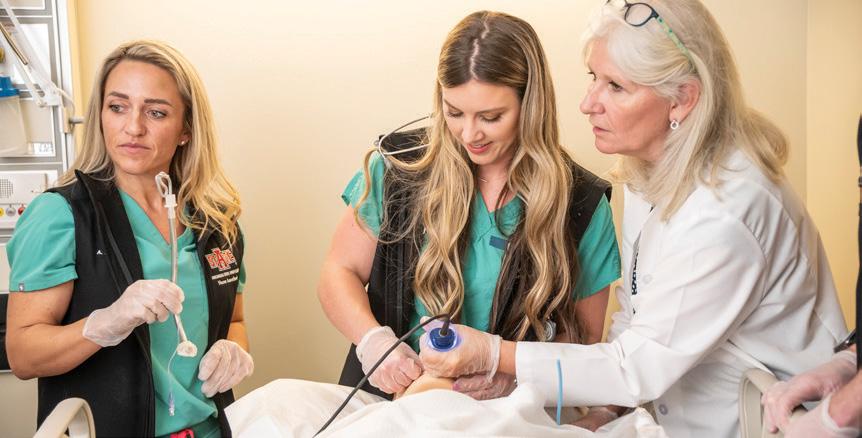


who seek solutions to some of society’s
professional networks, find internships, and


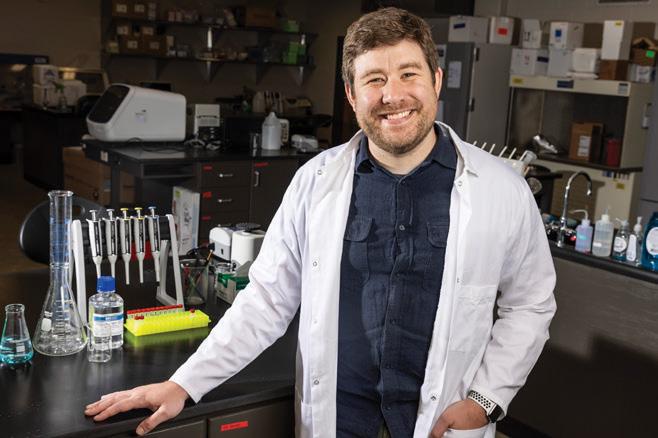



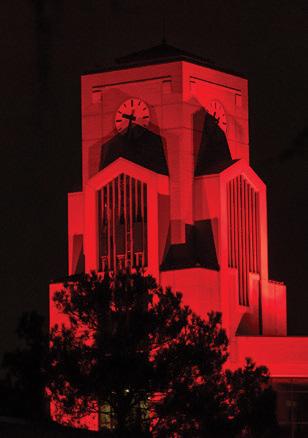
Preparing for college is a multi-year journey that requires careful planning and dedication. By following these guidelines from freshman through senior year, high school students can set themselves up for a successful transition to college life and beyond.
Building a Strong Foundation
Starting high school is an exciting and transformative period. Freshman year sets the stage for your academic and extracurricular journey toward college. Here’s how you can make the most of it:
FOCUS ON ACADEMICS: This is the year to establish solid study habits. Pay close attention to your coursework and aim for high grades in all your subjects. Freshman-year grades are crucial as they form the foundation of your GPA, which colleges will consider during the admissions process. Develop a consistent study schedule and seek help from teachers whenever necessary.
GET INVOLVED: Join clubs, sports teams or other extracurricular activities. These activities allow you to explore your interests, develop new skills and make friends. Whether it’s the drama club, the soccer team or the debate society, participation in extracurriculars will make your high school experience richer and more fulfilling. It also helps you build a resume that stands out to college admissions officers.
PLAN AHEAD: Start thinking about your future goals. Research different career paths and the types of colleges that offer programs in those areas. Attend career days and talk to professionals in fields that interest you. Understanding your potential career interests can help you make informed decisions about the courses you take and the extracurricular activities you pursue.
Sophomore year is the time to build on the foundation you laid as a freshman. Here’s how to enhance your high school experience:
CHALLENGE YOURSELF: Enroll in more challenging courses like honors or Advanced Placement (AP) classes. Taking these rigorous courses demonstrates to colleges that you are capable of handling difficult material. It also helps boost your GPA if you perform well. However, be sure to balance your workload to avoid burnout.
EXPLORE INTERESTS: Continue participating in extracurricular activities, but also look for opportunities to take on leadership roles. Whether it’s becoming a team captain, a club president or organizing an event, leadership experience is highly valued by colleges. It shows that you can take initiative and manage responsibilities effectively.
BUILD RELATIONSHIPS: Establish strong relationships with your teachers, counselors and mentors. These individuals can provide valuable guidance and will be important when you need letters of recommendation for college applications. Be an active participant in class and seek feedback on how you can improve.
Preparing for the Big Leap
Junior year is pivotal in the college preparation process. It’s a time to get serious about standardized tests and start narrowing down your college choices.
STANDARDIZED TESTS: Begin preparing for the SAT or ACT early in your junior year. These standardized tests are a significant component of college admissions. Take practice tests to familiarize yourself with the format and identify areas where you need improvement. Consider enrolling in a test prep course if you need additional help. Aim to take the SAT or ACT at least once in your junior year, so you have time to retake it if necessary.
COLLEGE VISITS: Start visiting college campuses to get a feel for different environments. Campus visits provide valuable insights into what you like and don’t like in a college. Attend information sessions, take campus tours and talk to current students about their experiences. Visiting a variety of schools — big and small, urban and rural — can help you refine your preferences.
RESEARCH SCHOLARSHIPS: Begin looking into scholarship opportunities. Many scholarships have specific requirements and deadlines, so it’s important to start your research early. Make a list of scholarships you are eligible for and note their application deadlines. Scholarships can significantly reduce the financial burden of college, so take this process seriously.
Keep track of important deadlines, requirements, and documents needed for applications. Use a planner or digital calendar to manage your time effectively. Staying organized helps ensure that you meet all deadlines and can focus on submitting strong applications.
Regularly meet with your school counselor to ensure you’re on track and to get advice on the application process. Counselors can provide valuable insights and help you navigate any challenges you encounter.
The Final Stretch
Senior year is the culmination of your high school journey and the start of your transition to college. Here’s how to navigate this critical year:
APPLY EARLY: Finalize your list of colleges and start the application process as early as possible. Pay close attention to application deadlines and requirements for each school. Early action and early decision deadlines are typically in November, so be prepared. Gathering all necessary documents, including transcripts and letters of recommendation, well in advance can help you avoid last-minute stress.
WRITE ESSAYS : Your college essays are a crucial part of your application. Spend time crafting compelling and personal statements that reflect who you are and what you have to offer. Seek feedback from teachers, mentors and peers to refine your essays. A well-written essay can set you apart from other applicants.
STAY FOCUSED: It can be tempting to slack off during your senior year, but it’s important to maintain good grades and stay involved in your activities. Colleges look for students who demonstrate consistent effort and engagement throughout high school. Senioritis can negatively impact your GPA and your chances of admission.
FINANCIAL PLANNING: Complete the Free Application for Federal Student Aid (FAFSA) as soon as possible after Oct. 1. The FAFSA determines your eligibility for federal financial aid, including grants, loans and work-study programs. Also, continue applying for scholarships to supplement your financial aid package.
For a more detailed checklist, visit Colleges of Distinction online.
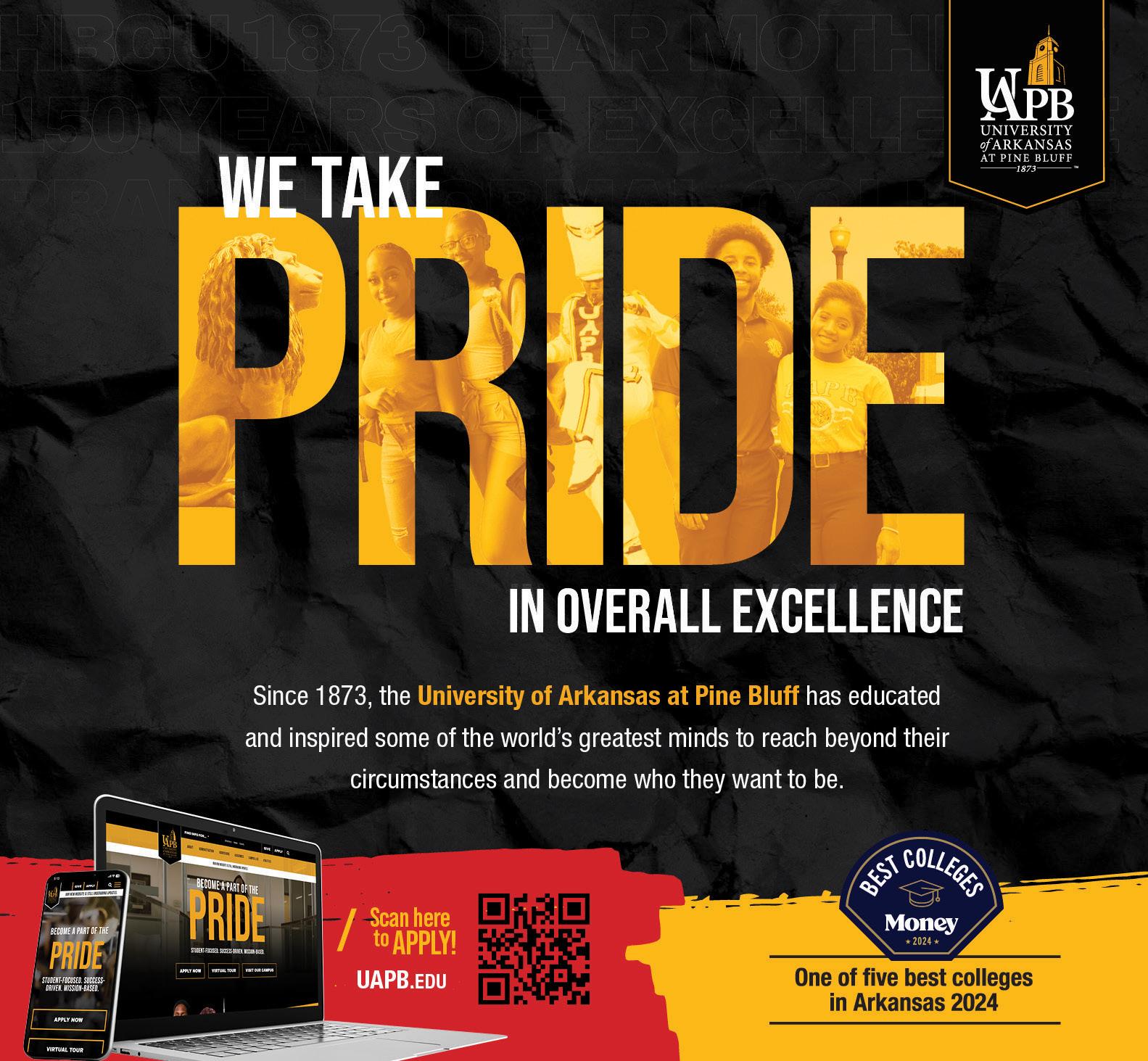
• PATHWAYS TO NURSING
• EYES TOWARD MENTAL HEALTH
• NURSES IN THE CLASSROOM: Spotlight on opportunities in the field of nursing education.
• MAGNET HOSPITALS AND RURAL HOSPITALS
• THE MOST IN-DEMAND NURSING SPECIALTIES
• EXPERIENCED NURSES SHARING WHAT THEY’VE LEARNED
• AND MORE!
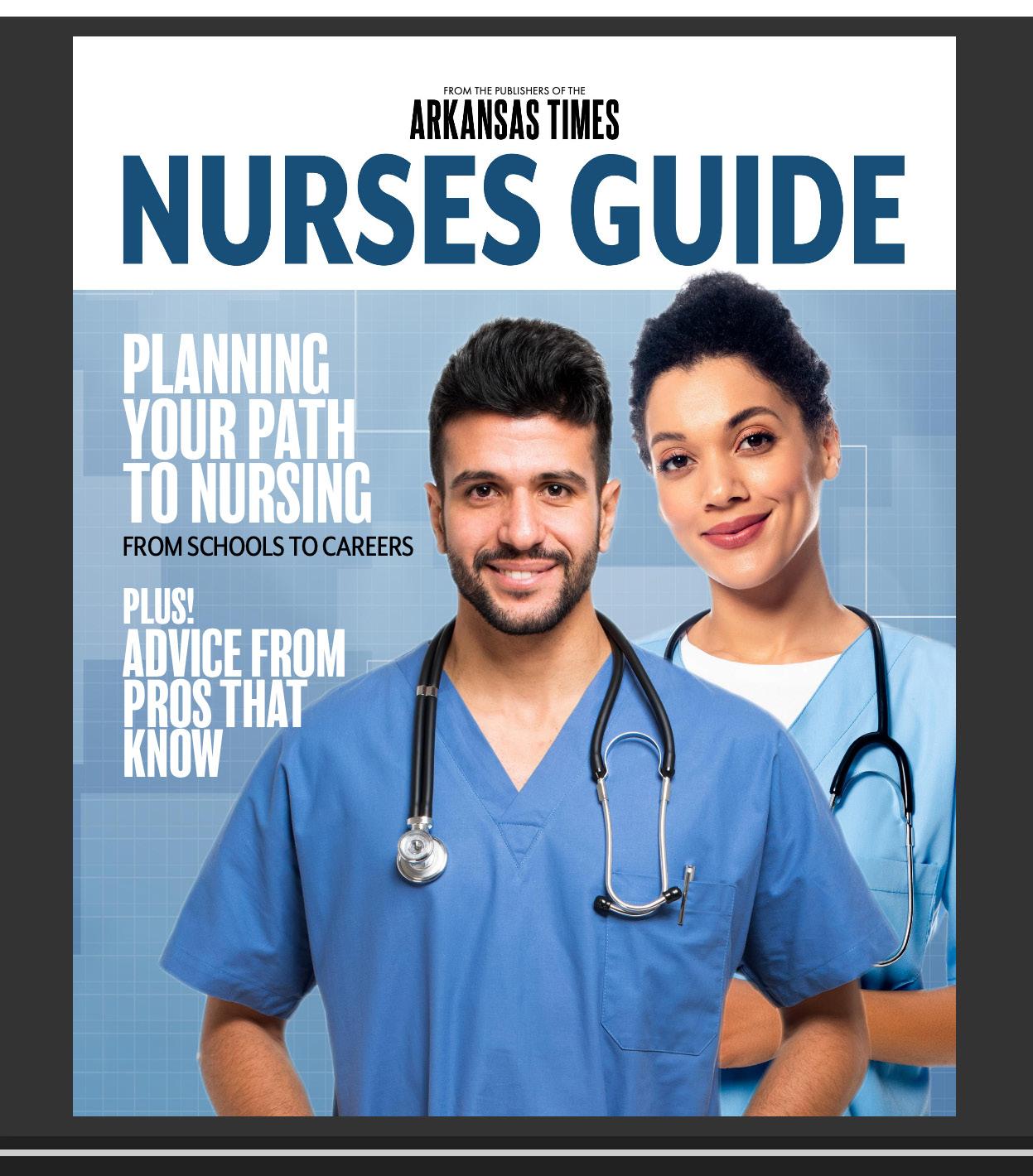
COMING OCTOBER 2024
In demand due to the growing digital economy and IT services.
ENTRY-LEVEL EDUCATION: Bachelor’s Degree
JOB GROWTH OUTLOOK 2022-2032: 25%
JOB DESCRIPTION: Software developers design computer applications or programs. Software quality assurance analysts and testers identify problems with applications or programs and report defects. Many software developers, quality assurance analysts and testers work in computer systems design and related services, in manufacturing or for software publishers. They often work in offices and on teams with other software developers or quality assurance analysts and testers.
MEDIAN PAY (NATIONALLY): $132,270
EDUCATIONAL FIELD: Software developers, quality assurance analysts and testers typically need a bachelor’s degree in computer and information technology or a related field. Some employers prefer to hire developers who have a master’s degree.
As dental health becomes a higher priority, the demand for dental hygienists is expected to rise.
ENTRY-LEVEL EDUCATION: Associate’s Degree
JOB GROWTH OUTLOOK 2022-2032: 7%
JOB DESCRIPTION: Dental hygienists examine patients for signs of oral diseases, such as gingivitis, and provide preventive care, including oral hygiene. Nearly all dental hygienists work in dentists’ offices, and many work part time.
MEDIAN PAY (NATIONALLY): $87,530
EDUCATIONAL FIELD: Dental hygienists typically need an associate’s degree in dental hygiene; they may also get a bachelor’s degree. Master’s degree programs in dental hygiene are available but are relatively uncommon. A bachelor’s or master’s degree usually is required for research, teaching or clinical practice in public or school health programs. High school students interested in becoming dental hygienists should take courses in biology, chemistry and math. Most dental hygiene programs also require applicants to complete prerequisites, which often include college-level courses. Specific requirements vary by school.
BIOCHEMISTS AND BIOPHYSICISTS:
The biotechnology and pharmaceutical industries continue to grow, fueling demand for biochemists and biophysicists.
ENTRY-LEVEL EDUCATION:
Doctoral or Professional Degree
JOB GROWTH OUTLOOK 2022-2032: 7%
JOB DESCRIPTION: Biochemists and biophysicists study the chemical and physical principles of living things and of biological processes. Biochemists and biophysicists typically work in laboratories and offices to conduct experiments and analyze the results.
MEDIAN PAY (NATIONALLY): $107,460
EDUCATIONAL FIELD: Biochemists and biophysicists need a Ph.D. to work in independent research and development. Many Ph.D. holders begin their careers in temporary postdoctoral research positions. Bachelor’s and master’s degree holders qualify for some entry-level positions in biochemistry and biophysics.
(SOURCE: MISSION GRADUATE)
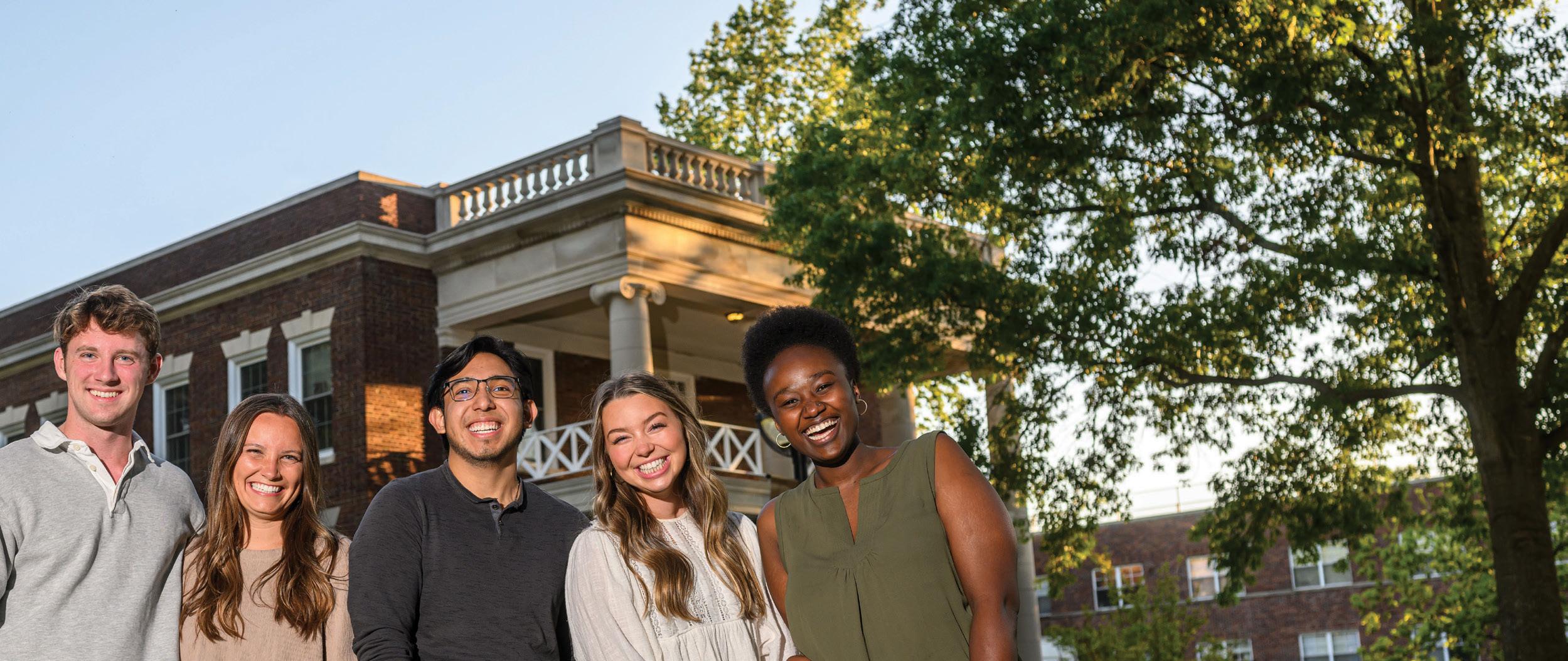

Essential for strategic business management.
ENTRY-LEVEL EDUCATION:
Bachelor’s Degree
JOB GROWTH OUTLOOK 2022-2032: 16%
JOB DESCRIPTION: Financial managers create financial reports, direct investment activities and develop plans for the long-term financial goals of their organization. Financial managers work in many industries, including banks, investment firms and insurance companies.
MEDIAN PAY (NATIONALLY): $156,100
EDUCATIONAL FIELD: Financial managers typically need at least a bachelor's degree in business, economics or a related field. These disciplines help students learn analytical skills and methods.
Increased demand for rehabilitation services.
ENTRY-LEVEL EDUCATION: Master’s Degree
JOB GROWTH OUTLOOK 2022-2032: 12%
JOB DESCRIPTION: Occupational therapists evaluate and treat people who have injuries, illnesses or disabilities to help them with vocational, daily living and other skills that promote independence. Occupational therapists work in a variety of settings such as hospitals, schools and outpatient clinics. They stand for long periods and may need to lift or move clients.
MEDIAN PAY (NATIONALLY): $96,370
EDUCATIONAL FIELD: Admission to graduate programs in occupational therapy requires a bachelor’s degree, although it may not need to be in a particular subject. However, master’s degree programs frequently require applicants to have
INFORMATION SECURITY ANALYSTS: Growing need for cybersecurity.
ENTRY-LEVEL EDUCATION: Bachelor’s Degree
JOB GROWTH OUTLOOK 2022-2032: 32%
JOB DESCRIPTION: Information security analysts plan and carry out security measures to protect an organization’s computer networks and systems.
MEDIAN PAY (ARKANSAS): $120,360
EDUCATIONAL FIELD: Information security analysts typically need a bachelor’s degree in computer and information technology or a related field, such as engineering or math. However, some workers enter the occupation with a high school diploma and relevant industry training and certification.
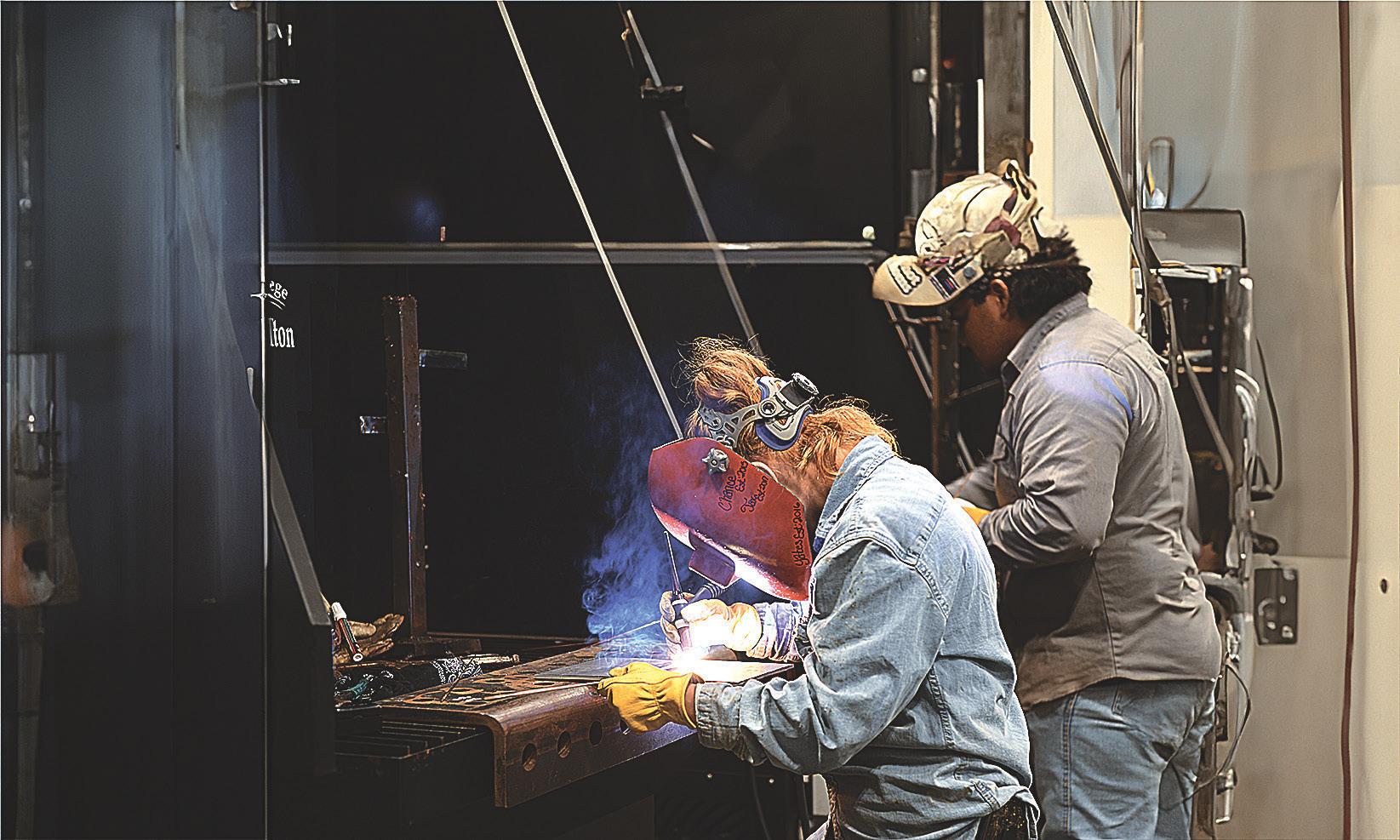
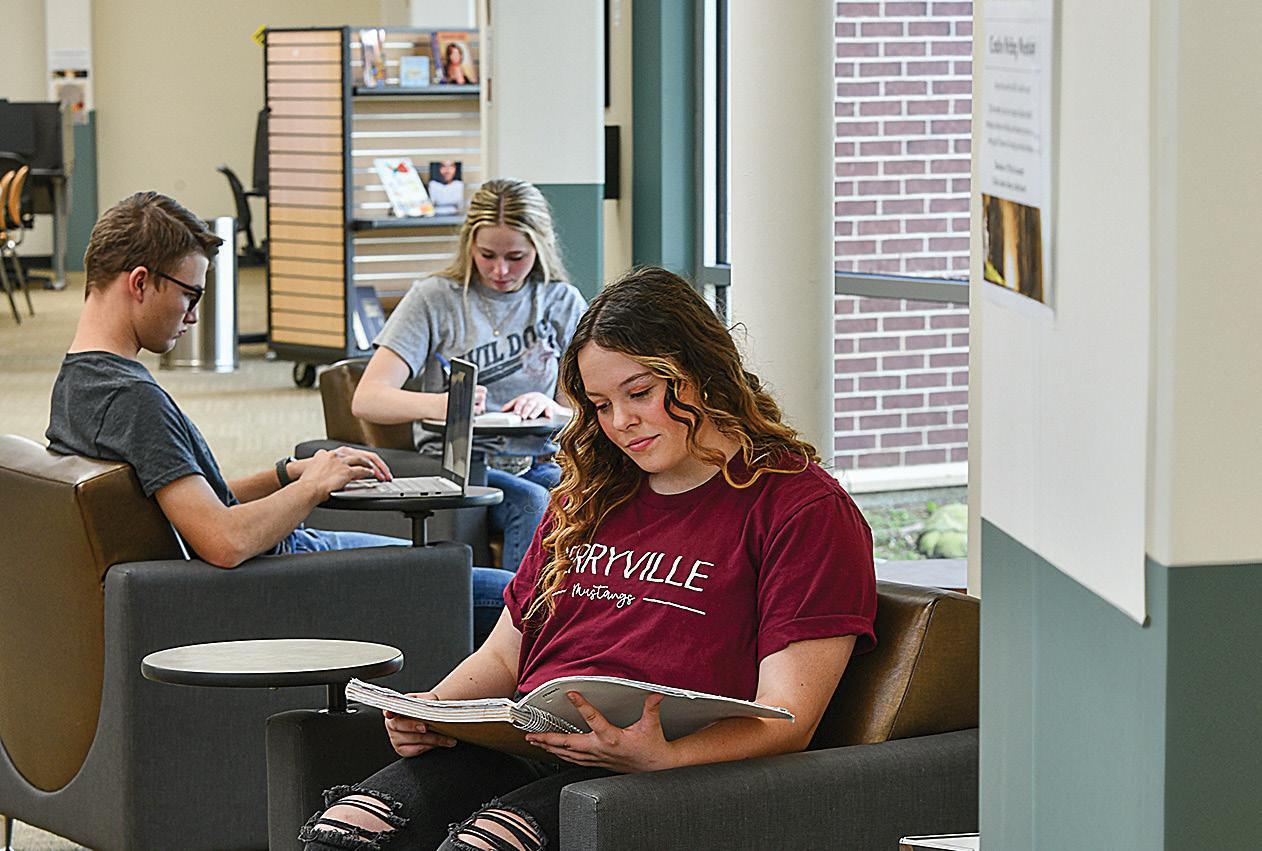

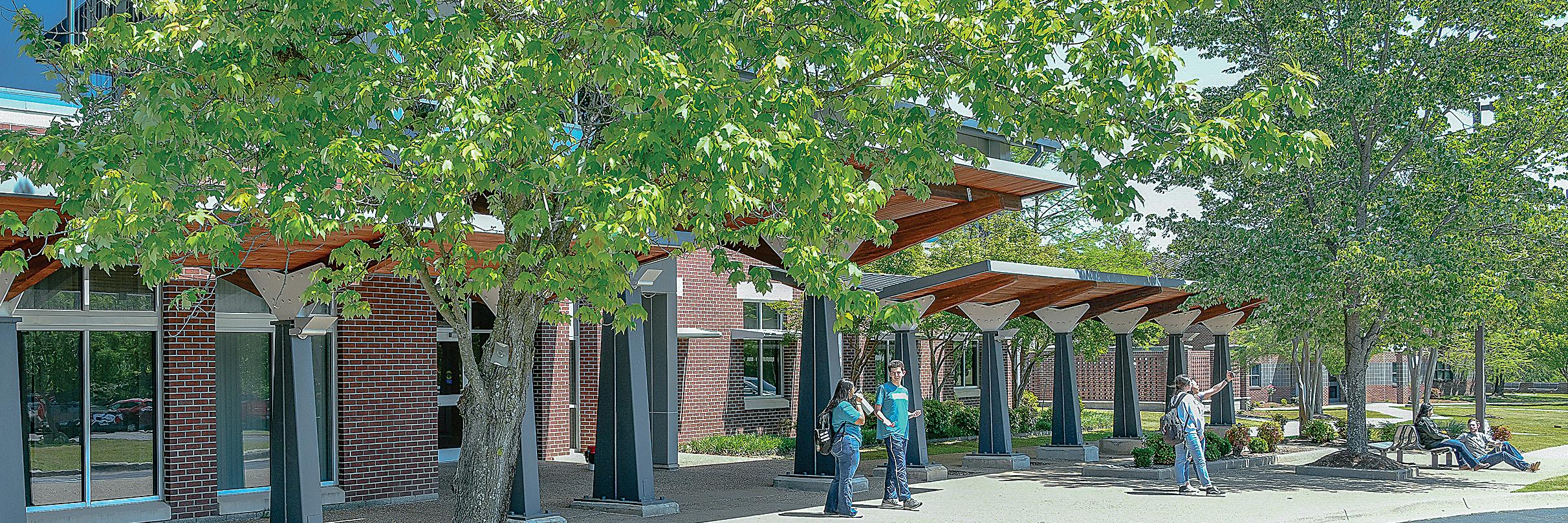

For the past 150 years, Lyon College has been educating Arkansas students who continue to shape the world around us. Lyon alumni include the top-notch computer scientists, entrepreneurs, engineers, business and community leaders, teachers, and family physicians that fill our every day. We are dedicated to producing successful graduates who contribute to our communities and our state. Lyon College is creating a better world, starting in Arkansas.

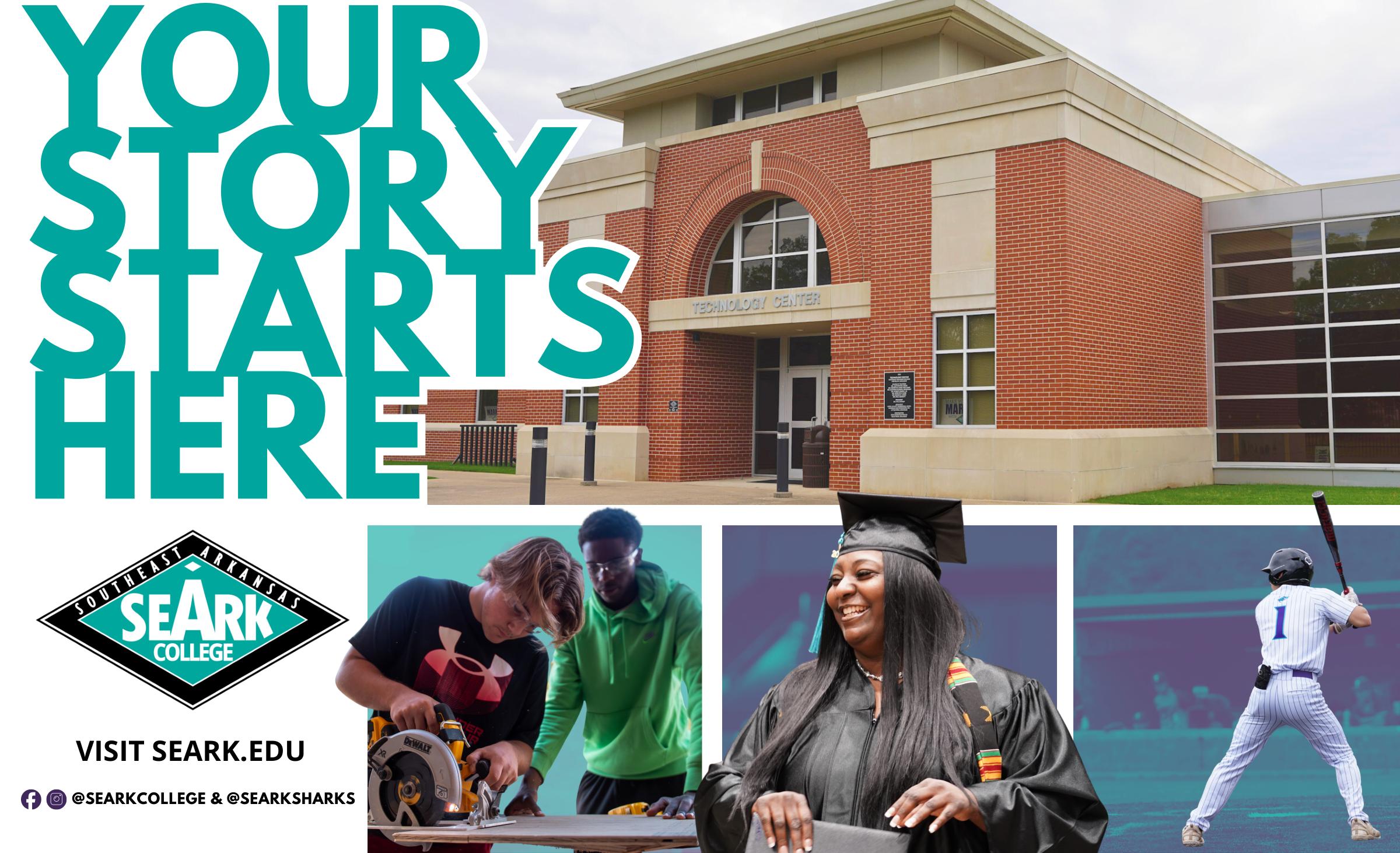
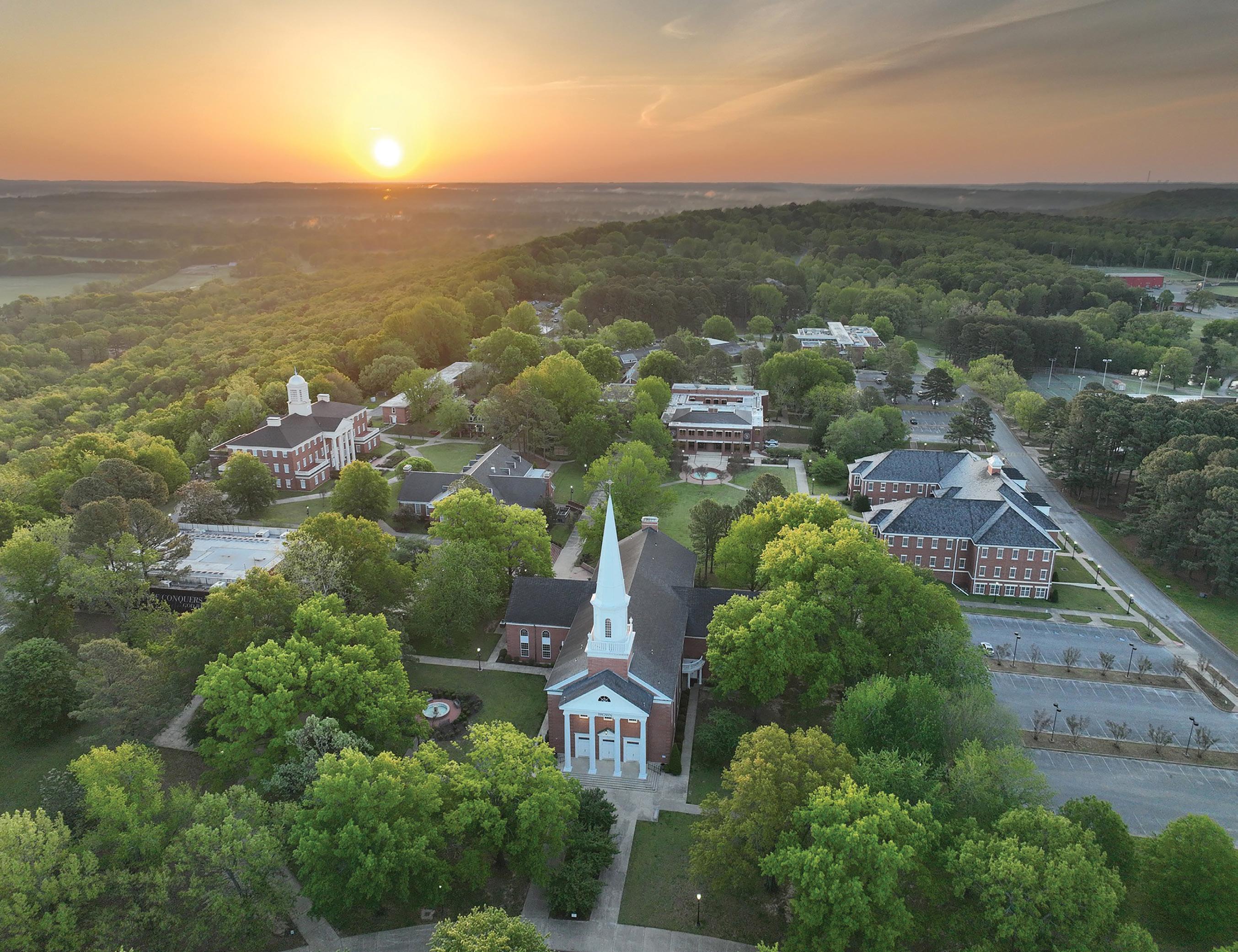
Living in a dorm can be a great experience if approached with respect and consideration. By following these dos and don’ts, you can create a positive and harmonious living environment for yourself and your roommate.
COMMUNICATE WITH YOUR ROOMMATE:
Establish open lines of communication from the start. Discuss sleep schedules, study habits and social preferences to create a harmonious living environment.
RESPECT SHARED SPACES:
Keep common areas like the bathroom and kitchen clean. Respect your roommate’s personal space and belongings to avoid conflicts.
SET BOUNDARIES:
Clearly define personal and shared items. This prevents misunderstandings about what’s OK to borrow and what’s not.
BE CONSIDERATE:
Keep noise levels down, especially during study times and late at night. Use headphones and take phone calls outside the room if necessary.
STAY ORGANIZED:
Keep your belongings tidy and your side of the room clean. This shows respect for your roommate and helps maintain a pleasant living environment.
AVOID PASSIVE-AGGRESSIVE BEHAVIOR:
If an issue arises, address it directly and calmly with your roommate. Avoid leaving notes or making passive-aggressive comments.
DON’T INVADE PRIVACY:
Always knock before entering the room if the door is closed and ask permission before bringing guests over.
AVOID HOARDING:
Keep your belongings to a manageable level. Clutter can make the room feel cramped and uncomfortable for both you and your roommate.
DON’T IGNORE PROBLEMS:
If conflicts arise, address them promptly. Ignoring issues can lead to bigger problems and strain your relationship with your roommate.
DON’T DISRESPECT SLEEP SCHEDULES:
Be mindful of your roommate’s sleep schedule. Avoid turning on bright lights or making loud noises when they are trying to sleep.
Moving into a dorm room is an exciting step in your college journey. Here are some tips to help you plan effectively for your new space:
MAKE A CHECKLIST:
Start by listing essential items like bedding, toiletries and study supplies. This helps ensure you don't forget anything crucial.
COORDINATE WITH YOUR ROOMMATE:
Communicate to avoid duplicate items. Share the responsibility of bringing bigger items like a microwave or mini-fridge.
OPTIMIZE YOUR SPACE:
Dorm rooms are often small, so think vertically. Use storage bins, hanging organizers and under-bed storage to maximize space.
PACK SMART:
Pack only what you need for the season and consider swapping out clothes during breaks. This keeps your room less cluttered.
PERSONALIZE YOUR SPACE:
Bring photos, posters and personal items to make your dorm feel like home. This can help you feel more comfortable and settled.
PLAN FOR MOVE-IN DAY:
Have a plan for logistics. Arrive early to get the best parking and have a dolly or cart for heavy items.
INVEST IN QUALITY BEDDING:
A good night's sleep is essential, so invest in comfortable and quality bedding. Consider a mattress topper for extra comfort.
BRING CLEANING SUPPLIES:
Dorm rooms can get messy quickly. Bring basics like disinfectant wipes, a small vacuum and laundry detergent.
I ended up having the best time ever, and one of the main reasons is because I got to be really good friends with my roommate. If you are planning to have a roommate freshman year, I highly recommend getting to know them because you might end up being really good friends. When it comes to living in a dorm, I cannot stress enough that you have to clean up after yourself. Remember you are coexisting with a lot of other people and no one wants to clean up after you. It is a great opportunity to show responsibility and learn about being independent.
MOLLY MITCHELL | INCOMING SOPHOMORE | HENDRIX.
CONSIDER ELECTRONICS:
Think about what electronics you'll need, like a laptop, chargers and a desk lamp. Extension cords and power strips can also be very useful.
PREPARE FOR STUDY TIME:
Create a dedicated study space with good lighting, and stock up on school supplies like notebooks, pens and a planner to stay organized.



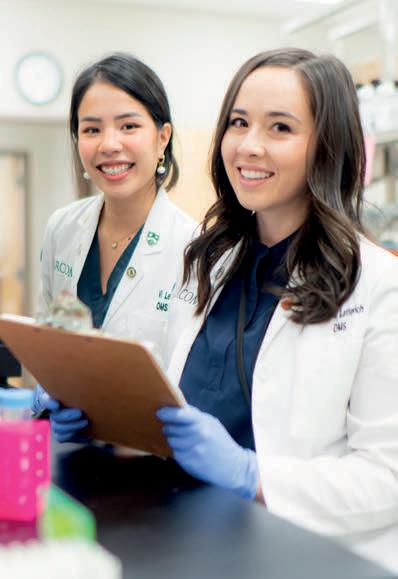

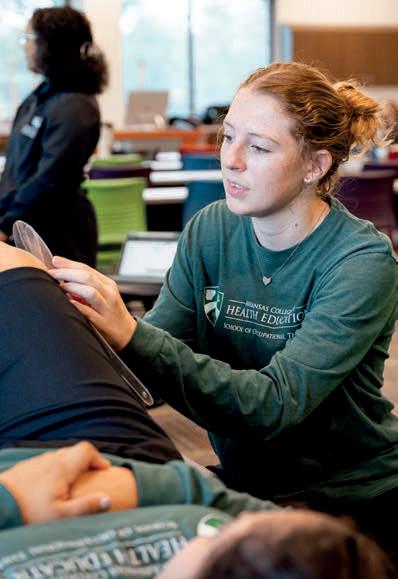



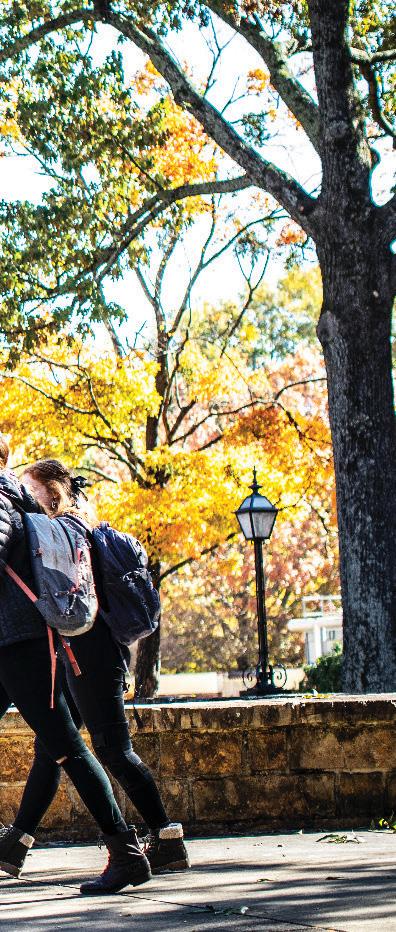


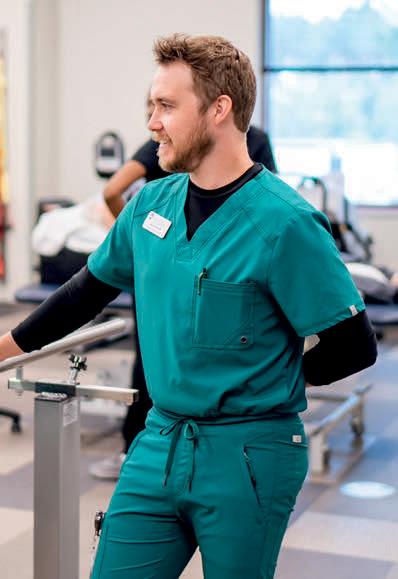




Safety on college campuses is a crucial concern for students and their families. With the excitement of starting a new chapter, it’s important to remain vigilant and proactive. Here are some key tips and strategies to help ensure a safe college experience:
One of the most effective ways to stay safe is to be constantly aware of your surroundings. Whether you’re walking to class, returning from the library late at night or attending a campus event, keep an eye on what’s happening around you. Avoid distractions like texting or listening to loud music that can make you less aware of potential dangers.
Most colleges offer various safety resources for students. Familiarize yourself with campus security services, including emergency contact numbers and the locations of emergency call boxes. Many campuses have blue light systems that provide direct access to campus security. Additionally, take advantage of escort services if you feel unsafe walking alone, especially at night.
If something doesn’t feel right, trust your instincts and remove yourself from the situation. Whether it’s an uncomfortable social setting or a suspicious person, it’s better to be safe and seek help if necessary.
When attending social events or walking around campus, especially at night, use the buddy system. Having a friend with you can deter potential threats and provide assistance, if needed.
Familiarize yourself with the campus layout, including the safest and most well-lit routes to and from your dorm, classes and other frequently visited areas. Knowing where you are and where you’re going can help you avoid dangerous situations.
While social events are a big part of college life, it’s important to stay sober and alert, especially in unfamiliar settings. Alcohol and drugs can impair your judgment and make you more vulnerable to accidents and assaults.
Theft is a common issue on college campuses. Always lock your dorm room and secure your personal belongings. Use a lock for your bike and never leave valuables unattended in public spaces. Consider using anti-theft devices for laptops and other electronics.
If you see something suspicious, report it to campus security or local law enforcement imvmediately. Prompt reporting can help prevent crimes and ensure the safety of everyone on campus.
Consider taking a self-defense class offered by your college or a local organization. Knowing basic self-defense techniques can boost your confidence and prepare you to defend yourself in case of an attack.
Stay informed about safety issues and share this knowledge with your peers. Attend safety workshops and seminars offered by your college. Being educated and proactive about safety can help create a safer campus environment for everyone.
Staying safe on campus is a shared responsibility. By following these tips, students can help protect themselves and contribute to a secure and supportive college community. Families can also play a role by discussing these safety strategies with their college-bound students and encouraging them to take advantage of available resources.
For more detailed information and additional safety tips, visit RAIIN.
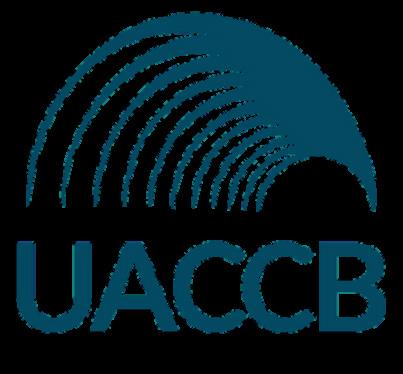
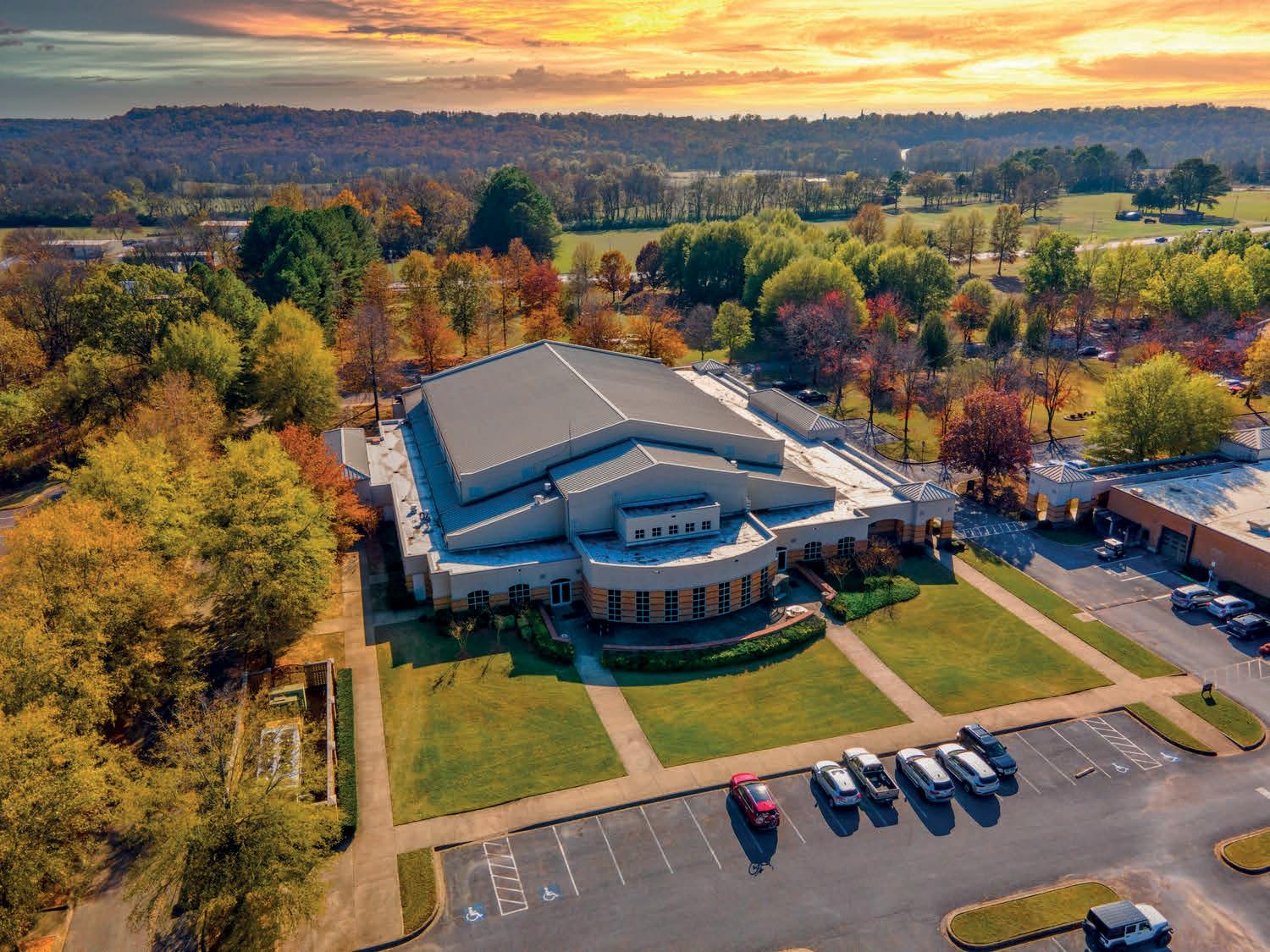


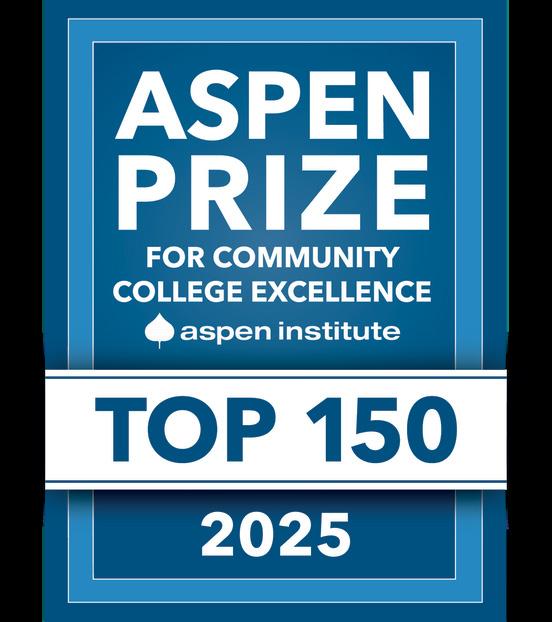
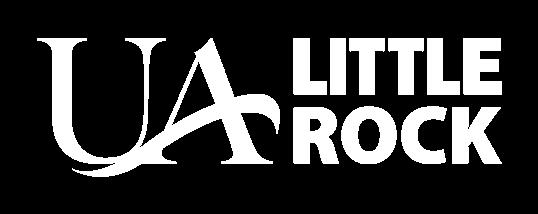
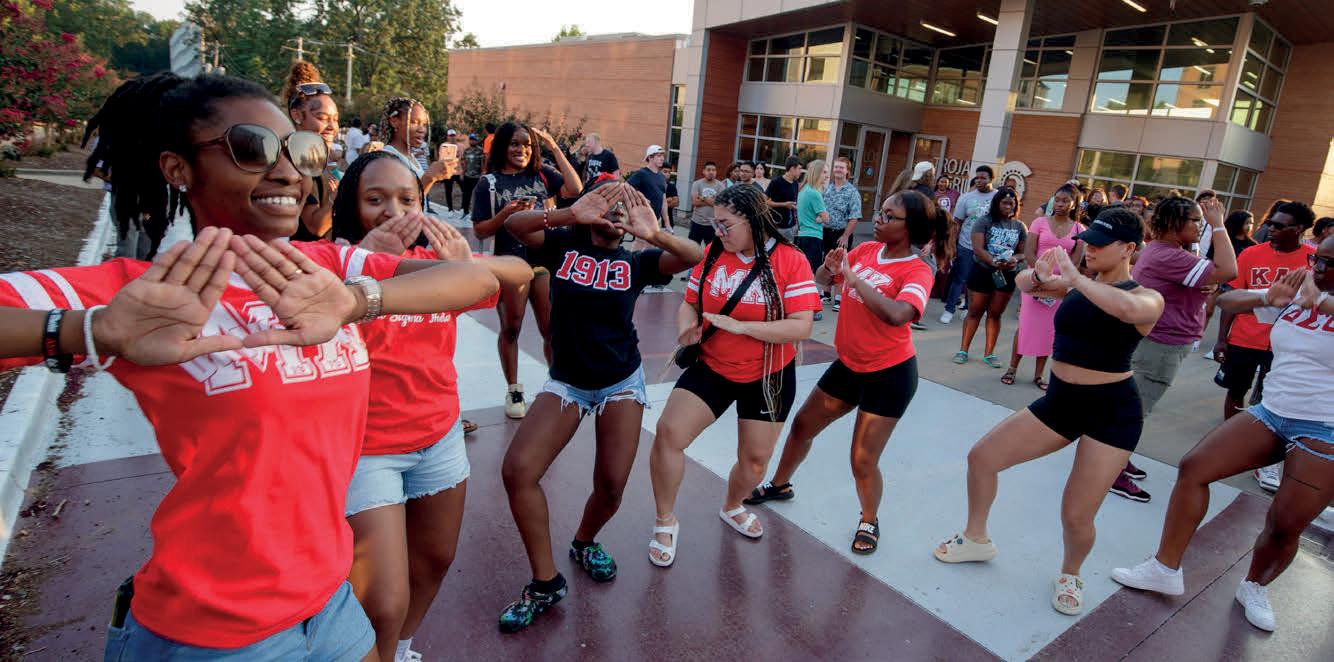
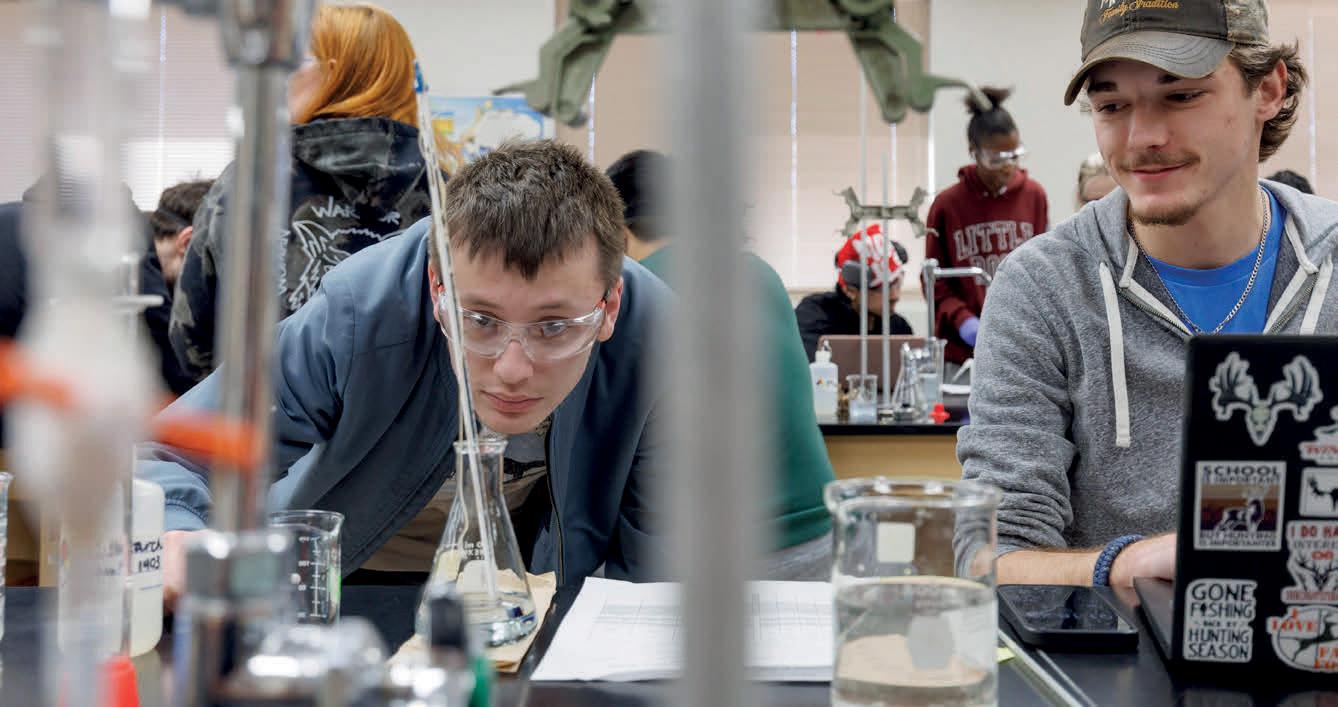

At UA Little Rock, you really can have it all. Immerse yourself in a vibrant campus community, engage in exciting internships, and build community with dozens of campus clubs. Plus, we continue to lead in affordability with the Trojan Guarantee . This scholarship ensures a zero-tuition bachelor’s degree for eligible students by covering remaining tuition and fees after financial aid.
With over 500 student organization events, there’s always something happening on campus. From leadership roles to creative outlets, you’ll find countless ways to grow.
With UA Little Rock, you can Expect More . More value, more adventures, and a future full of opportunity.

Scan the QR code or go to ualr.edu/scholarships to learn more
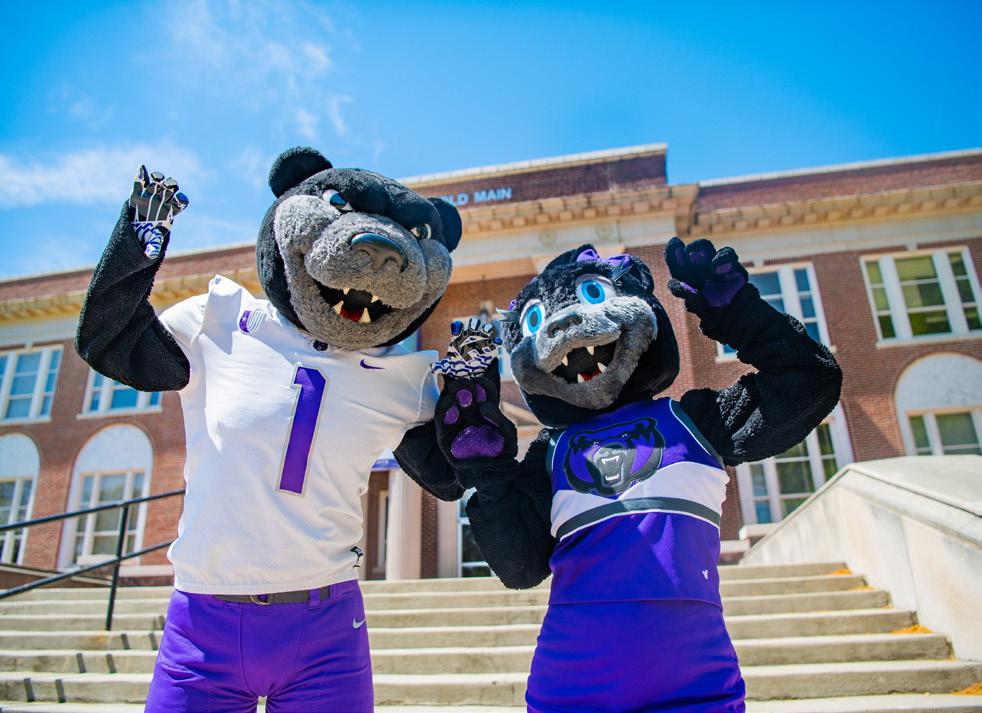

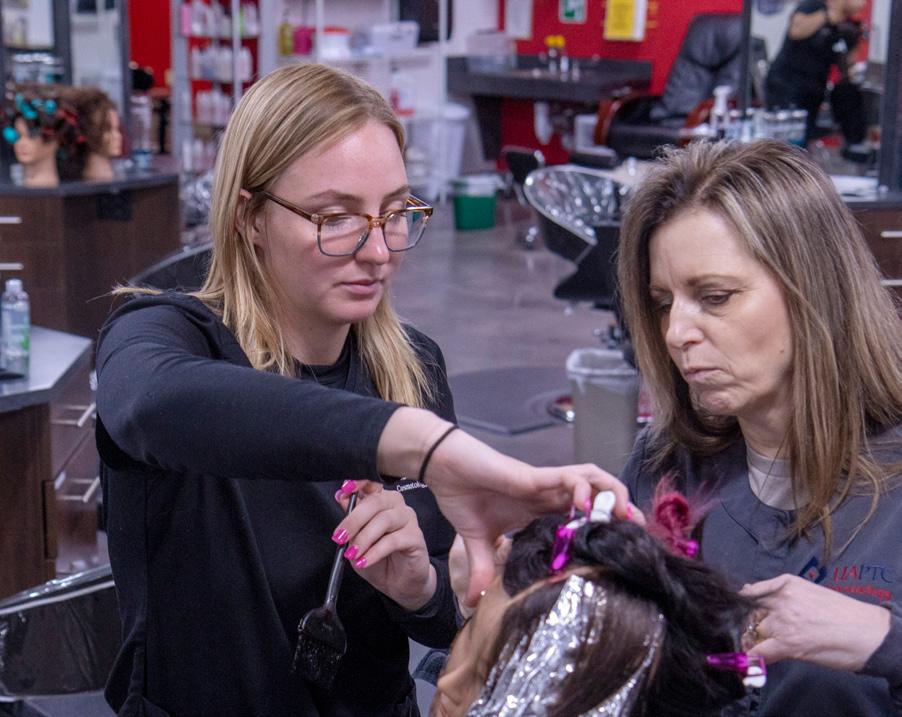

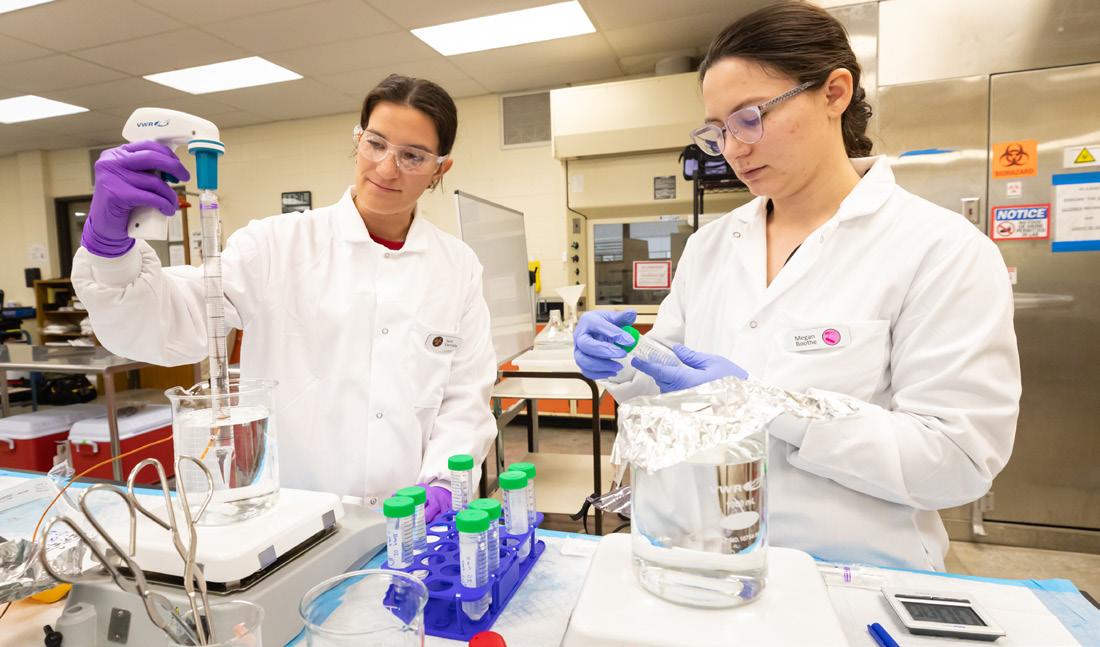

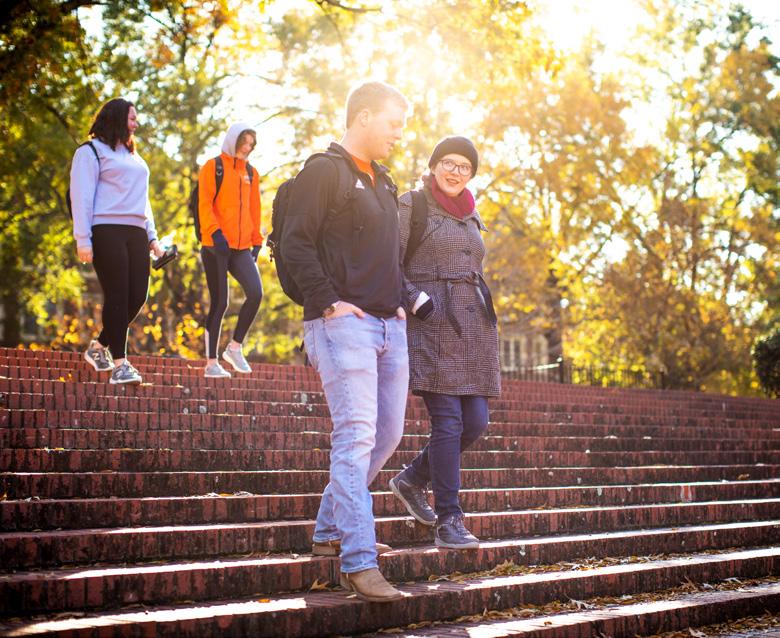
Choosing the right college is one of the most important decisions a student will ever make. Many factors go into the process of choosing an institution of higher learning, from quality of educational programs to on-campus amenities to employability after graduation.
All of the participating colleges and universities in the 2024 Arkansas Times College Guide have their own outstanding qualities, engaged faculty and network of alumni. We have prepared profiles of them here to give you, the aspiring collegian, a small taste of what they offer. We’re sure you’ll agree Arkansas enjoys a multitude of outstanding educational opportunities to fit every learning style, field of study or career aspiration. Without further ado, may we present for your consideration these fine Arkansas institutions of higher learning.
66 - Arkansas Northeastern College
67 - Arkansas State University
68 - John Brown University
69 - University Of Arkansas
70 - University Of Arkansas Community College at Batesville
71 - University Of Arkansas Little Rock
72 - University Of Arkansas-Pulaski Technical College
73 - University Of Central Arkansas
74 - Arkansas Colleges Of Health Education
74 - Arkansas State University Three Rivers
75 - Harding University
75 - Hendrix College
76 - Lyon College
76 - Southeast Arkansas College
77 - University Of Arkansas At Pine Bluff
77 - University Of Arkansas-Fort Smith

In a time when the prices of necessities are high, twoyear colleges are offering the best investment for students looking to acquire a higher education. According to Rachel Gifford, associate vice president for development and college relations for Arkansas Northeastern College in Blytheville, one of the school’s greatest advantages is its return on investment for its students.
“We are the most affordable college in the state, and our graduates earn more than any other state-supported institution of higher learning including universities,” she said. “Time is a precious commodity and something valued greatly at ANC. We understand students not only want but need to utilize our college in a way to make the most of their time. Because of this, we have put a focus on short-term programs that can be completed in a year or less, but that have excellent earning potential. These programs, along with the lowest tuition rate in the state, have allowed ANC to provide the best return on investment for students among all higher education in Arkansas. This, in turn, helps our local workforce to fill much needed positions at a faster rate. This pace keeps us on our toes and fosters innovation.”
Gifford says the staff at ANC are like a family, and they work hard to address the issues their students face, whether it is financial aid, food insecurity or clothing and transportation needs. “We appreciate our students are whole individuals who have lives outside of the classroom,” she said. “Sometimes those lives need a little help in order to even be in the classroom and to be able to perform in the classroom.”
At ANC, much more is provided than academic instruction, including opportunities to overcome challenges. ANC has adopted the multimodal approach to offering courses so that students can attend when and how they need or want. This has been well received by students, and ANC faculty continue to improve on these methods of delivering courses.
(and Some of it FREE)
There is a growing movement toward fast-tracking education and training, and national surveys show students are more interested in short-term educational programs where they can begin their career and start earning money faster. ANC offers many short-term programs, which take only a year or less, and that result in high wage-earning careers. Additionally, through the Emergency Training Programs Grant. which is federal money
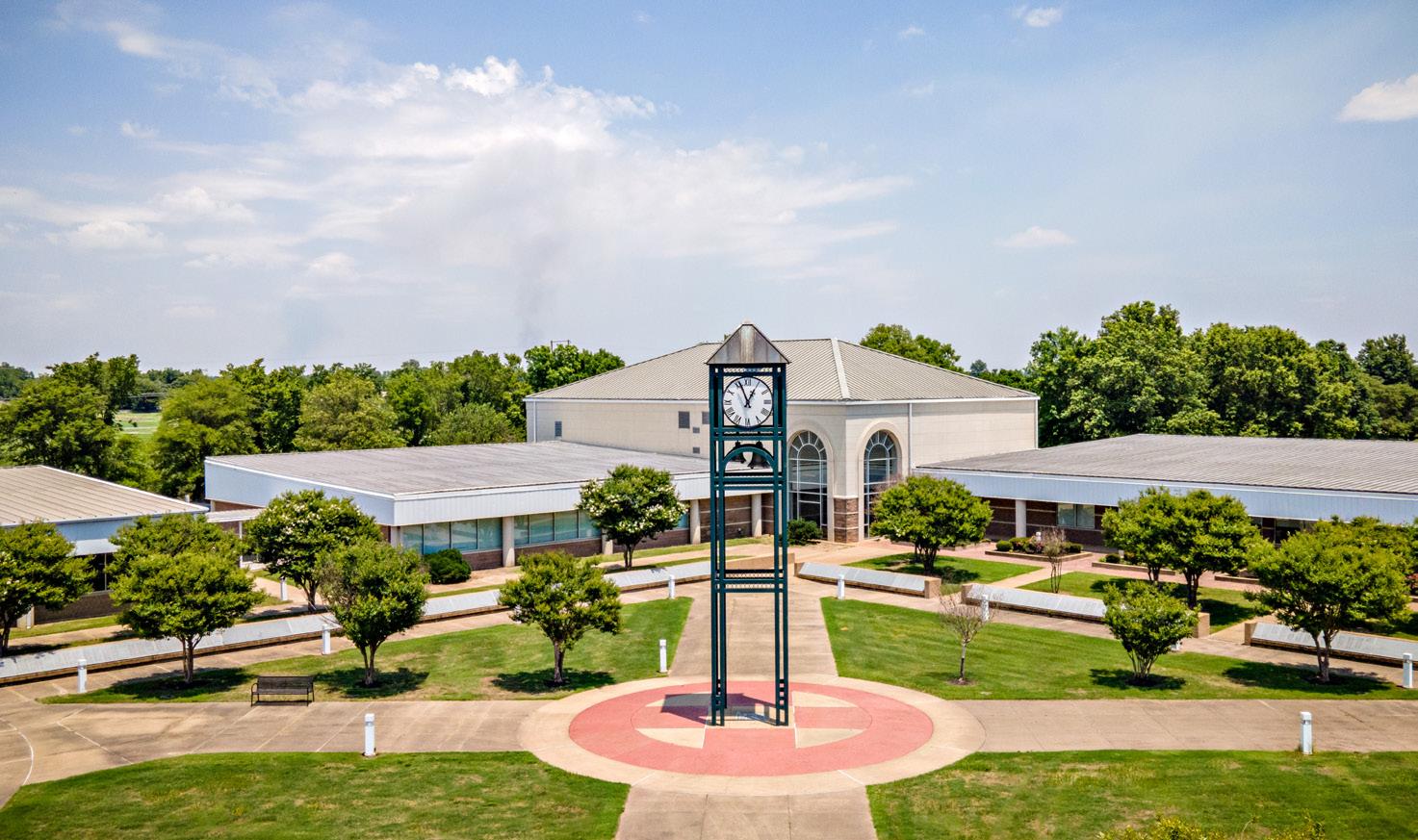
funneled through the Arkansas Department of Higher Education), ANC offers its construction technology program for free to all students. This one-semester program produced graduates earning $57,769 in their first year of employment following completion of the program, according to a 2019 Economic Security Report.
“There are opportunities for everyone at ANC,” Gifford said. “From traditional transfer courses and degrees to more career-specific programs and training, our programs range from short-term, one-semester and oneyear certificates to associate degrees. We have many students gaining credentials to head immediately to the workforce while others are preparing to transfer to the next educational level.”
Known for its nursing programs and steel industry technology programs, ANC has strong relationships with industry partners and local community leaders, which allows it to combine efforts for the betterment of students and community. The only college in Arkansas with a steel industry technology program, ANC has made quality service and courses a priority.
While known regionally and nationally for our workforce development programs, there is much more to ANC than world-class industrial training. The faculty and staff of ANC take pride in all aspects of the college experience and adhere to its mission of offering lifelong learning opportunities to our service district. ANC stays abreast of business and industry needs with our nationally recognized customized workforce training department called the Solutions Group, which provides flexible training tailored specifically for industry and their individual needs. Students also can hone their job-seeker skills through resume assistance, mock interviews and additional career support and guidance through ANC’s Placement Services and Career Pathways Initiative.
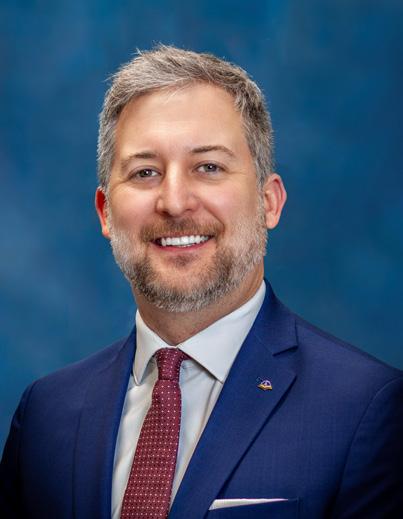
ANC’s paid internship program is a partnership with several local businesses and industries to offer on-the-job experience to students in specific degree programs. This helps reduce recruiting and training costs for employers while also giving students an opportunity to apply their classroom knowledge as they are learning. In addition, ANC has programs that incentivize employers to hire employees we recommend. ANC facilitates the Mississippi County Subsidized Wage program in partnership with the Mississippi County Economic Development, and the college’s Workforce Orientation and Retraining Keys (WORK) is a 72-clockhour program designed to lift under-skilled local residents out of poverty and, simultaneously, advance economic development by expanding the local workforce. Through the help and support of the ANC President’s Council for Underserved Communities, this program reaches out and finds people who desire a better quality of life and gives them the opportunity to learn the skills to be productive in the workforce. Not only is the WORK Program free to participants, it also incorporates an incentive pay to the students as long as they continue to meet the requirements of the program. WORK participants can earn participant incentives up to $500 during training to help remove barriers to employment, such as funds to purchase work clothes or specialized footwear. Those who complete the WORK program can obtain a certificate of WORK completion, a 10-hour OSHA certificate, an American Heart Association CPR card, a Career Readiness Certificate (CRC) and job interview opportunities with local employers.
“As president of Arkansas Northeastern College, I am excited about our future and deeply honored to lead this respected institution. Our tradition of academic and vocational excellence continues to drive our progress as we build on our past achievements. Student success is at the heart of everything we do, and we remain committed to providing a wide range of services and programs to support their diverse academic and career goals. ANC offers a solid foundation for academic endeavors, innovative career training and vocational pathways that make a significant impact. Join us at ANC, where every day we work towards shaping a brighter tomorrow.”
Dr. Christopher Heigle Arkansas Northeastern College
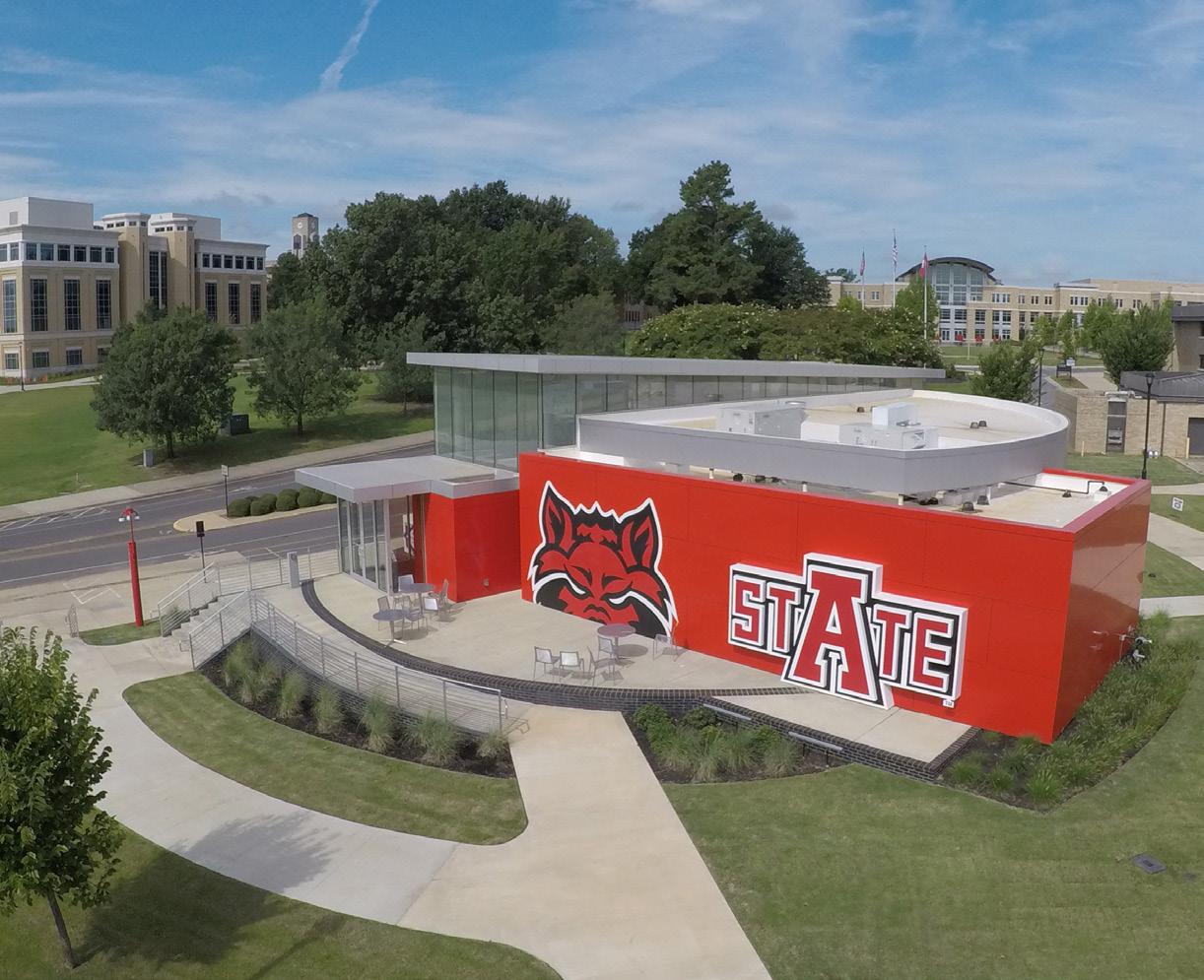
Arkansas State University, founded in 1909, is the second-largest university in the state. A Carnegie Research 2 university, A-State is large enough to prepare graduates to achieve at the highest levels, but small enough for students to know their instructors on a firstname basis.
A-State is home to the first osteopathic medical school in Arkansas, the NYIT College of Osteopathic Medicine at Arkansas State, and is the only institution in the state where a student can progress from freshman to physician on one campus. A-State’s B.S. to D.O. pre-professional pathway allows qualified students to enter the D.O. program in just three years, reducing the total cost of attendance.
Arkansas has among the lowest ratios of vets to pets in the U.S. and a dramatic need for large animal veterinarians. As an integral part of the agricultural fabric of the greater Delta region, Arkansas State will open the state’s first public College of Veterinary Medicine, providing the opportunity for students to chase their dreams without leaving Arkansas.
Soon, Arkansas State will become the only university in Arkansas to operate both a medical and veterinary school, a biosciences institute, an international campus and the state’s largest graduate school.
A-State has more than 160 major fields of study offered by 10 colleges at the doctoral, specialist, master’s, bachelor’s and associate degree levels.
The university continues to expand its research agenda through various venues and institutes. The Arkansas Biosciences Institute at Arkansas State conducts research projects on rice, the state’s most important crop. Developing rice varieties that thrive in warming climates and finding ways to use plants to create new medicines and medical materials are just two of the major research projects underway.
Red Wolves aren’t just a mascot; they are also the subject of research and preservation programs by Arkansas State University. The institution is a national repository for DNA and other essential materials related to the American Red Wolf, listed as the most endangered canine species.
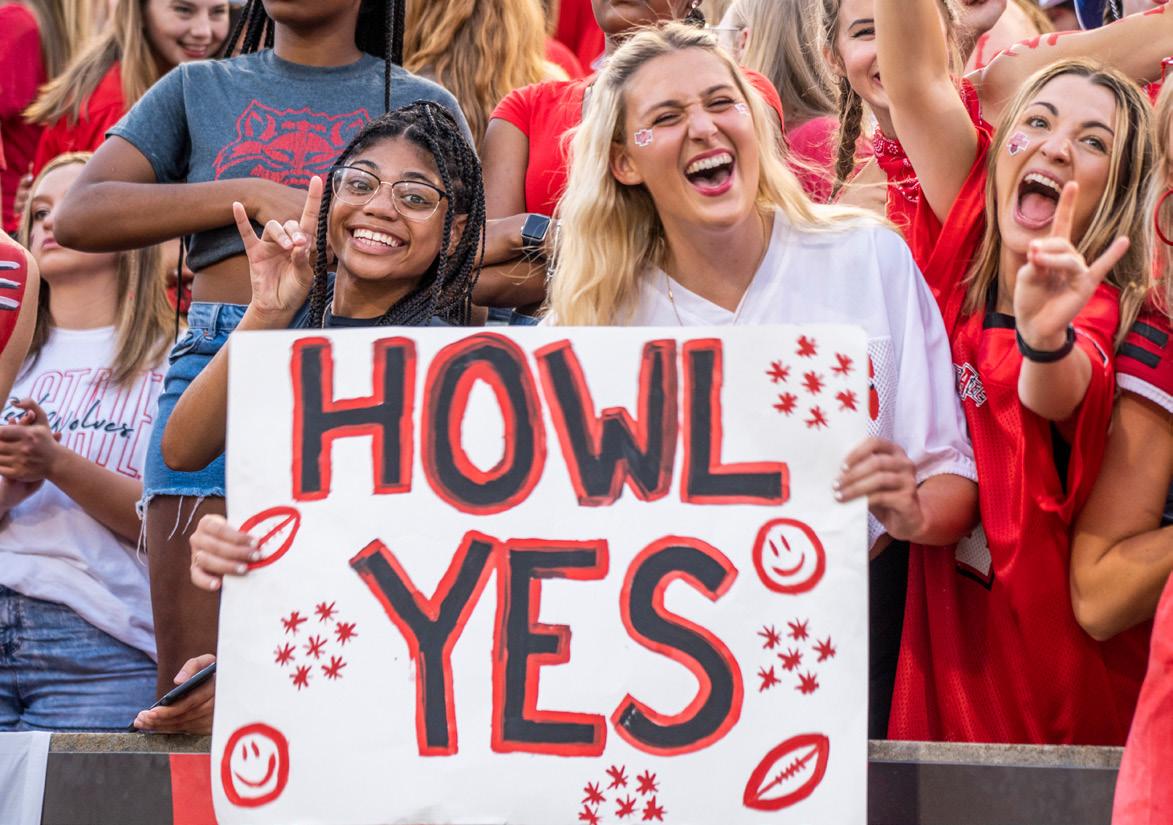
In addition to award-winning classroom and field instruction, Arkansas State University is a pioneer in online learning. Its online degree program, A-State Online, is the largest online provider in the state. While the majority (74%) are graduate students, more than 1,500 are pursuing bachelor’s degrees.
The school offers over 50 undergraduate degree and certificate options, conducted 100% online to allow maximum flexibility to meet students’ schedules.
A-State makes getting a college degree easier than ever with a streamlined admissions process and multiple start dates throughout the calendar year. Plus, with university-approved credit for prior learning, students can gain academic credit for work experience, employer training programs, military service, independent study and community service. Combined with shorter courses (seven weeks versus nine weeks), this helps students complete their degrees in record time without sacrificing quality teaching or challenging coursework.
Students will find over 150 clubs and organizations at A-State, including fraternity and sorority life, leadership groups, interest clubs and more. With a diverse student body from across the nation and around the world, and more than 100,000 alumni, A-State is the home of the Red Wolves, a Bowl Championship Series Division I athletic program with numerous Sun Belt Conference titles across its 16 NCAA varsity sports. A-State also sponsors nationally competitive club sport teams like rugby, softball, competitive cheer and dance and Esports that have earned national titles or national runner-up titles in recent years.
Arkansas State is committed to easing the financial burden of higher education for Arkansas families and keeping the total cost of attendance as low as possible. More than 80% of students receive some sort of financial aid, enabling them to attend A-State.
The newly reconfigured A-State Promise Plus scholarship will bridge the tuition gap for Arkansas families with an adjusted household income of $70,000 or less, covering all remaining tuition and fees after federal and state aid has been applied. In addition, the scholarship provides a $2,500 housing scholarship that increases
for the sophomore through senior year.
A-State also offers a variety of merit-based and out-of-state scholarships based on test scores and high school GPA.
For more information on these or other financial aid and scholarships, visit AState.edu/Scholarships.
• In 2023, A-State announced a new record fall enrollment of 14,903, a 6% increase from the previous year. A-State grew across most categories, but was notably up in first-time, first-year students and on-campus residents.
• A-State is a six-time recipient of the Higher Education Excellence in Diversity award, the only university in Arkansas to be recognized.
Northeast Arkansas has become the country’s number one steel-producing region with more than 20 steel-related companies and another $3 billion in planned facility expansion. The A-State Center for Advanced Materials and Steel Manufacturing will play a critical role in providing the research, process improvement and workforce development to support this thriving industry.
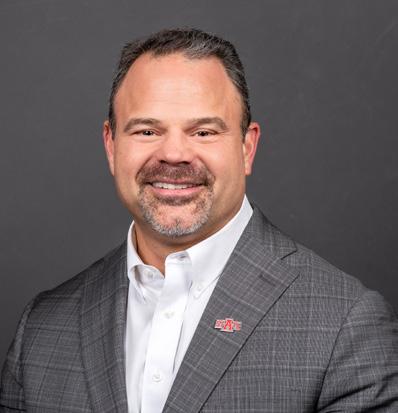
CHANCELLOR’S MESSAGE
“I am committed to continuing the student-centered success of Arkansas State and forging strong connections between higher education, private business, non-profits and government to create lasting improvements in our communities, state and nation.”
Todd Shields Arkansas State University

John Brown University (JBU) is a private, interdenominational Christian university nestled in Siloam Springs, Arkansas. Founded in 1919, JBU offers a Christ-centered education that equips students for academic excellence, personal growth, and lifelong service.
JBU boasts a diverse range of undergraduate programs, with popular majors including Nursing, Psychology, Construction Management, Graphic Design, Family and Human Services, Engineering, Kinesiology, Computer Science, and Biology. Looking for something unique? JBU offers innovative programs like Artificial Intelligence, Entrepreneurship & Innovation, Criminal Justice, Cybersecurity, Intercultural Studies, and Bible & Ministry.
The fastest-growing majors at JBU reflect the current job market trends – Criminal Justice and Computer Science. Students seeking extra support can access comprehensive tutoring services, while those with postgraduate aspirations are well-served by the university's graduate school programs. JBU even offers study-abroad opportunities, allowing students to broaden their horizons and gain valuable international experience.
JBU is committed to making a quality education accessible to all deserving students. A staggering 99% of students receive financial aid, making tuition more manageable. JBU offers a variety of scholarships, including the Presidential Scholarship ($30,000 annually), Chancellor's Scholarship ($15,000 annually), and Merit-based Scholarships for Music & Theatre Majors and Art Students. Here are some additional tips for financing your college education:
JBU fosters a thriving campus community where students can connect, grow, and have fun. With over 23 student clubs and organizations, there's something for everyone, from academic honor societies to religious groups and special interest clubs. On-campus housing provides a supportive living environment, while the absence of a Greek system promotes inclusivity and a strong sense of community.
Students can stay active through intramural athletics and enjoy a variety of campus events. One of the most beloved JBU traditions is the October "World Famous Toilet Paper Game," where fans unleash a
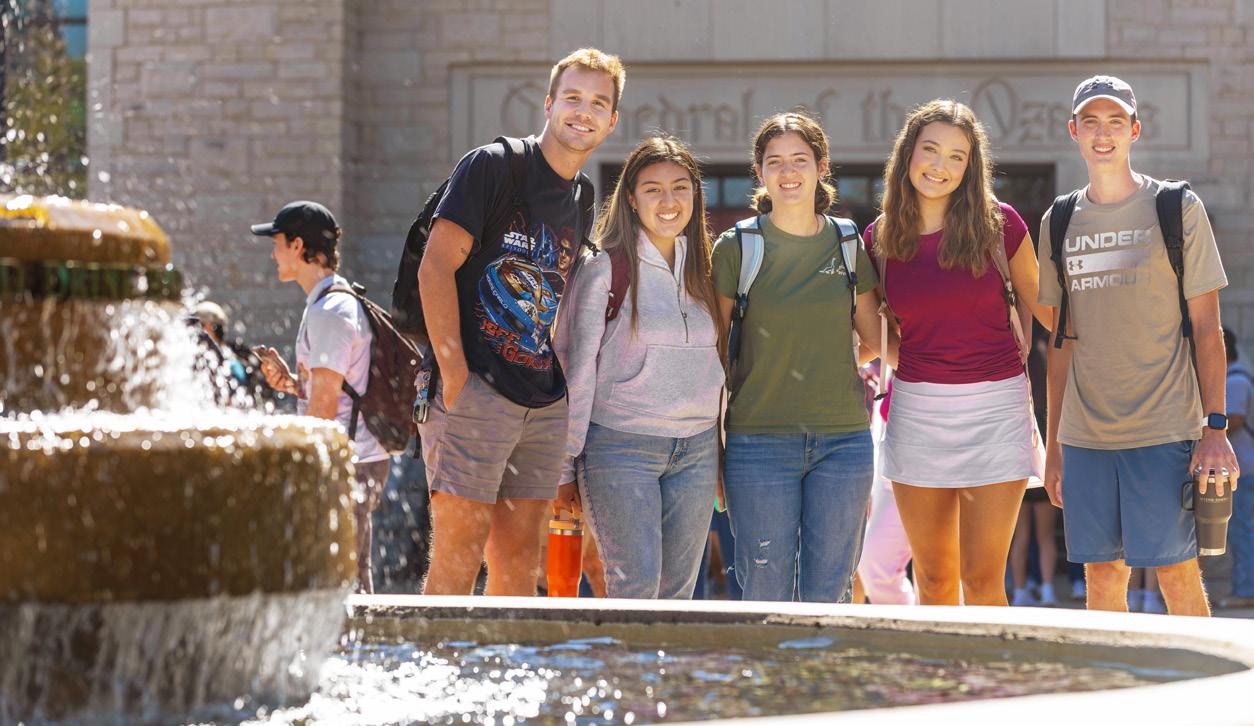
flurry of toilet paper after the Golden Eagles score their first home basketball game basket.
JBU prioritizes the well-being of its students. The university offers a comprehensive health center with a variety of services, including medication dispensing, doctor referrals, and wound care. Mental health services are also available with the Student Counseling Center providing free counseling sessions and lowcost options for continued support. Campus security offers 24/7 security patrols, safety rides, self-defense training, and various other initiatives to ensure a safe and secure environment.
JBU athletics compete in the Sooner Athletic Conference (NAIA Division I) with a strong showing across men's and women's sports. The Golden Eagles boast recent athletic achievements such as the Women's Basketball Team's undefeated regular season championship, the Women's Soccer team's four-peat conference championship title, and the Esports League of Legends team's national championship win.
JBU graduates are well-prepared for successful careers. The university offers career placement services and facilitates access to off-campus internship opportunities. Within just six months of graduation, 96% of JBU students are employed, enrolled in graduate school, or serving in the military. JBU graduates command impressive starting salaries, with the average range falling between $40,000 and $50,000. Nursing, Engineering, and Computer Science are among the top job fields in high demand for JBU graduates.
•JBU is the only Christian university in Northwest Arkansas, offering a faith-based education that integrates academics and spiritual growth.
•JBU has been recognized as Arkansas' #1 university by The Wall Street Journal 2024 College Rankings.
•Students benefit from close relationships with professors who are dedicated to their academic and personal development.
•JBU offers a variety of scholarships and financial aid packages, making a Christ-centered education attainable for all.
•JBU is the first college in Arkansas to offer a full bachelor's degree in Artificial Intelligence.
"JBU has been an incredible journey of personal and spiritual growth. The professors truly care about their students, and the supportive community has made all the difference. I've had countless opportunities to get involved on campus, and I'm so grateful for the friendships I've made here." Emily Carter, Senior, Nursing
"I chose JBU because of its strong Christian foundation and the opportunity to pursue my passion for engineering. The hands-on learning experiences and access to state-of-the-art facilities have prepared me well for my future career." Daniel Rodriguez, Junior, Engineering
"Take advantage of every opportunity JBU offers. Get involved in clubs, attend campus events, and build strong relationships with your professors. Your college years are a time for personal growth and exploration, so make the most of it!" Ben Cornelius, Freshman, Integrated Marketing & Communications
"Don't be afraid to step outside your comfort zone. Try new things, meet new people, and challenge yourself academically. JBU provides a safe and supportive environment to grow and learn." Kamille Fermin, Freshman, Marketing and Management.

“A Christian liberal arts education prepares students to serve God throughout their lives. They gain a deeper appreciation of the good things in life and a deeper concern to address the brokenness in life. They are trained to be excellent in their chosen profession, but they are also educated to speak more clearly, to write more effectively, to understand complex issues and to care more deeply.”
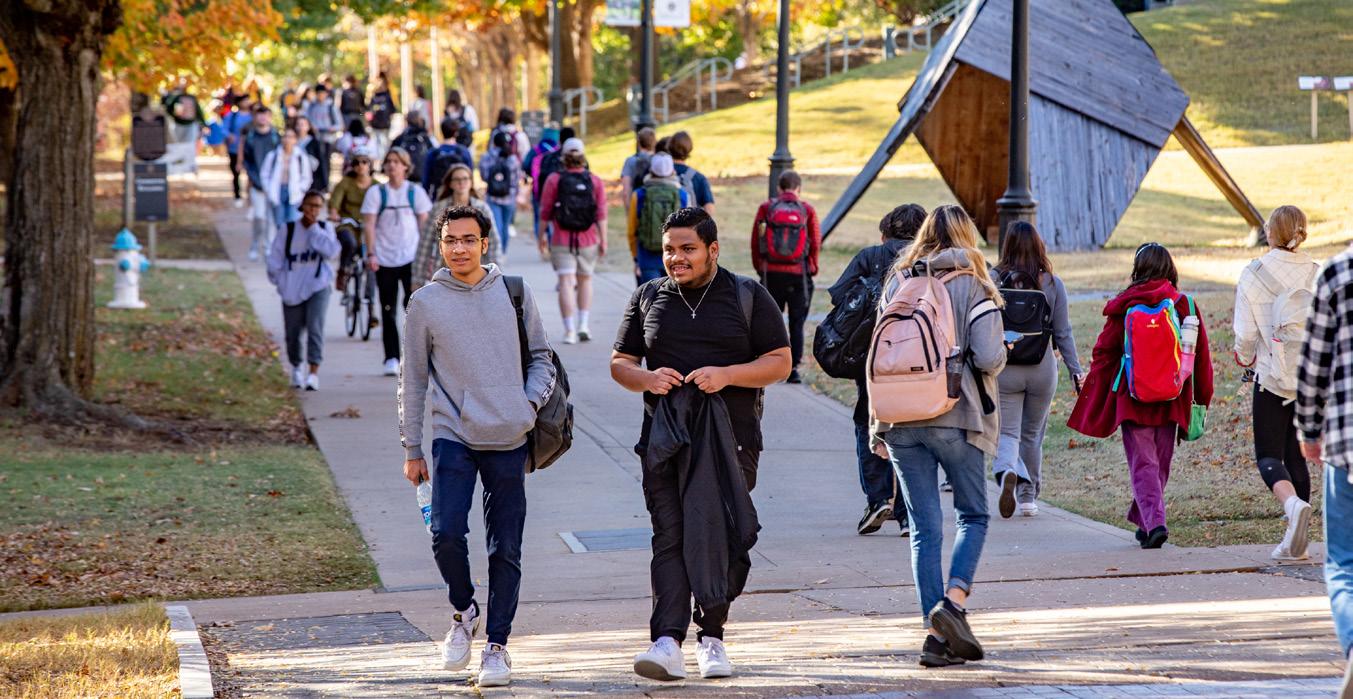
The home of the Razorbacks and the crown jewel of Northwest Arkansas, the University of Arkansas at Fayetteville has a reputation for being a leader in education and fun. Founded in 1871, UA Fayetteville most recently enrolled more than 32,000 students. The Graduate School at the University of Arkansas has a reputation for producing influential leaders and first-class researchers with its students working with experts in their fields who are striving to answer today’s most challenging questions. They are at the forefront of discovery and are committed to enriching the global community.
Last year, 98% of Arkansas students who applied for scholarships received an award with 67.5% of 2023 students and 77% of new first-year students received financial aid. When considering how to pay for a college education, UA Fayetteville offers these tips:
• Start early and plan. Start reviewing and comparing tuition, fees, housing and food costs at potential colleges as early as possible. Start a 529 plan or other college savings account. Take AP courses or dual/concurrent courses while in high school to reduce college costs.
• Apply for federal aid by completing the Free Application for Federal Student Aid and seek state aid through the Arkansas Department of Higher Education.
• Consider resources beyond federal and state aid. Apply for scholarships available in your local community, online and at the colleges you are considering. Also consider availability of military benefits, rehabilitation services, employer tuition assistance programs, income from working, family resources, tax credits and benefits, private student loans, etc.
Whether you are looking for a quiet place to study or an event to make new lifelong friends, UA Fayetteville has the campus life to fit your style. With more than 380 registered student organizations ranging from cultural and religious to professional and special interests, 34 fraternities and sororities and 31% of students on the UA campus as members of a Greek-lettered organization, more than 30 intramural activities throughout the year, organized into team sports, dual sports and individual sports including flag football, basketball, indoor and outdoor soccer, slow pitch softball, indoor and sand volleyball, track meets, and more, there is virtually some organization for every interest. And with 20 halls to choose from, you can live on campus and walk to class, labs, the library and other locations in a matter of minutes.
If you need medical attention, but you aren’t sure where to go, UA Fayetteville has the Pat Walker Health

Center outpatient services, which provides more medical solutions than other local community clinics and better meets the needs of the college’s diverse campus. Board-certified physicians and nurse practitioners are available to treat both acute and chronic illnesses/injuries, and the medical clinic offers many services, including minor office surgical procedures, IV fluids, wound care, laceration repair, evaluation/treatment of orthopedic injuries and more. It also offers routine wellness physical exams, screening for infectious diseases, integrated behavioral health and dietitian counseling.
The Pat Walker Health Center’s Counseling and Psychological Services is committed to supporting UA Fayetteville students with all mental health care needs. CAPS offers critical mental health services such as short-term individual counseling, group counseling, psychiatry, 24/7 mental health emergency services and case management.
Among the newest buildings is the U A School of Art, the first and only accredited art school in Arkansas, which recently opened the doors to its new state-of-the-art 154,000-square-foot Studio and Design Center as part of the newly constructed Windgate Arts and Design District in south Fayetteville. The center offers 10 areas of study, including ceramics, graphic design, photography, printmaking, painting and drawing as well as degrees in art education, art history and history in arts of the Americas. The school has awarded over $500,000 in undergraduate academic scholarships and more than $100,000 in undergraduate research and summer opportunities (with 99% of those applying receiving scholarships). The building features a design clinic offering collaboration with community partners, a print lab and a coffee bar serving students, faculty and the community.
As part of the university’s commitment to ensuring that students have the tools and resources to be successful, the Cordia Harrington Center for Excellence is a 71,000-square-foot facility that houses programs focused on maximizing student success, specifically first-generation Arkansans. In addition to student success programs the building includes study rooms, meeting spaces, dining hall and coffee shop.
The Institute for Integrative and Innovative Research (I³R), located across from the Bell Engineering Center and John. A. White Engineering Hall, will open later this year. I³R will advance research and economic development throughout the region by empowering collaboration with university-wide research facilities as well as industry, health care, nonprofit and community partners. In 2023, the Department of Defense granted I³R $4.9 million to expand clinical research for prosthetics that can be driven by a user’s brain. Walter Reed Nation-
al Military Medical Center in Bethesda, Maryland, will also be added as a clinical site for the study.
Construction continues in south Fayetteville on the Multi-User Silicon Carbide Research and Fabrication Facility, a new semiconductor research and fabrication facility that will enable the federal government — via national laboratories — businesses of all sizes and other universities to protype with silicon carbide. The facility will fill a national gap, as this capability doesn’t exist elsewhere in the U.S. The center held topping-out ceremonies in April.
The Anthony Timberlands Center for Design and Materials Innovation, part of the Fay Jones School of Architecture and Design, is a regional center focused on the research and development of new wood products and innovative approaches in sustainable construction materials. The building serves as a model of mass timber and wood product construction, with its eventual role being to educate and inspire design students in the ways wood can be used in construction while supporting the timber industry in Arkansas. Under construction, the building is set to open to students in late 2025.
The first of its kind in the state, the Harvell Civil Engineering Research and Education Center is a large-scale structural testing facility. The research at the center enables development of more efficient, safer and cost-effective construction methods for steel, concrete and timber in Arkansas and the nation. The center opened in 2021.
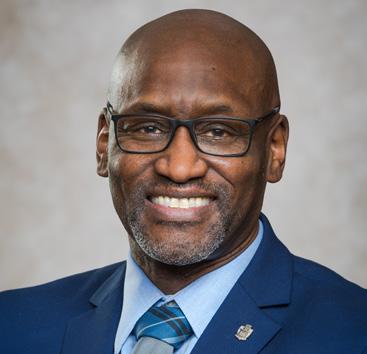
“At the University of Arkansas, preparing students for lifelong success is our top priority. You will learn from and work alongside world-renowned professors dedicated to unlocking your potential. You will also get to experience the full range of campus life at an SEC school, from receiving free academic support services at our Student Success Center, to making lifelong connections as a member of one our 380-plus student organizations, to calling the Hogs with 76,000 of your closest friends in Razorback Stadium. Come see why we are one of the best values in higher education, with an unbeatable combination of academic excellence, affordable tuition, record scholarship funding and outstanding post-graduation outcomes.”
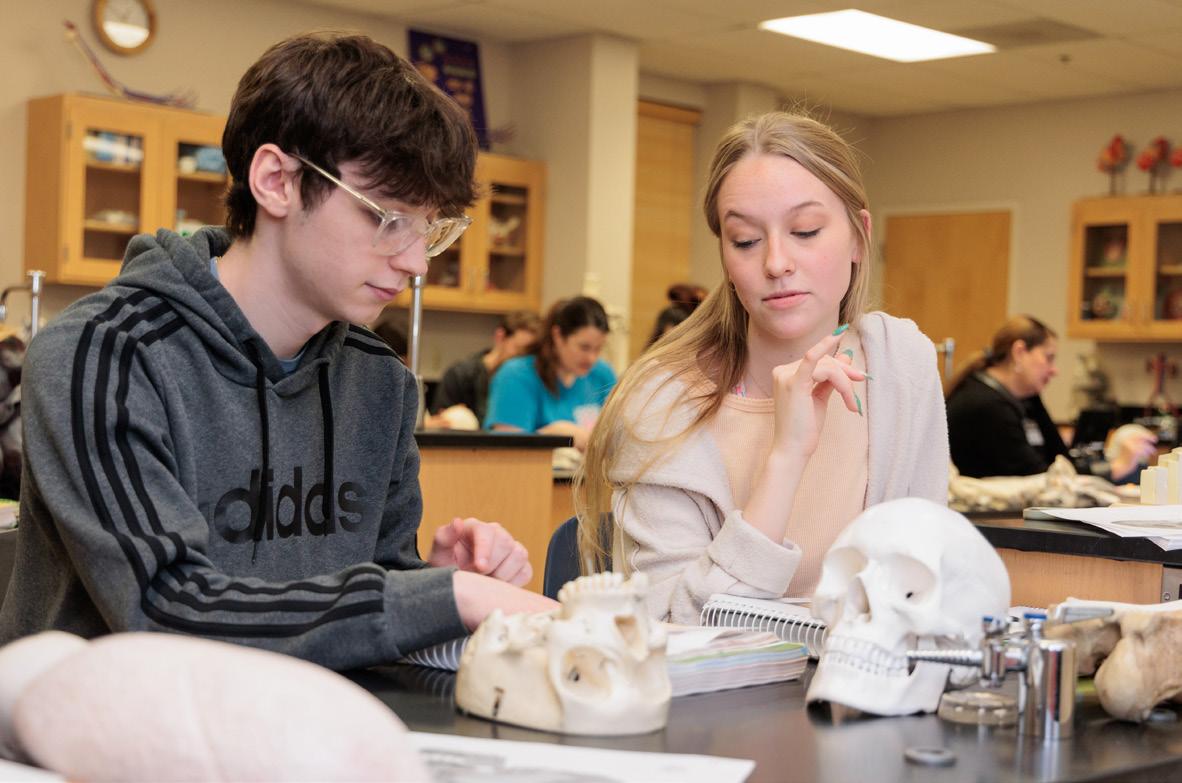
Did you know 100% of the University of Arkansas Community College at Batesville’s student body receives financial aid? Founded in 1975, UACCB enrolls about 1,100 students each year, providing vital education and training to students seeking higher learning in North-Central Arkansas.
This two-year college offers course in general education/transfer, nursing, business, health professions, STEM, industrial technology, early childhood education, agriculture technology, cosmetology, criminal justice, cybersecurity, EMT/paramedic, phlebotomy and welding among others. Tutoring is available, and there is a full-time counselor on campus thanks to an incredible partnership with White River Health.
UACCB has more than 35 scholarships available through the UACCB Foundation. A variety of these scholarships is available for nontraditional students, students pursuing a degree/certification in a specific field or based on a student’s grade point average. To find one that meets your needs, visit uaccb.edu/financial-aid.
UACCB also offers these tips for students on how to pay for college:
1. Take the ACT and/or Accuplacer; that score can get you immediate financial aid from UACCB — no additional application required. UACCB offers the Accuplacer on campus: uaccb.edu/ testing-services.
2. Complete the FAFSA and complete the SAMS application. These resources can help ensure you have a debt-free degree at UACCB.
3. Apply for UACCB Foundation scholarships; additional funding is available from various local organizations and community members: visit uaccb. edu/financial-aid.
UACCB greets its students with a flourish during Welcome Week at the beginning of each semester. There is free food, games and activities such as making your own commemorative tie-dye T-shirt. At Easter, there is a campus-wide egg hunt in which students find eggs filled with candy or certificates for prizes. At the end of spring, UACCB hosts GradFest, a fair-style event featuring carnival games, inflatables, ax throwing and free food.

The college is also undergoing a major renovation of the Main Campus Building to house its new Welcome Center. The Welcome Center will be the one-stop-shop for students needing to start UACCB, register for classes, get financial aid, receive career services and apply to graduate. Additionally, progress continues at the Gateway Center located near campus, which will feature a 100,000-square-foot building on 55 acres and serve as the future site of an expanded precision agriculture program along with other resources for the community.
“UACCB really gave me the opportunity to figure out what I wanted to do, while not putting myself or my parents into debt while trying to figure that out,” said Clara Keener of Batesville. “I didn’t have the highest GPA or the highest ACT score, so coming here and being able to bring my grades up higher than I even had in high school really helped me out and provided me with scholarships, and now I’m going to A-State in the fall.”
Jennifer Cano of Cave City, who recently earned an associate of science in business, certificate of proficiency in health professions, and technical certificates in health professions and general studies, said, “Staying here also allowed me to really look at my goals and analyze them and plan my time with my family, while not having to worry about expenses. They say you miss out on the full college experience at a community college, but I think I got the best experience. Being at a smaller campus allows you to connect more with your classmates and engage more than you would at a larger school.”
“Everyone is really willing to help the students,” Ryan Sinele of Batesville said. “You can tell people are there for more than just a paycheck — they know your name. It's not like you're at a big school and you're just another person walking around. It definitely feels like a family.”
At UACCB, students get to know faculty, staff and administration who are there to help. The college keeps students first in its decision-making and wants them to succeed.
“Get involved! I really like being involved on campus,” said Will Jones of Cave City. “I like being more than just a number and feel like I’m making a difference on campus.”
A large number of students at UACCB are first-generation, and so are the faculty and staff. UACCB understands what it is like for students to be the first in their family to attend college. As a first generation college student, the student will work with caring individuals who will work to help him or her and their support system better understand going to college. The college also has programs like TRIO Student Support Services, JAG College Success, Career Pathways and the First-Generation Club to further support students.
“You can work directly with faculty and your teachers, and there’s lots of financial aid and scholarships to help you,” said Haleigh Mohlke of Batesville, who is studying general education. “Campus life is really lively! Everyone wants you to succeed while you’re here and there are so many resources for UACCB students to take advantage of.”

“The University of Arkansas Community College at Batesville (UACCB) is dedicated to student success and well-being. We are known for our unwavering focus on student needs, and our dedicated faculty and staff consistently exceed expectations in providing personalized guidance and support. This dedication has not gone unnoticed, as the Aspen Institute has recognized the college as one of the Top 150 community colleges in the nation. At the heart of our mission lies a simple yet powerful purpose: to improve lives. UACCB empowers students to achieve their dreams and make a significant impact in North Central Arkansas.”
Brian
Shonk, EdD UACCB Chancellor

For almost 100 years, the University of Arkansas at Little Rock has been the anchor of higher education for nontraditional students. With more than 500 events on campus each year, there is always something to see, hear or do. In particular, Halloween is a big celebration with students and faculty handing out candy and participating in the annual costume contest.
“We also are the only school in the state to have a campus work program in addition to the federal work study program, helping you afford your education,” said Dr. Christina S. Drale, chancellor of UA Little Rock. “Our students can study abroad and learn about new cultures, new experiences and much more. We have a direct admissions partnership with Little Rock, North Little Rock and Pulaski County Special school districts, making it easier than ever to apply, and our housing options are incredible. Whether it’s suite-style, apartments or private rooms, there is something for everyone.”
UA Little Rock has a free scholarship matching tool that helps students access thousands of dollars in university and national scholarships, all free of charge, Scholarship Universe, which can be accessed at ualr.edu/ scholarships/scholarships-for-all-students. The school’s institutional work study program, Trojan Works, provides diverse work opportunities for students who need to meet their financial needs with additional employment. Offering on-campus jobs, year-round employment and flexible schedules to help with study-work-life balance, interested students can learn more at ualr.edu/trojanworks. Stackable credits at UA Little Rock offer students a flexible and cost-effective way to accumulate credits at their own pace, building toward a degree or certification. This approach ensures that students and families can manage their educational journey more effectively, making higher education more accessible and adaptable to their needs. For more information on concurrent credits and how they help students and families, visit ualr. edu/earlycredit.
UA Little Rock provides holistic student support, ensuring each individual succeeds academically, personally and professionally. This comprehensive approach includes personalized advising, counseling services and academic support tailored to meet the diverse needs of the student body. The university’s commitment to the well-being of every student ensures that they not only graduate,

but also develop the skills and confidence needed to positively impact their communities.
A few of the services UA Little Rock provides first-generation college students include the learning commons, which provide a collaborative space where students can access tutoring, mentors, study resources and academic assistance to excel in their courses. Childcare Vouchers, which are made possible by a grant, help student-parents balance academic commitments with family responsibilities, and the career closet provides professional attire for students for job interviews and career fairs, helping them make a strong impression on potential employers.
University Career Services provides career guidance, internship placements and job search resources to prepare students for successful careers. Additionally, UA Little Rock provides funding for some internships, helping remove financial barriers and ensure all students can gain valuable experience. Students also can gain work experience through Trojan Works, which offers year-round, on-campus employment opportunities. This allows students to gain valuable work experience while earning money to support their education.
For students who may not be able to stretch their budgets to meet all their needs. UA Little Rock has the Trojan Food Pantry to ensure no student goes hungry. It provides nutritious food and reduces food insecurity on campus, ensuring students can keep their minds on learning instead of hunger. Each academic college at UA Little Rock has a social worker available to provide personalized support for students. As the needs of students are vastly different, this approach ensures students receive just-in-time support.
In addition, UA Little Rock offers an online student orientation program, which helps online students acclimate to the virtual learning environment and helps them become familiar with university e-learning tools. Lactation rooms offer private and comfortable space for nursing mothers, supporting the needs of student-parents, and campus recreation supports students’ mental well-being by encouraging students to stay active, manage stress and maintain a balanced lifestyle through a wide variety of activities.
The Trojans finished second in the PAC-12 team competition, with student-athletes Nasir Bradley, Joseph Bianchi and Stephen Little winning individual conference championships. The Trojans qualified five wrestlers for the NCAA Championships, where the team recorded a remarkable 19th-place national finish, in just their fifth
year as a program. In fact, UA Little Rock won the Ohio Valley’s Commissioner’s Cup, meaning the school has the best sports in the OVC.
COMPREHENSIVE
At UA Little Rock, students benefit from a rich and comprehensive educational experience that emphasizes academic excellence. The university fosters a welcoming campus culture, where students from all backgrounds can thrive, learn from each other and engage in meaningful dialogues that prepare them for a globalized world. Plus, with more than 500 events each year, it’s easy to get connected and experience all college has to offer. UA Little Rock offers students unparalleled access to internships, job opportunities and professional networks. Through unique partnerships with local businesses, government agencies and non-profit organizations, students gain valuable work experience and build professional connections that are crucial for their future careers.

“As a metropolitan research university in Arkansas’s largest city, UA Little Rock capitalizes on its location to develop partnerships in every key economic sector and builds those connections into the student experience. Students will find a wide variety of internship, field work, clinical practice and client-based project opportunities that bring what they learn in the classroom to life. By offering a large number of merit- and need-based scholarships, we provide access to an affordable, quality education for a diverse student body. UA Little Rock is more than its location; it’s a place where you can find your unique sense of belonging and realize your full potential.”
Dr. Christina S. Drale University of Arkansas at Little Rock Little
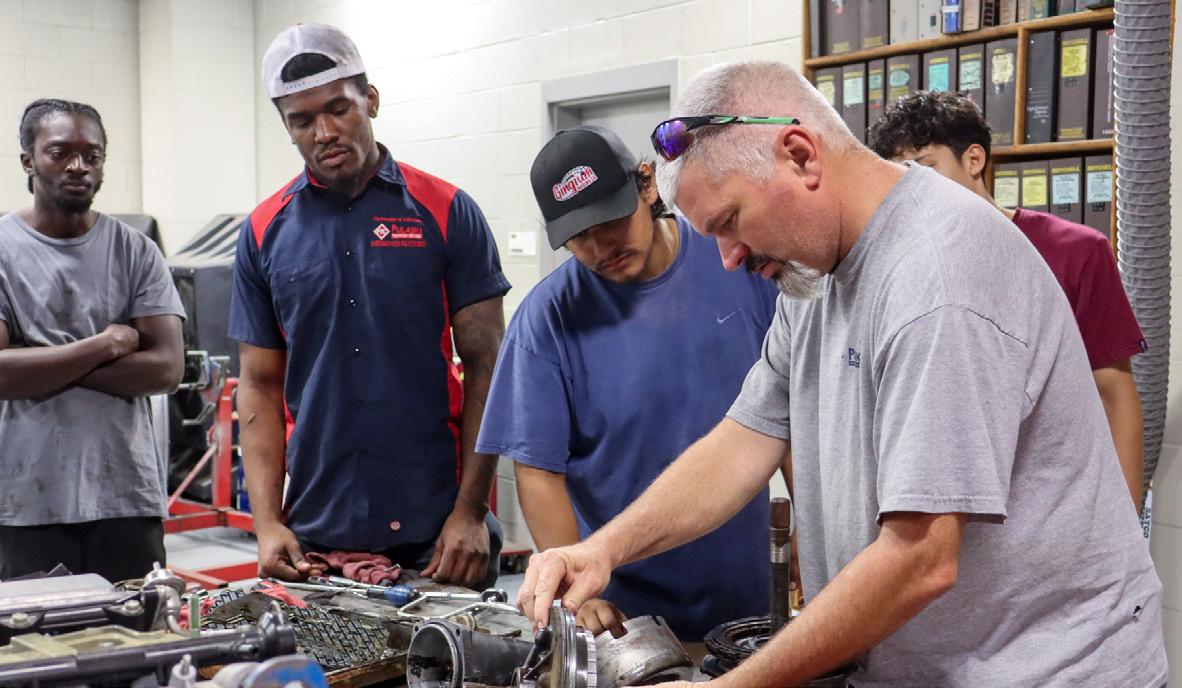
Founded in 1945, Pulaski Technical College in North Little Rock, offers numerous associates of applied science degrees and certificate options that graduates can take directly to the work force. Allied health and human services programs include nursing, dental assisting, respiratory therapy, radiography, health information technology and many more. UA-PTC’s business and information technology division trains future entrepreneurs, accountants, managers, computer programmers and cyber security professionals, while the UA-PTC Culinary Arts and Hospitality Management Institute boasts facilities and instruction on par with the best in the country for aspiring chefs and hospitality professionals. Graduates of the college’s technical sciences areas are highly sought-after professionals in fields such as welding, automotive technology, HVAC, advanced manufacturing, aerospace technology and more.
Now known as the Diamond Dogs, UA-PTC provides tutoring and financial aid with 90% of its students receiving monetary assistance. Among the scholarships available are the Simmons First National Bank Endowed Scholarship, which is given to a full-time, second-year student with a minimum GPA of 3.0 pursuing an associate’s degree and is the head of a low to moderate income household. The Ted and Betty Williams Charitable Trust Scholarship is for an enrolled student in a technical/industrial degree program with a minimum 3.0 GPA who shows leadership as determined by campus/community involvement. The P.G. and Melanie Bradford Endowed Scholarship is for an enrolled student in a degree or certificate program in any one of the following areas: health, education or human services, business and information technology, culinary arts and hospitality management or technical and industrial. Combined with the low cost of tuition at UA-PTC and a Pell Grant, the cost of attendance at UA-PTC is negligible. Add state scholarships like the Arkansas Challenge grant, and a UA-PTC student can receive money for living expenses after paying all attendance costs. For more information on financial assistance, visit uaptc.edu/foundation/scholarships.
UA-PTC serves the educational needs of Pulaski, Saline, Faulkner, Lonoke and surrounding counties in Central Arkansas by delivering high-quality technical programs, university-based transfer programs and specialized programs for business and industry. The college’s mission is to provide access to high-quality education that promotes
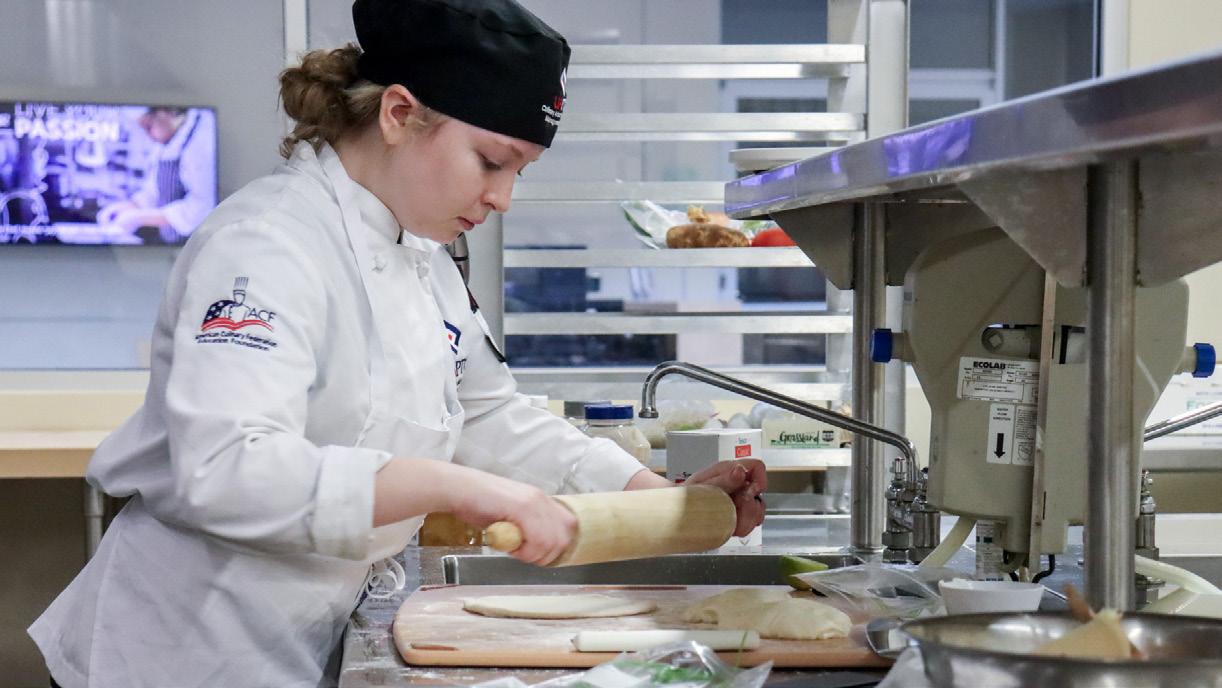
student learning and enables individuals to develop to their fullest potential. Its vision aspires to be the flagship two-year institution in the region to develop life-long learners, prepare excellent employees for careers, foster innovation in advanced technologies, and contribute to the economic and civic development of communities.
“We keep students at the center of all we do,” said Dr. Summer DeProw, chancellor of UA-PTC. “We commit to life-long learning that enhances individual, community and economic development while promoting and acts with honesty and principles.”
As part of this commitment to its students, UA-PTC offers mental health counseling services at no cost to students. The college also hosts panel discussions with thought leaders several times a year, such as the Rev. Dr. Martin Luther King Jr. panel discussion on inequity in mental health featuring Elizabeth Eckford and Minnijean Brown Trickey of the Little Rock Nine. Held in January 2024, the discussion was on the topic of inequity in mental health and honored the life and legacy of Dr. King.
The University of Arkansas-Pulaski Technical College is an integral part of the Arkansas Technical and Community College System maintained by the state of Arkansas. The college is governed by the University of Arkansas System Board of Trustees and a seven-member Board of Visitors, appointed by the governor, and derives its support largely from student tuition and fees and legislative appropriations.
UA-PTC began in October 1945 when it was established as the Little Rock Vocational School under the supervision of the Little Rock Public Schools. In October 1969, administration of the school was transferred to the Arkansas Board of Vocational Education and the school was named Pulaski Vocational Technical School.
Early in the 1970s, 137 acres declared surplus by the Veterans Administration were transferred to the North Little Rock School District and Pulaski Vocational Technical School was given 40 acres for a new school site. Pulaski Vo-Tech moved from 14th and Scott streets in Little Rock to its current location in January 1976.
When the Arkansas General Assembly created the Arkansas Technical and Community College System in 1991, Pulaski Technical College was created along with 12 other technical colleges under the coordination of the Arkansas Board of Higher Education. In 2017, the college formally joined the University of Arkansas System. Today, UA-PTC is a comprehensive two-year college offers associate degree and certificate programs for students who
plan to transfer to four-year colleges and universities and/or for career preparation and advancement.
WHAT STUDENTS SAY ABOUT UA-PTC
“I chose UA-PTC to adapt to adult responsibilities,” said Destiny Mbuthia, a student from Benton, pursuing an associate’s degree in liberal arts and sciences. “After high school, I lacked the discipline and preparation to live independently. I believed UA-PTC was the best choice to develop these strengths and a smooth transition to a four-year institution.
“I have enjoyed the endless opportunities for growth at UA-PTC. Whether financially, educationally or socially, UA-PTC supports its community and especially students with ambition. My advice to incoming firstyear students is to build connections with faculty members and fellow students. This will help you engage in activities, succeed in classes and learn more about your institution.”
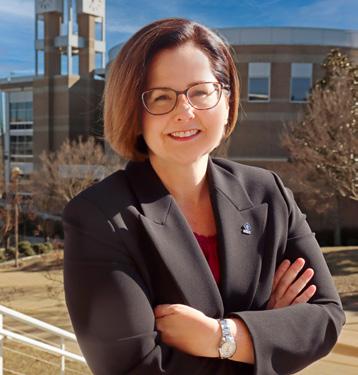
CHANCELLOR’S MESSAGE
“As a leader in higher education, the University of Arkansas-Pulaski Technical College is a student-focused institution that serves Arkansas and, the region. Employers look to us for qualified employees and students look to us for enhanced employability and earning power. UA-Pulaski Technical College offers relevant education that leads to sustainable careers and foundational education for transfer programs to four-year institutions. We work closely with employers to ensure that the education we offer prepares our graduates for the jobs available in the region today and we provide the skills necessary to adapt to an ever-changing environment. Today’s students need affordability, mentoring and excellent instruction, and they need to see a return on their investment. UA-Pulaski Technical College is meeting this challenge.”
Dr. Summer DeProw
UA-Pulaski Technical College
Dr. Summer DeProw UA-Pulaski Technical College
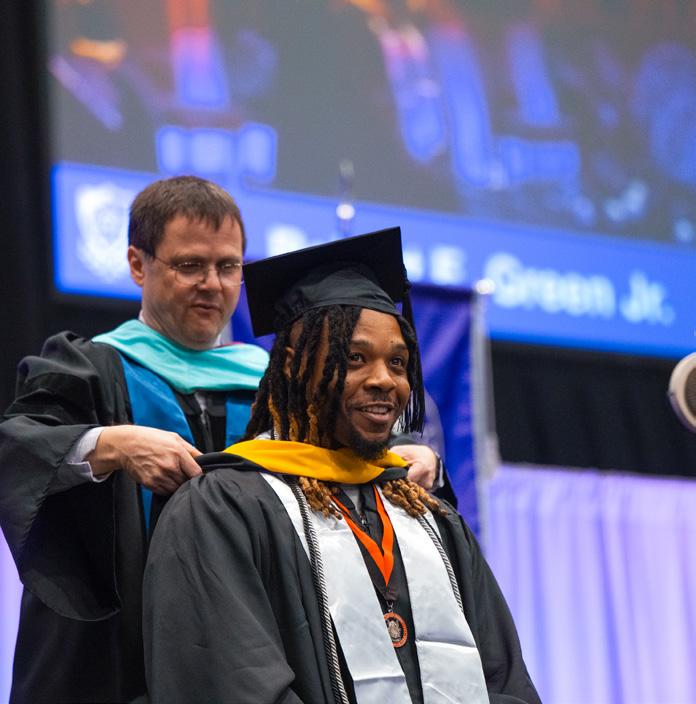
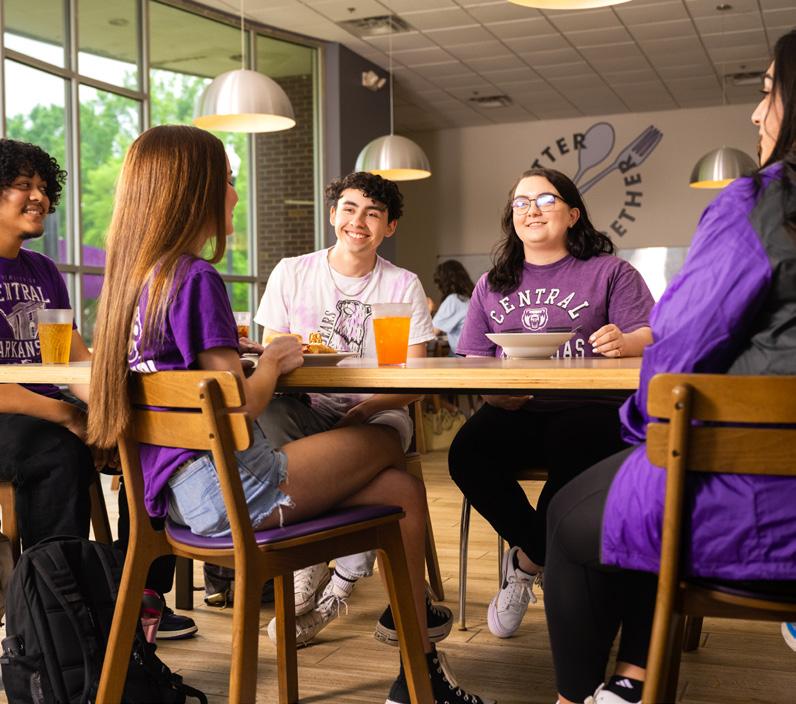
Founded in 1907, the University of Central Arkansas in Conway has 80% of its students attending college with the help of financial aid. In fact, $110 million in financial assistance is provided annually to support education expenses. Among this assistance is the UCA Commitment, a groundbreaking, debtfree pathway for tuition and fees for incoming Arkansas first-year students with an annual household income of $100,000 or less. Students will automatically be considered for UCA Commitment pending admission to UCA, a submitted Free Application for Federal Student Aid (FAFSA), and completion of an Arkansas Academic Challenge application.
Freshman Academic Scholarships are given to students who are fully admitted to UCA and meet the following criteria: submit required documentation to the Office of Admissions and Enrollment Services; meet cumulative GPA requirement based on the student’s sixth or seventh semester high school transcript:
• Distinguished 3.00
• Future Leaders 3.50
• University 3.75
• Achievement 4.00
A limited number of Distinguished awards are available through a competitive review process.
Factors including but not limited to GPA, ACT/SAT score, school/volunteer activities and community services are considered in determining recipients.
Current and admitted UCA students are eligible for scholarships from the UCA Foundation. The university has scholarships for entering first-year, undergraduate and graduate level students. Scholarship criteria vary with grade level, major, GPA and other factors. All students are encouraged to apply for UCA Foundation scholarships every year.
UCA provides a wide range of mental health services, including consultations, to currently enrolled UCA students and conducts educational programs for student organizations, classes, UCA departments and the community, upon request. Accredited by the International Association of Counseling Services, UCA understands how the stressors of entering college can affect a student’s outlook. In addition to mental health, UCA also provides a wide range of medical services to our students, faculty and staff, including general family practice services, laboratory, X-rays, immunizations, procedures, women’s health services and free influenza shots for students.
The Windgate Center for Fine and Performing Arts on UCA’s campus offers central Arkansas arts patrons a unique opportunity to experience visual art, theater and
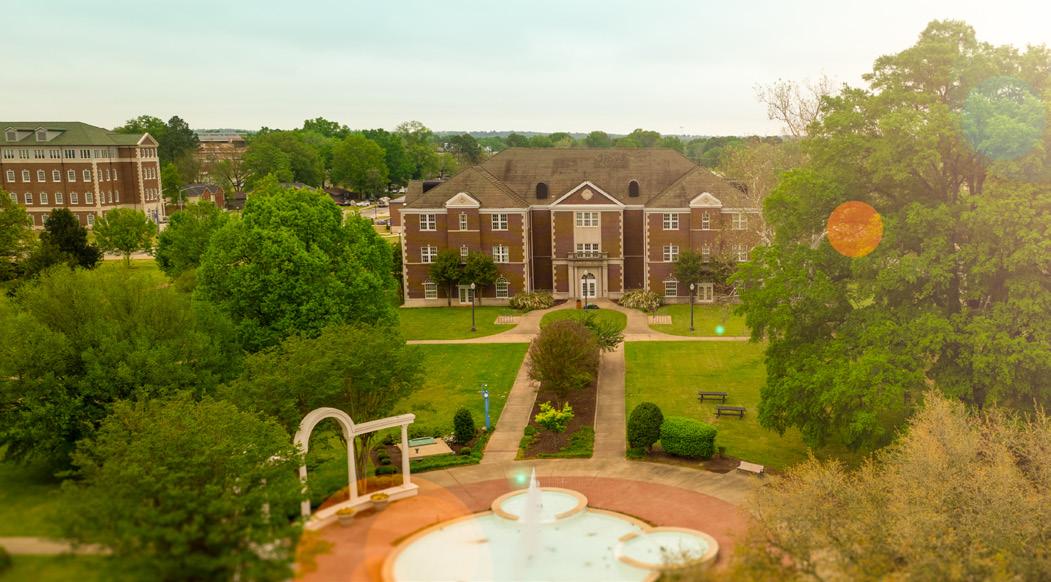
music all under the same roof. The innovative design allows our students and faculty to foster new collaborative partnerships across multiple academic disciplines. In addition to providing much-needed class, studio, rehearsal and performance spaces, the center further establishes UCA as a leader in the arts and a destination for exceptional cultural experiences for future generations.
UCA’s Aviation Academy is a highly certified pilot training program in which student pilots obtain the knowledge, skill and aeronautical experience necessary to meet the requirements for pilot certification through training provided by Central Flying Academy, under their FAA-approved Part 141 certificated training programs. Licensure options include private pilot license, instrument rating and commercial pilot license. The academy, located at Conway Regional Airport, is a new facility on an uncontrolled field, therefore there is no FAA control tower. Instruction includes ground school, which provides preparation for written tests for each of the three licenses/ratings offered; dual or solo flight training — without or with an instructor, as required for licenses or ratings; and first solo flights, which can be completed in training (when signed off by the instructor, typically 10 hours of flight time).
The Arkansas Coding Academy began in 2016 to address the skilled information technology worker gap. This academy provides market-driven technical training, taught by industry experts, to help individuals find new careers. Arkansas Coding Academy provides expert-led, in-demand technology training to fuel a diverse, career-ready workforce in Arkansas.
“The most important lesson I learned at UCA was how to be independent,” said Victoria Fountain, UCA graduate with a Bachelor of Science degree in nutrition. “My time there helped me grow into a confident young woman, ready to tackle the challenges of my career and life.”
UCA is a Division 1 athletics school in the United Athletic and Atlantic Sun conferences. With 11 men’s and eight women’s sports, the Bears and Lady Bears consistently earn athletic achievements, including academic honors, ASUN awards and all-conference, superlative and ALL-ASUN awards.
One UCA football player, defensive end David Walker, was named the conference Defensive Player of the Year for the second consecutive season from the
UAC. Walker led the UAC in tackles for loss and sacks with 18.0 and 8.5, respectively. He was eighth in the nation at the FCS level in tackles for loss and 20th in the nation in sacks. Walker finished the season with 57 total tackles, including 33 solo stops. He broke the school record for single-game tackles for loss with 6.5 against Tarleton State, a game in which he had a season-high 13 tackles. Six-time All-American, Walker was a finalist for the Buck Buchanan Award last season, which goes to the top defensive player in the FCS.
Freshman Tucker Anderson was named the Atlantic Sun Conference Freshman of the Year in basketball, shooting 38.1% from three-point range and 81.3% from the free-throw line. He averaged 3.7 rebounds and 1.4 assists per game and added 27 steals and 14 blocked shots. Anderson scored in double figures 23 times, with a high of 26 points at Lipscomb.
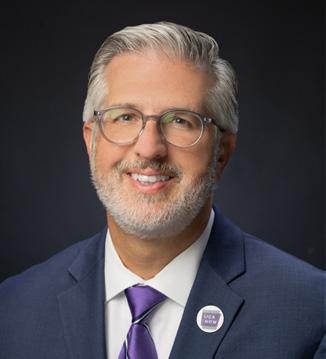
“On behalf of the students, faculty and staff, we welcome you to the University of Central Arkansas. UCA offers students the complete college experience, including excellent academic programs, positive student life experiences, the opportunity for significant campus involvement, community service opportunities and Division I athletics. While attending UCA, you will be exposed to a world of knowledge, experiences and opportunities that will shape and change your future.
UCA offers 84 undergraduate certificate and degree programs, 10 graduate certificates, 31 master’s degree programs, 10 post-master’s programs, and six doctoral programs. UCA’s honors college program was the first in Arkansas, and five residential colleges offer a living/learning environment. UCA also boasts a top-notch Division I athletic program and has the student services infrastructure that offers students the opportunity to grow in leadership and service. The Public Appearances series offers renowned speakers, musicians and stellar Broadway performances. Take a look at UCA’s programs by starting at the “Academics” link on the UCA home page to obtain information about UCA’s academics, tuition, housing and other areas of interest. Visit the campus and talk to students attending UCA to learn what UCA can offer.”
Dr. Houston Davis University of Central Arkansas
Educating future generations of health care professionals is the mission of Arkansas Colleges of Health Education. Situated on 542 acres, the campus features two award-winning facilities that house state-of-the-art learning environments while creating spaces for graduate-level students and community members to engage in healthy living.
Doctor of Osteopathic Medicine (DO) A four-year doctor degree, mission-driven to educate and train compassionate osteopathic physicians through excellence in teaching, research, service and scholarly activity.
Doctor of Physical Therapy (DPT) A three-year, entry-level doctoral program focused on training
successful physical therapists through hands-on, clinical experiences taught by the nation’s top PT faculty and employing brand-new equipment powered by cutting-edge technology.
Doctor of Occupational Therapy (OTD) Students are trained in learning spaces such as Live and Learn, Pediatrics, and Splinting/Modality, labs that feature “real world” practice over their three years in the program.
Master of Science in Biomedicine (MSB) This oneyear, 30-credit-hour program provides students with sufficient academic rigor in biomedical sciences to prepare students aspiring for a career in the medical and health professions.
Master of Public Health (MPH) This two-year program will develop diverse and skilled public health professionals who champion equitable access and promote the health and well-being of populations to strengthen communities.
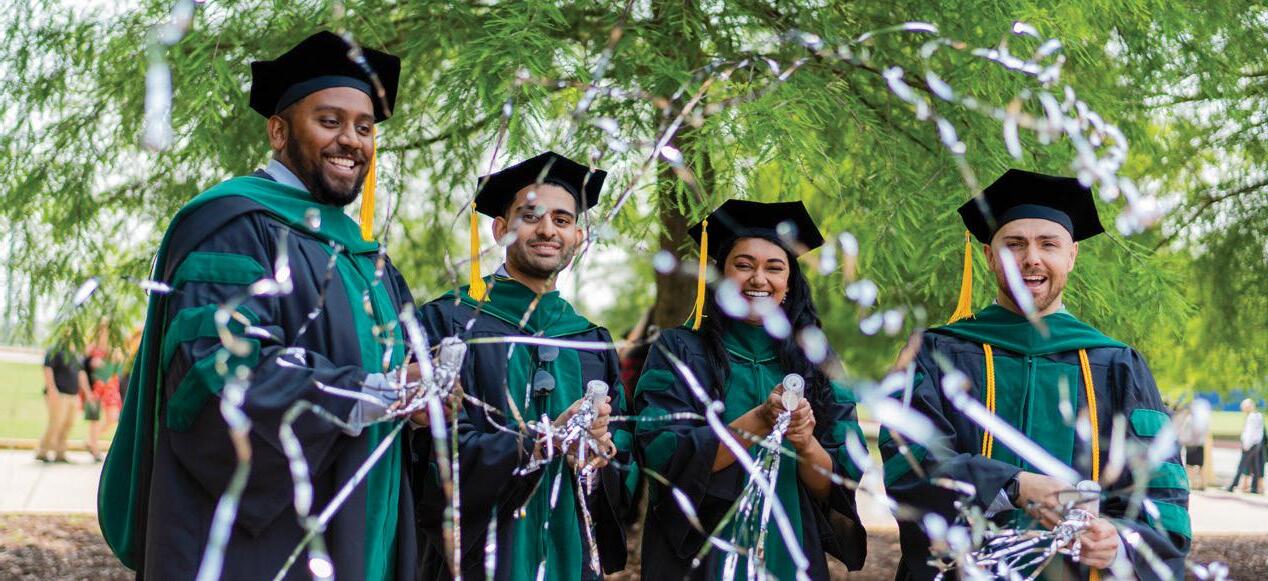
Arkansas State University Three Rivers is a public, two-year college committed to providing comprehensive, accessible and high-quality education. Deeply rooted in its culturally and economically diverse community, with a remarkable 99.7% in-state enrollment, ASUTR offers more than 50 programs in academic, career and technical disciplines tailored to meet workforce demands.
Affordability is a cornerstone of the Three Rivers experience. In-state tuition and fees come to just $3,658 annually, making higher education attainable for a wide range of students. Coupled with the fact that 89% of students receive financial
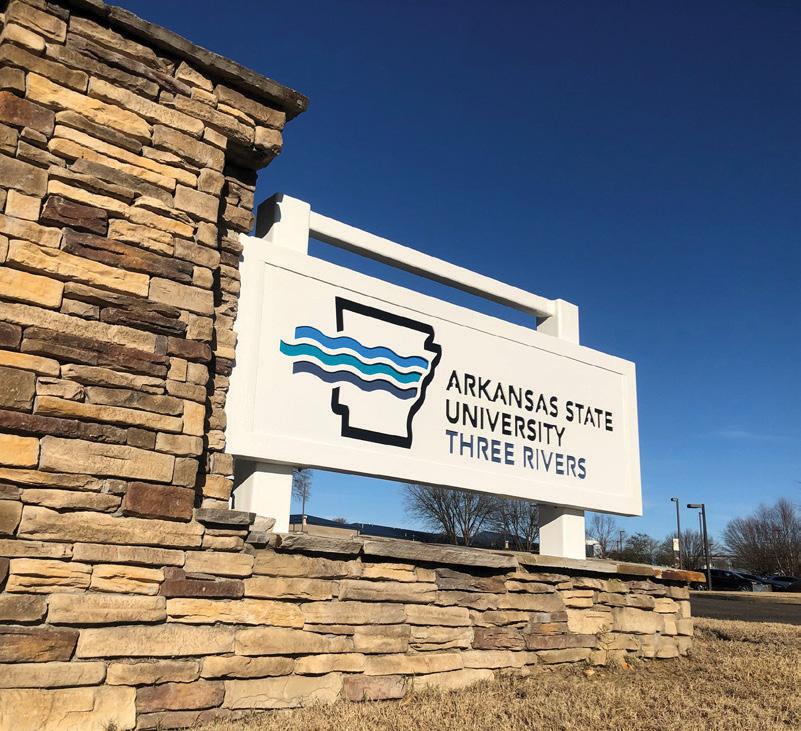
Students have the opportunity to model healthy behaviors by taking advantage of on-campus amenities. ACHE offers two on-campus housing options, which include restaurants, shops and amenities like a swimming pool,
fitness center, basketball court, dog park and entertainment pavilions. The ACHE campus itself includes Celebration Garden & Wellness Park, an 8-acre park that features walking trails, lake, playground, labyrinth and more.

“Arkansas College of Health Education (ACHE) is changing the direction of health care in Arkansas and beyond through the power of education. Whether you pursue becoming a physician, physical therapist, occupational therapist, achieve a master in biomedical science or graduate from our forthcoming master of public health program, ACHE is ready to make your dream a reality. Our mission to educate and train a diverse group of highly competent and compassionate health care professionals to improve the lives of others is the driving force behind the outstanding faculty and staff that make up ACHE.”
Kyle D. Parker, Arkansas Colleges Of Health Education
aid, Three Rivers demonstrates its dedication to student success beyond the classroom and across three campus locations in Hot Spring, Clark and Grant counties.
Resolute, Remarkable, and Relevant
With a focus on practical education, Three Rivers offers programs in high-demand fields like nursing, welding and mechatronics. These programs equip graduates with the skills needed to secure wellpaying jobs. In fact, Three Rivers alumni boast an impressive average starting salary of $47,047, the highest among all AA/AAS graduates statewide.
Beyond academics, Three Rivers cultivates a vibrant campus life through clubs, organizations and intramural sports. In fact, the Eagles baseball team just completed their first year and will soon begin their first conference season for 2024-25. The college also provides essential support services, including tutoring and counseling, to help students reach their full potential.
Whether you’re pursuing an associate degree as a stepping stone to a bachelor’s or entering the workforce directly, ASU Three Rivers offers the foundation for a successful future. The college’s strong connection to the community, coupled with its affordable tuition and career-focused programs, make it an excellent choice for students seeking a quality education and promising career opportunities.
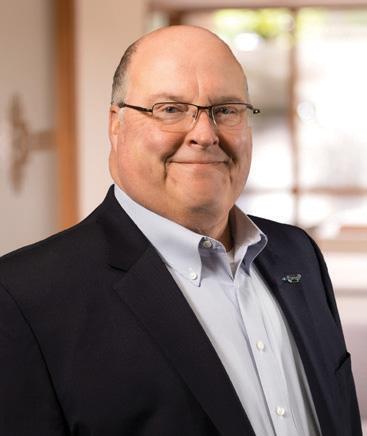
“Arkansas State University Three Rivers is committed to improving the lives of the residents in our communities we serve. For 54-plus years, the college has been committed to making a positive difference in people’s lives. ASU Three Rivers ensures you have the opportunity to achieve your educational goals by providing programs and services designed for our students who plan to seek immediate employment, transition to a new career, or earn a four-year degree. Visit us at One College Circle in Malvern or at www.asutr.edu. At ASUTR, you will discover a Higher Degree of You!”
Dr. Steve Rook, Arkansas State University Three Rivers
For 100 years, Harding University in Searcy, has been transforming learners for global impact by engaging minds and nurturing faith within a deeply connected community. As a four-year Christian college, Harding began as a senior college in 1924, when two junior colleges, Arkansas Christian College and Harper College, merged their facilities and assets, adopted the new name of Harding College, and located on the campus of Arkansas Christian in Morrilton. In 1934 Harding moved to Searcy, becoming a university in 1979. It has always, at its core, been a Christian university.
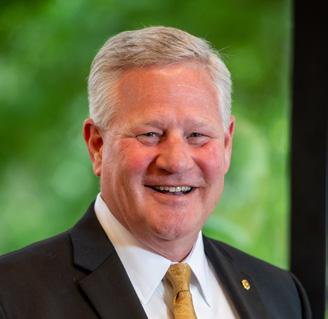
“The quest for inspired purpose is anchored in our historic Christian mission. The essence of the Harding experience extends beyond career preparation. In this search for meaning and vision, we discover our values, convictions and direction. We aspire to restore the world to what God intended from the beginning.
At Harding, you will have many opportunities to serve your neighbors. Whether you’re providing services to a child through our speech clinic, interning in a local classroom or learning important health care skills in our local hospital, you’ll discover where your passion and education meet. That is your inspired purpose.”
Dr. Michael Williams
Known as Arkansas’s Ivy League college, Hendrix College in Conway was founded in 1876 and offers students an environment that fosters long-lasting connections with their classmates and professors. Students benefit from engaged learning experiences throughout their time at Hendrix, including opportunities for undergraduate research, travel, service and internships that connect the classroom with the world. The focus on “cultivating empathy, creativity, selfunderstanding, rigorous inquiry, informed deliberation and active learning,” to borrow a phrase from the college’s Statement of Purpose, means Hendrix is about far more than accumulating enough credits to graduate. The Hendrix motto, "Unto the Whole Person," resonates with students, faculty and staff alike.
A survey of recent graduating classes found nearly 100% of respondents were employed, whether in traditional work environments or in graduate/ professional programs. The class of 2021 reported 68% were employed full time and 32% in graduate or professional school while the class of 2023 reported 68% employed, most full time, with 30% in graduate or professional school. According to the 2023 survey, the median annual income of alumni who graduated
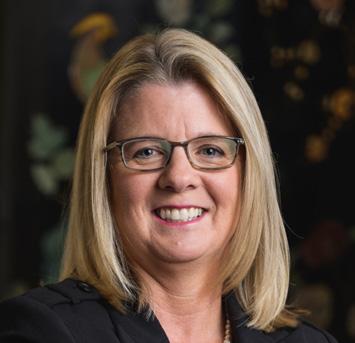
“The character, example and concerns of Jesus Christ are the standards that shape us and chart the course for our future,” said Dr. Michael D. Williams, president and alumnus of Harding University. “Because of this, an allencompassing love for God and a corresponding love for people are at the heart of who we are.”
Harding has been acquiring exemplary achievements, including being named one of The Wall Street Journal’s 2024 Best Colleges in the U.S., ranked among the Best Colleges in America by Money, Best Christian University in 2022-23 by EdSmart, a 2024 Best Regional College by the Princeton Review, and a 2024-25 College of Distinction. With a 16:1 studentfaculty ratio and an average class size of 22, students are mentored by distinguished faculty, 76% of whom hold terminal degrees.
“Harding was the first school in Arkansas to offer graduate programs in physician assistant, applied dietetics practice and architecture, and master’s entry to professional nursing,” Williams said. “Within six months of graduation, 88% of graduates recognize professional outcomes, and with an 87% retention rate and five academic all-Americans on the NCAA Division II national champion football team, our students excel both in and out of the classroom.”
As one of only six presidents in the university’s history, Williams understands how the university encourages students to be their best. In fact, more than 350 students study abroad each year at one of six international locations: Australasia, Europe, Greece, Italy, Latin America and Zambia, and of the major campus events, March’s Spring Sing sees clubs compete during judged performances to determine winners in four individual categories and the John H. Ryan Sweepstakes Award. Based on performance, the prize money is awarded
less than 10 years ago is between $50,000 and $74,999, and more than 25% of these recent Hendrix graduates report making more than $75,000 per year. Hendrix offers job placement and employment services as well as off-campus internships, and the college is one of the top-ranked in the South for students who obtain advanced degrees in psychology and in computer science. Among more than 170 private liberal arts colleges in the nation, Hendrix ranks ninth for psychology and 16th for computer science. Since 2018, the acceptance rate of Hendrix students applying to dental school is 73.3%, significantly higher than the national rate of 56%. The 2023-24 LSAT scores from Hendrix students considering law school averaged above the 75th percentile, and law school acceptance among applicants from the Hendrix class of 2024 is more than double the national average.
“I wanted to be educated by an institution that cares about my development inside and outside the classroom, and that also wants its students to have a positive impact on the surrounding community and society as a whole,” said Emma Riordan, a biochemistry and molecular biology major student from North Little Rock. “I found that at Hendrix. I love being part of a
“We are privileged to educate the young people upon whose shoulders the responsibility for our future rests, and I am dedicated to strengthening and preserving the residential liberal arts experience because it is the best preparation for life in a free society. Our commitment to the liberal arts allows Hendrix to honor the traditions that brought us to this moment while adapting to the challenges of the 21st century, always staying centered on our life-changing mission to inspire students to lead lives of accomplishment, integrity, service and joy.”
Dr. Karen K. Petersen, Hendrix College
to the charity of the winners’ choice, resulting in nearly $7,000 being given each year.
“Harding is a close-knit community where everyone's looking out for one another,” said Rachel McCrae, an exercise science major from Blackburn, United Kingdom. “You develop a lot of close relationships, especially with your teachers. You don't get that in a lot of other settings where you know your teachers. You're in a small classroom with them. You can ask them questions. If it were in big lecture halls, you wouldn't have that opportunity.”
Grant Countess, an information systems major from Shelbyville, Tennessee, agrees. “Harding students are very well known for being on top of their job and being reliable, for showing up and having a good work ethic as well as contributing to the community in a workspace,” he said. “We also have this vibrant social side of our campus, and there’s something about the social environment mixed with our education that I think makes a really powerful combination.”
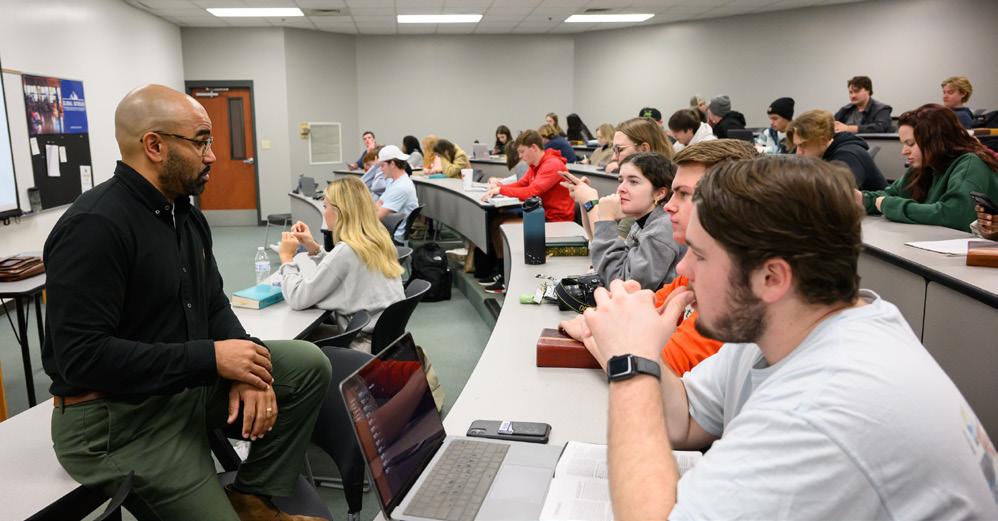
community that encourages you to grow through new experiences and is a place where people care about each other and want everyone to succeed.”
To say Hendrix College is a lifelong love is an understatement for many alumni. In fact, alumni and friends of the college can return to Hendrix permanently by reserving a columbarium niche in the memorial garden just outside Greene Chapel. During finals week, Hendrix College’s Bailey Library publishes a schedule of visits by therapy animals (mostly dogs, but also a few rescue kittens on occasion), and its staff also provides a “procrastination station” with studybreak activities, has mapped out a labyrinth that winds through the stacks, and offers cocoa and other treats for students.
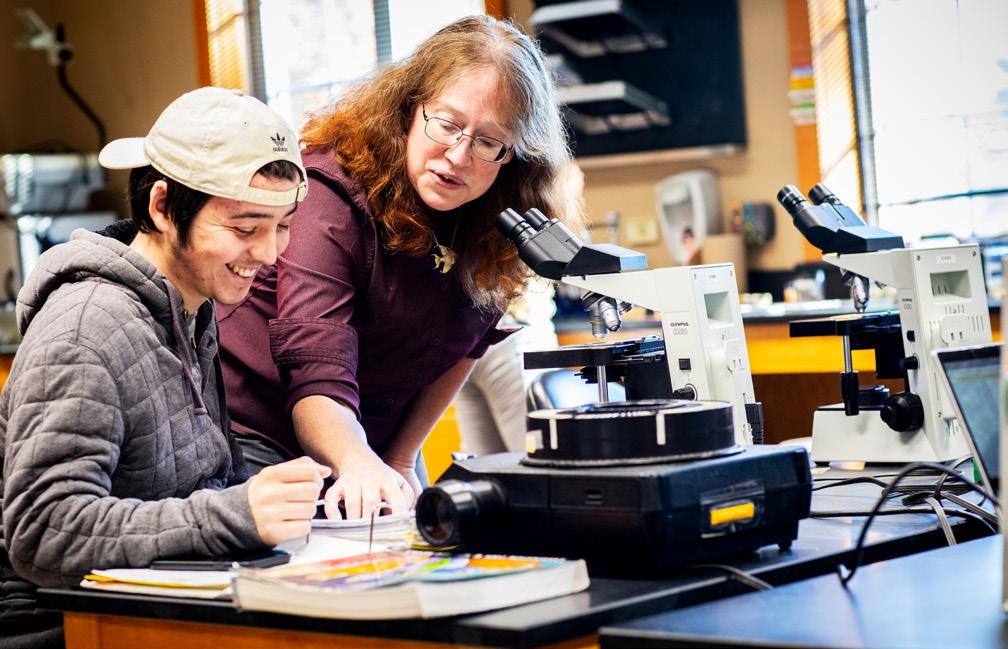
Founded in 1872, Lyon College is Arkansas’s oldest college still operating under its original charter in the state’s oldest city, Batesville. This four-year college, formerly known as Arkansas College, is steeped in Scottish heritage and tradition, so much so that it is considered the state’s most haunted campus.
During SCOT week, which is orientation for Lyon’s students, the entire campus community gathers at Bryan Lake for Raft Race to watch new students try to cross the lake in rafts made of cardboard and duct tape, which, as staff and alumni agree, is less of a race and more of a survival challenge as students tend to end up in the lake. The winners have their names engraved on a paddle plaque displayed in Edwards Commons student center.
Lyon College also hosts ScotsFest, the combined Arkansas Scottish Festival + Lyon College Homecoming, each fall, which is Independence County’s largest festival and one of the most widely recognized Scottish festivals in the United States. Lyon College bagpipers, drummers and Scottish dancers are involved in

teaching the Scottish arts to interested parties through the Scottish Heritage outreach program.
While maintaining its long-held customs, Lyon College is and always has been on the leading edge of equity in education. In fact, its first class of graduates in 1876 included three young women who became the state’s first females to receive the AB (bachelor’s) degree. In 1994, the college created the state’s only student-run honor system, and the Lyon Pledge is a loan repayment assistance program (LRAP) available to all new and incoming students who have two years remaining. It can help graduates repay their federal student, parent PLUS and private alternative loans if their income after graduation is below $44,000.
Today, Lyon College is making plans to open Arkansas’s first dental school and first veterinary school and is the only pet-friendly college in Arkansas. It also offers the Lyon Education and Adventure Program (LEAP) with opportunities for hiking, biking, paddling, camping, caving, rock climbing, fishing and hunting.
For those high school students who want to get an
“Lyon College has been educating students to be leaders and changemakers for over 150 years. Our strong liberal arts curriculum prepares students for post-graduate success in a wide variety of careers, including health care, business and education. With an expanded undergraduate curriculum, the first graduate programs at the Batesville campus, and two new professional schools in development in Central Arkansas, Lyon College continues to invite students to join us as we build a better world, starting in Arkansas.”
Dr. Melissa Taverner, Lyon College
Pine Bluff|870-543-5900|seark.edu
Southeast Arkansas College (SEARK) is committed to providing a complete college experience that’s within reach of every student. Located in Pine Bluff, SEARK is an independent two-year institution built to serve and strengthen the future of our community.
With over 50 programs of study across health professions, skilled trades, applied science and technology, and general education, SEARK has a path for every kind of learner. Whether you aim to transfer to a four-year institution with one of our 2+2 agreements or enter the workforce with valuable credentials, SEARK is here to set the foundation for your educational journey.
“When looking for different programs I saw that SEARK has a 100% pass rate for the national radiologic technologist registry exam and I knew this was the place for me.” said Tezra Collins, a 2024 graduate of the radiologic technology program. “You’re not just a number here, you’re somebody.”
At SEARK College, we understand the importance of balancing academic life with personal well-being, and we are committed to providing comprehensive support to ease your path. Regardless of whether you're a recent high school graduate or a busy parent juggling a full-time job, support services like TRIO, Tutoring Central and Career Pathways are accessible to help you thrive during your time here. Online learning options offer flexibility for working
students to attend classes on their own time, helping students reach their dreams of a better job and a brighter future.
“I decided to come to SEARK College because it is close to home and a smaller community,” said Kristen Moon, a 2024 graduate of the respiratory therapy program. “The teachers really know you and care about your success.”
•Over 84% of SEARK students receive some form of financial aid
•SEARK features six NJCAA sanctioned sports teams + Esports
•Student housing available
•Primarily 8-week course schedule
•More than 15 student clubs and organizations
•A minority serving institution at 67%
•Student body comprised of 43% full-time and 57% part-time students
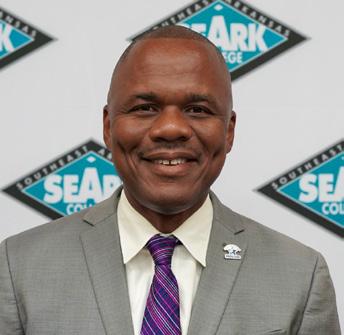
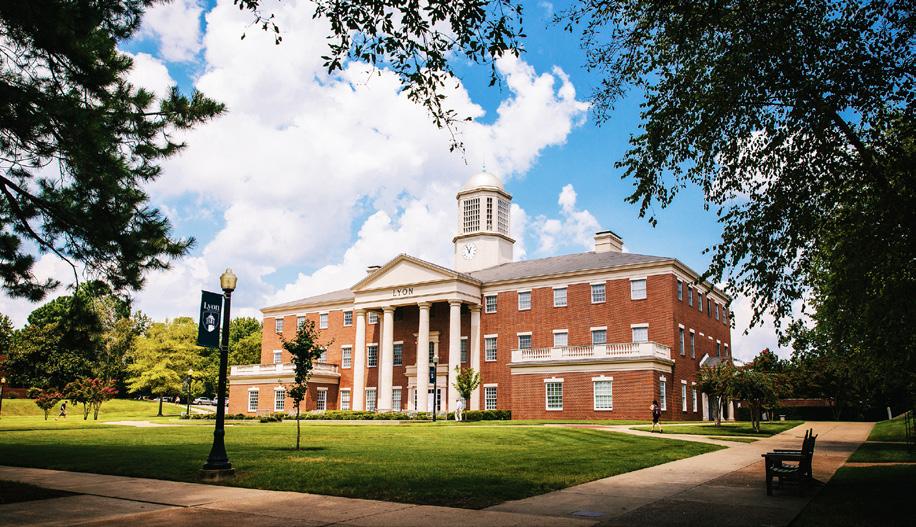
early start on their college career, Lyon College’s high school concurrent opportunity allows local high school rising juniors and seniors with a cumulative 3.25 high school GPA or 20 ACT composite score to enroll in up to five Lyon College courses (maximum of 20 total credit hours) at a reduced price per class (excluding lab and course fees) before they graduate from high school. Concurrent student prices apply to all Lyon fall, spring and summer courses, depending on availability and academic eligibility. To apply to the program, students need only inform the enrollment services office of their interest and submit non-degree-seeking applications along with qualifying transcripts and/or ACT scores.
For first-generation college students, the First-Year Advising Program supports first-year students pursuing a challenging liberal arts education by providing them with individualized, holistic guidance regarding curricular requirements, academic policies, student success practices and campus resources. This means the college tailors advising visits to reflect students’ needs and goals.
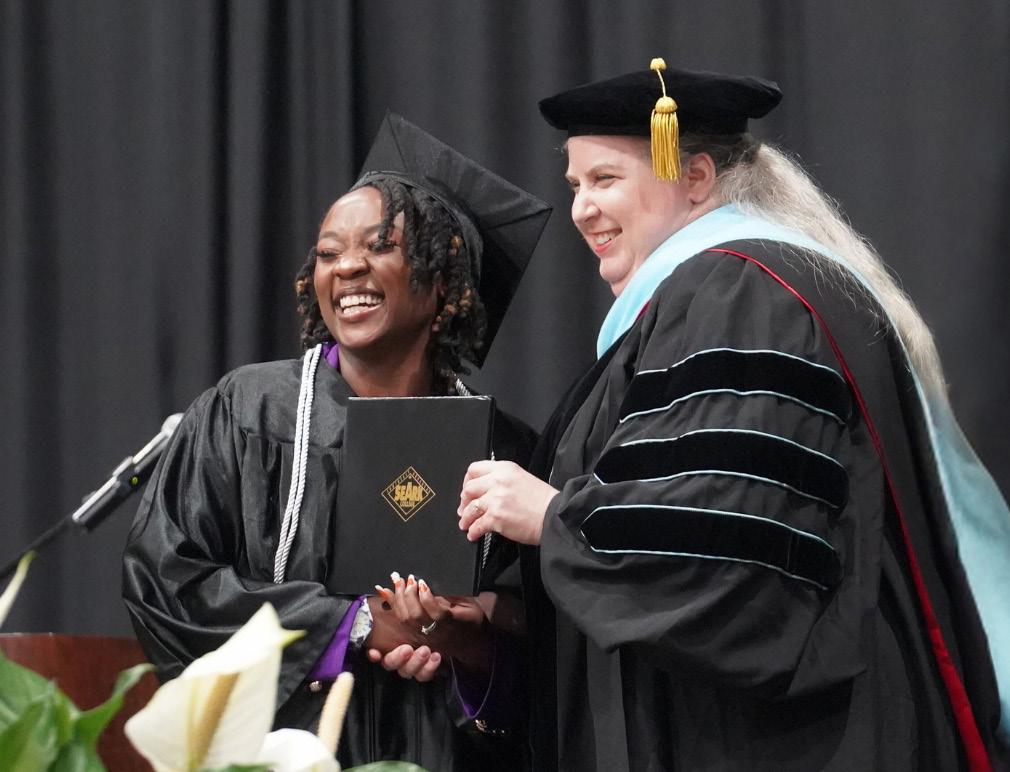
SEARK College was founded in 1959 as Arkansas Vocational-Technical School, then established as Pines Technical College in 1991 and renamed Southeast Arkansas College in 1998.
“At SEARK, we strive to make a positive impact by fostering personal and professional development through our educational programs. With a student-teacher ratio of 7-to-1, our dedicated faculty ensure student success both academically and beyond the classroom. Offering a wide range of programs across various fields, and at a significantly lower cost compared to public four-year institutions, SEARK College not only provides a path to a degree but also opportunities for growth, exploration and preparation for a successful future. Apply today and let us set the foundation for your success story!”

At UAPB, students have access to a wide range of undergraduate and graduate programs across diverse fields such as agriculture, business, education, engineering, art, and hospitality and tourism management. Its commitment to academic excellence is reflected in small class sizes, personalized attention from faculty, and state-of-the-art facilities. With a student-to-faculty, ratio of 15:1, UAPB ensures that students receive individualized guidance and support, ensuring an environment where they can thrive both academically and personally. Notably, in 2024 Money Magazine ranked UAPB among the top six universities in Arkansas for value, recognizing its dedication to providing a high-quality education at an affordable cost.
UAPB is at the forefront of research and innovation with numerous opportunities for students to engage in groundbreaking projects alongside faculty mentors. Its research initiatives span across various disciplines, addressing real-world challenges and contributing to advancements in science and technology. Students
are also encouraged to participate in internships, cooperative education programs, and study abroad experiences, equipping them with the skills and knowledge needed to succeed in a globalized world. New certificate programs, bachelor of science programs in cybersecurity, engineering and agriculture engineering, a Master of Business Administration and the only doctorate for aquaculture in Arkansas reflect a deep commitment to preparing students for the careers of tomorrow.
Life at UAPB extends beyond the classroom with a dynamic campus community. Students enjoy a wide range of extracurricular activities, including more than 100 student organizations, NCAA Division I athletics, and numerous cultural and social events held every year that enrich the campus experience and celebrate the rich heritage and diversity of its student body.
UAPB is committed to providing a nurturing and
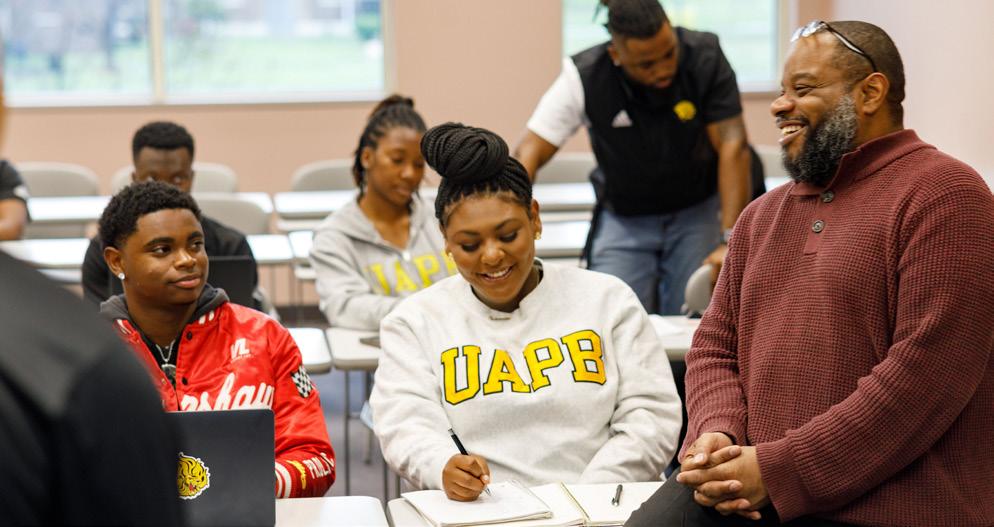
inclusive environment where every student feels valued and supported. Its comprehensive support services, including academic advising, career counseling, health and wellness programs and financial aid assistance, are designed to help students succeed at every step of their educational journey. Additionally, UAPB's strong network of alumni and industry connections opens doors to internships, job placements and mentorship opportunities.
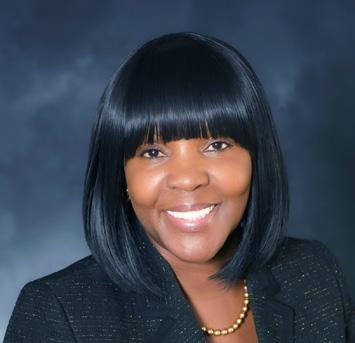
“The University of Arkansas at Pine Bluff is a place where tradition meets innovation and offers an exceptional combination of academic rigor, innovative research and a supportive community for students seeking a comprehensive college experience. As the second-oldest public university in Arkansas and the state’s only land-grant historically Black College or University — or HBCU — UAPB has a proud history of fostering academic excellence, cultural richness and community engagement since its founding in 1873. Prospective students and their families will find that UAPB is more than just a place of learning. It is a vibrant institution dedicated to empowering the next generation of leaders. ”
Dr. Andrea Stewart, UAPB
RODERICK L. SMOTHERS SR., PH.D. PRESIDENT AND CEO
PHILANDER
SMITH
DR. EVELYN E. JORGENSON
NORTHWEST ARKANSAS
DR. KEITH PINCHBACK PHILLIPS COMMUNITY COLLEGE OF
The University of Arkansas – Fort Smith is a regional public university in the Arkansas River Valley that brings transformational education to more than 5,000 students a year. By offering an enriching and empowering learning environment and hands-on experiences in and out of the classroom, UAFS empowers its students' social mobility and the River Valley's economic growth.
COMMUNITY COLLEGE
“While life as we have known it has been drastically altered in recent months, it remains true that Philander Smith College is a beacon of hope for those with a thirst for knowledge and big dreams of scholastic achievement. Our guiding principles of caring for our community, remaining student-centered and mission-focused, and executing in operational excellence are leading us in the new normal — providing the inspiration for our commitment to produce world-class graduates who are making a positive difference in the world. Through the lens of a global health pandemic in the midst of civil unrest in our country, and 144 years after its founding, Philander Smith — with its liberal arts curriculum and focus on social justice — has a steadfast position as an educational pillar for the next generation of leaders who desire to move us FORWARD into a healthier, more diverse and equitable future.”
DR. BEN R. SELLS
OUACHITA BAPTIST UNIVERSITY
UAFS professors are renowned for their expertise in more than 70 subject areas, including nursing, computer science, business administration, engineering, advanced manufacturing, music, graphic design and studio art. Students have the opportunity for in-field experience through internships and other programs, which helps them build their resumes while earning their degrees. These opportunities prepare graduates for personal and professional success.
“NorthWest Arkansas Community College seeks to empower lives, inspire learning and strengthen community through accessible, affordable, quality education at locations throughout Benton and Washington counties. We focus on providing what our learners need, whether that’s adult basic education, new job skills for today’s workplace, or the foundation to pursue a four-year degree and post-graduate study. NWACC creates an environment that inspires students and encourages them to maximize their potential.”
Each year, hundreds of UAFS students conduct advanced-level research on microplastics in Arkansas waterways, periodontal disease in Arkansas children, and economic improvements in the River Valley, to name a few topics.
UAFS students have access to the acclaimed Babb Center for Career Services, which pairs students with
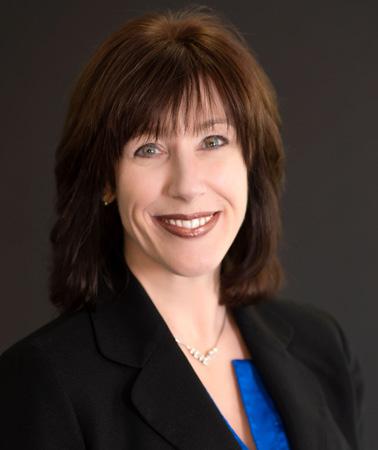
“I am very excited about the upcoming year and the great things that it will bring to Phillips Community College of the University of Arkansas and to you! In today’s fast-paced world, change has become one of the most important factors in our lives. With new programs and ongoing improvements to our facilities, we are committed to preparing you for active participation in an ever-changing economy with training and skills that will benefit you for a lifetime. PCCUA is the oldest community college in Arkansas, which means we have more experience doing what we do than any other community college in the state. Our three locations in DeWitt, Helena, and Stuttgart combine traditional college experiences, state-of-the-art technology, and unique Delta heritage, and our campus life provides a unique balance of studies with a multitude of recreational activities. In addition to maintaining high standards and achieved accreditation, PCCUA will provide you with committed faculty who are dedicated to your individual success. We truly believe that the quality and value of an education at PCCUA will help prepare you for highly successful roles in your future. We are eager to help you begin and complete your educational journey. Let’s get started!”
DR. RODERICK L. SMOTHERS, SR.
internships at some of the state’s largest corporations. The office helps undergraduates and young alums build mentor connections with Fortune 500 executives, award-winning authors and world-famous muralists.
“Ranked by Niche.com as the top private university in Arkansas, Ouachita is a Christ-centered learning community that prepares students for ongoing intellectual and spiritual growth, lives of meaningful work, and reasoned engagement with the world. Ouachita is rising to further innovate and achieve so that the students of today will be able to meet the challenges and embrace the opportunities of tomorrow. Students benefit from the university’s liberal arts tradition and unique high-impact learning opportunities, which afford valuable perspectives and experiences in their respective fields. With a 99 percent placement rate for new graduates and record retention for current students, Ouachita is committed to providing students with a college experience that shapes their lives and sets them on a trajectory for success. At Ouachita, our students are truly known–by the dedicated faculty and staff who take a personal interest in them, and the close-knit campus community they do life with.”
PHILANDER SMITH COLLEGE
UAFS boasts a welcoming campus community of more than 100 registered student organizations, including the Student Government Association and Campus Activities Board, which support student interests and plan significant campus events. These are among more than a dozen cultural clubs on campus that build community and help marginalized populations.
Dedicated staff members advance the inclusive campus environment with bilingual admissions advisers who ensure families are prepared when students apply for college. First-generation programs connect students with faculty and staff mentors who have navigated life as first-gen students.
“Shorter is committed to its motto, ‘Your Path to Possible.’ We are graduating students that are capable and equipped to compete not just within the state of Arkansas, but nationally. Since our founding, Shorter College has been in the business of transforming lives by providing our students with a premier, quality higher education. One of our primary goals is to enrich academic instructional programs and student services to endow students with the knowledge, skills and abilities to become scholastically and professionally productive in today’s global society. Shorter has remained steadfast in ensuring that our students are receiving all of the necessary tools required to effectively complete their educational journey. We are supplying our students with laptops and mobile hotspots at no out of pocket cost. As we continue to move the college forward, it is imperative that we work together to build on our past achievements and plan for continued successes.”
The university’s state-of-the-art Recreation and Wellness Center, Powell Student Health Clinic
“For 142 years, Philander Smith College has been inspiring and educating the next generation of leaders who seek to enact change in our communities, state, nation and world. Our legacy of providing a quality liberal arts curriculum, with a focus on social justice, has withstood the test of time and asserted Philander as an educational pillar in Arkansas. Though a small, private institution, PSC dreams big. Our dreams include making education accessible to students who have a desire for knowledge and academic achievement. As we celebrate this great milestone in our history, we know our greatest assets are our students and our faculty and staff. It is with a student-centered approach to learning and a steadfast dedication to helping our scholars thrive that we continue to move FORWARD into the future.”
“UAFS is more than an institution of higher learning – it is an engine of change, bettering the lives of every student who enrolls here, and growing the economy of the entire region. Our faculty and staff are practiced experts who truly care about our students and offer them real-world experiential learning and cutting-edge research opportunities. Because of this, our alumni are exceptionally competitive as they begin their careers and enter graduate programs, crossing the commencement stage both educated and empowered.”
DR. TERISA C. RILEY, CHANCELLOR
and Campus Counseling Center help students stay physically and mentally healthy, while academic centers such as the UAFS Writing Center and Academic Success Center support success in the classroom.
UAFS is focused on providing an affordable education to all. Last year, 97% of students received financial aid, and the UAFS Foundation awarded more than $2 million in private scholarships. This comprehensive financial assistance package makes UAFS, Arkansas’s most affordable four-year campus, an even better investment.
Increasing the return on investment, UAFS students can earn credentials throughout their academic journey, advancing their careers progressively with stackable options that fit together seamlessly, from certificates of performance to master’s degrees.
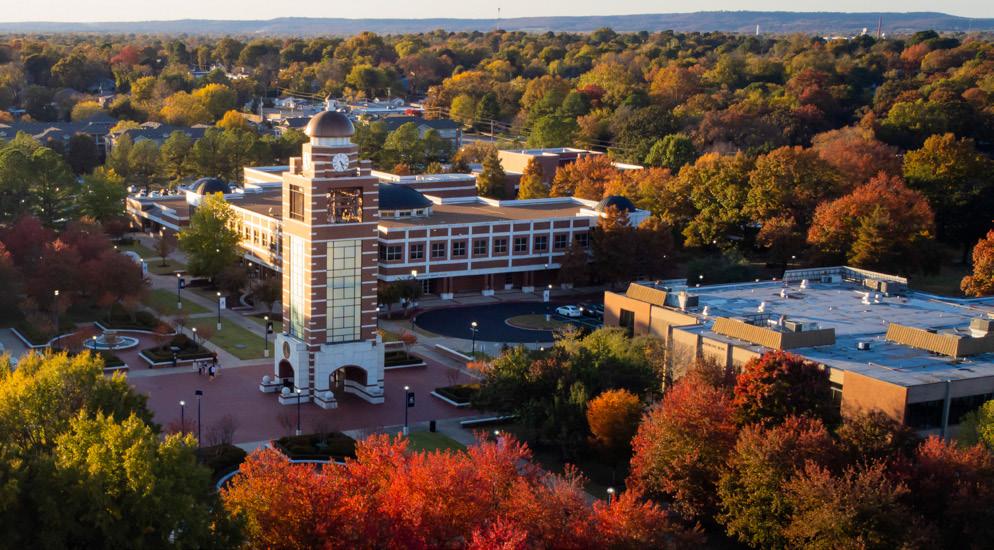


Julius Caesar
August 2-4, The Weekend Theater
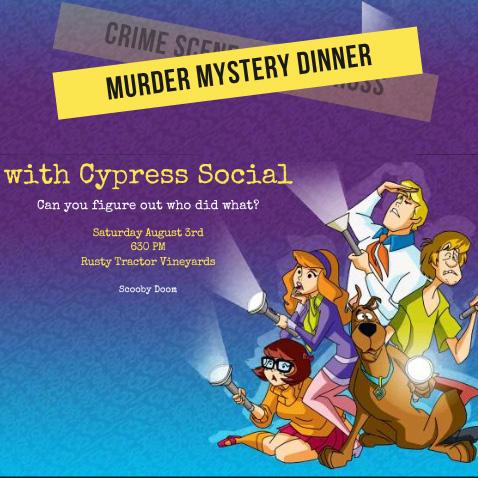
Dinner with Cypress Social at Rusty Tractor Vineyards
August 3


August 10 & 24
Sunset Lodge at Rusty Tractor Vineyards Hot Springs Village/AR Rep Transportation

Arkansas Repertory Theater Arkansas Destinations

August
Fayetteville
Venix


BY TRICIA LARSON

The earlier you start talking about money with the children, the better. That’s the consensus of local finance experts and Arkansas teens.
“The very first opportunity many of us have to learn about money is the arrival of that first piggy bank,” Lorrie Trogden, president and CEO of the Arkansas Bankers Association, said. “Learning at an early age that pennies, dimes and nickels can add up to dollars pretty quickly is a lesson that can last a lifetime.”
While the classic coin counter remains a useful tool, today’s Generation Zers and Generation Alphas are opening online accounts at younger ages. Traditional banks and fintech companies have developed financial products tailored for children, adolescents and older college-bound teens. This means that financial literacy — and financial digital literacy — are increasingly important.
For children, Shamim Okolloh, a Little Rock-based banker and author of the children’s book “Ella
the Banker,” says financial literacy means understanding the value of money and how it is earned, saved and spent. She says it includes basic skills like budgeting their allowance, understanding the difference between needs and wants, and recognizing the importance of saving for future goals.
Okolloh believes teaching children about money early instills positive financial habits that can last a lifetime — and she’s not alone. Marsha Masters, associate director of Economics Arkansas and member of the Arkansas Financial Education Commission, says that equipping children with the knowledge and tools needed to make informed decisions about money will lead to success in the future.
Regina Lilly, a former school teacher, local business owner and author of the upcoming book “Credit vs. Credentials: The Ultimate Financial Guide,” sees financial literacy as a tool of empowerment and opportunity. “It’s a way to break cycles and create generational wealth,” Lilly said. Most importantly, in roundtable
discussions held by the Arkansas Financial Education Commission (AFEC), Masters says conversations with students have yielded great insights, including a nearly universal call by teens across the state for earlier lessons in saving and spending. Masters said students told commission members that waiting until high school to broach these topics is too late; by that point, habits are already formed. She also said students were “very transparent about the good and not-sogood spending habits that they see at home.”
While starting conversations about money with children can be uncomfortable and may seem daunting — especially if, as an adult, you haven’t always modeled the best behavior or struggle with financial understanding yourself — there are easy ways to introduce financial literacy concepts and local resources exist to help parents start teaching (and practicing) these valuable lessons.
Sarah Catherine Gutierrez, CEO of Aptus Financial and author of “But

First, Save 10,” stresses that parents don’t have to be perfect. She says that a desire to give children knowledge is all that is needed. “You can tell your child that no one told you this, but you’re telling them now, and now you’re working on good habits, too.”




Lilly echoes this sentiment, even coining what she calls the “Mean Girl Approach,” which stands for “model exceptional attitude now.” She says it is never too late to start modeling the behavior you’d like your children to adopt.
To get started, Okolloh encourages parents to use everyday activities like grocery shopping or opening the mail as conversationstarters and learning opportunities. She said making grocery lists with her children and setting a shopping budget were among the first steps she took with her kids to talk about financial management. “If it wasn’t on the list, they knew we weren’t going to buy it,” Okolloh said. “And sometimes it backfired — if I forgot to add something to the list that we needed, I would get in trouble!”
Okolloh says when bank statements come in the mail, use the opportunity to talk about saving, investing, interest and other financial concepts. If you, as a parent, don’t have the skills, she says banks can be great resources. Customers can always schedule time with a banker, bring their child, and go over the documents together to gain understanding. It’s a great learning experience, she said, for kids to enter a bank, interact with a teller and witness financial transactions.
Local experts agree that lessons about money should become more complex as children age and that the first lesson should focus on saving.
Gutierrez, who teaches and lives by the “Save 10%” philosophy, says if parents only focus on one thing, it should be ingraining the importance of saving and opening a savings account early. Gutierrez refers to saving as “paying yourself first” and says teaching your kids to put away 10% should start with that first birthday money or allowance — and should remain habitual when a kid’s first job begins to generate a paycheck.
Carrie Carr, vice president of investments for Aria Wealth Management, says that as soon as children receive a Social Security number, savings can start in a custodial or education account. “Time and habitual saving are the great equalizers when it comes to building wealth,” Carr said.
Second, experts say kids should be taught about using credit wisely and how interest rates impact the final cost of products and services. Credit card bills, Trogden said,
are another great opportunity to discuss spending. She said kids need to know that “plastic money isn’t free, and here’s what it costs us each month if we don’t pay the bill in full.”
Of course, digital financial literacy is important, too. As online banking becomes the norm, kids should learn how to conduct themselves safely and knowledgeably online. “Financial scams are rampant right now,” Trogden said. She encourages parents to advise children on the importance of keeping account information secure and that they are “secret numbers that should never be given away.”
Like Okolloh, Trogden agrees that banks have an important role in teaching financial literacy. The Arkansas Bankers Association works with schools and other organizations to schedule bankers for speaking engagements in classrooms and to provide financial literacy resources to the public on its website. While Economics Arkansas works to educate and train pre-K-12 teachers on incorporating economics and personal finance into schools’ curriculum, individuals in the community are also meeting this need.
LaShawna Heard is a certified financial educator who started hosting financial workshops for teens in Central Arkansas. Heard grew up in a family where listening to podcasts about money was a family affair. At an early age, Heard had an authorized credit card that her dad used to teach her the importance of building and maintaining good credit habits. “People are so scared of credit cards because they have no self-control,” Heard said. “But I learned self-discipline early and to only use credit cards for certain things and to pay it off before it’s due.”
Realizing that not everyone learned these life lessons, she founded Heard Financial Foundation to change that. “Changing your bad habits at 40 years old is hard; it’s hard at that point to fix your credit,” Heard said. “If you teach teens, they have a head start on creating good habits.”
More than 38 students participated in Heard’s last class, in which she taught kids the importance of living within one’s means, not succumbing to peer pressure to buy things they can’t afford, and what a manageable household budget should look like. When 80% of the kids in an early class didn’t know the difference between a checking and savings account, she learned to start with the basics and explain each account and how credit works. To keep the teens’ attention, she offers prizes throughout the class and provides examples they can relate to.
Arkansas Bankers Association arkbankers.org
Economics Arkansas economicsarkansas.org
But First, Save 10 butfirstsave10.com
Heard Financial Foundation @heard_financial_
Consumer Financial Protection Bureau consumerfinance.gov
Financial Literacy and Education Commission mymoney.gov
Next Gen Personal Finance ngpf.org

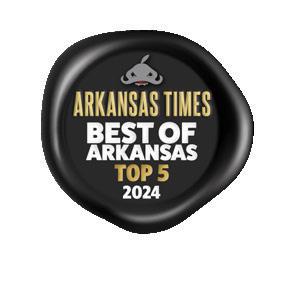
Through her foundation, Heard has partnered with a local bank and set up savings accounts for some of her workshop attendees, opening each account with $50 to kick off the savings.
Gutierrez says there is a wealth of impartial financial literacy information available through trusted organizations like the Consumer Financial Protection Bureau and the organization Next Gen Personal Finance, which aims to make financial literacy a graduation requirement for all high school students by 2030. The federal government has also created a website called MyMoney.gov, a resource for people of all ages that offers practical tools like budgeting calculators, worksheets and checklists.
“Our young people control our financial future,” Trogden said. “We owe it to them to prepare them for the challenges they will face in life. Personal financial education and money management skills are crucial to ensure that our young people are prepared to manage credit and debt and become responsible workers, heads of households, homeowners, investors, entrepreneurs and business leaders.”
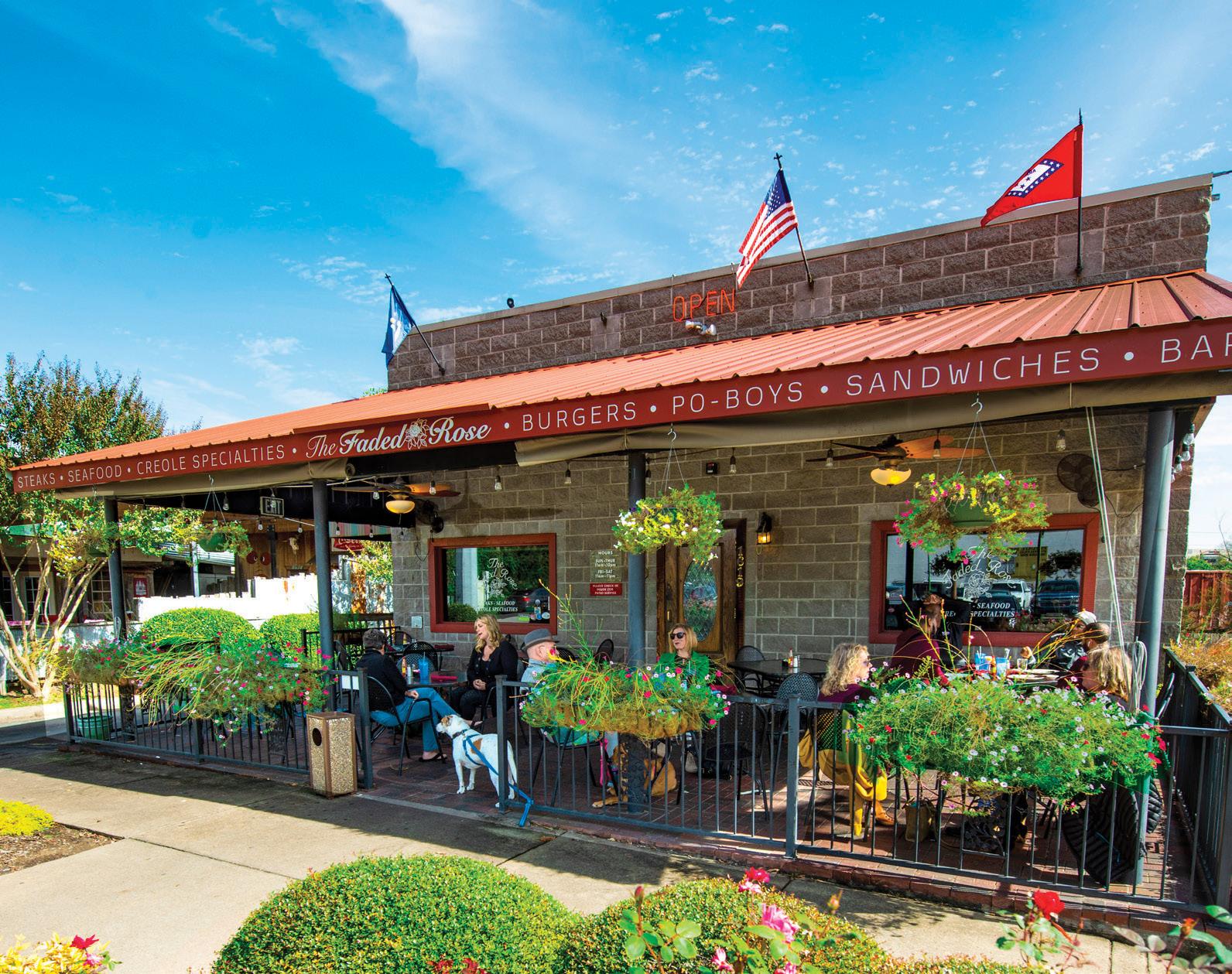



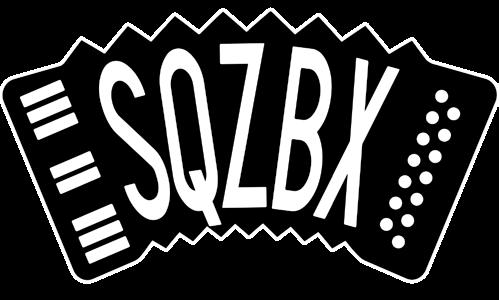
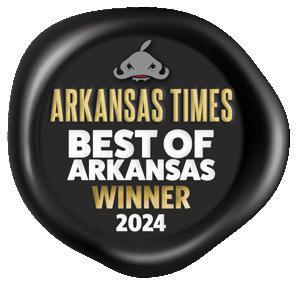



‘SECRET DOORS AND LOST TEXTS’
A Q&A WITH WRITER JEN FAWKES. BY
DANIEL GREAR PHOTOGRAPHY BY BRIAN CHILSON
MASQUERADE: “Daughters of Chaos,” the debut novel by Little Rock writer Jen Fawkes, flirts with historical realities, but then gleefully veers in the direction of fantasy and myth.
About two-thirds of the way through “Daughters of Chaos,” Little Rock writer Jen Fawkes’ debut novel, Sylvie Swift — the book’s closest thing to a protagonist — ventures beneath the brothel where she’s been staying in Civil War-era Nashville and discovers that the prostitutes are up to something darkly mystical, foregoing sex work in favor of feminist rituals through which they subtly reprogram the violence-prone psyches of their clientele.
Sylvie’s path to the brothel’s undercroft is only a single strand of Fawkes’ novel, though, unfolding in parallel to two other tales. First, there’s an ancient playscript called “Apocrypha” that becomes Sylvie’s destiny to translate from French to English. Loosely inspired by the real-life Aristophanes text “Lysistrata,” it concerns a movement of Greek women who masquerade as prostitutes in order to thwart the militaristic schemes of Athenian patriarchy. It’s frequently hilarious, with classical and modern language and sentiments enmeshed in a surprisingly intuitive way.
Then there’s the brief biography of Gaia Valentino, a 16th-century Italian woman and literary prodigy who originally translated “Apocrypha” into French, and who dressed up as a man in order to work as a gondola driver, allowing her to amass a cultural facility not typically available to women of the era. Acting as a Union spy, Sylvie participates in some rebellious masquerading, too, landing her one step closer to understanding the larger, millenia-long conspiracy of feminine empowerment — the Cult of Chaos — to which all three narratives belong.

“Daughters of Chaos” also includes other found texts real and imagined, like actual entries from the eighth edition of “Encyclopedia Britannica” and heartfelt letters from Sylvie’s brother, whose missives are littered with family secrets and tidbits about the early submarines he’s piloting for the Confederacy. It’s a lot to hold in your mind at once, and occasionally the book feels bloated by competing interests, but I think the best way to read “Daughters of Chaos” is to conceive of it as adjacent to a linked short story collection, where most of the threads stand alone but are made stronger and more human through juxtaposition.
Before the release of “Daughters of Chaos,” which came out in July via The Overlook Press, we spoke with Fawkes — also the author of “Tales the Devil Told Me” and “Mannequin and Wife” — about her writing process and the novel’s preoccupations.


BALANCING ACT: Braiding multiple settings and timelines, Fawkes uses “Daughters of Chaos” to juxtapose characters from ancient Greece, 16th-century Venice and Civil War-era Nashville.
In the author’s note at the end of “Daughters of Chaos,” you mention that the novel was initially a failed attempt to fictionalize a Smithsonian Magazine article about how Union authorities in Nashville tried to exile the city’s prostitutes during the Civil War. That plot point remains in the story, but it’s not the focus. What didn’t work about that approach and how did you find the right one?
When I had a couple of high-profile stories come out in major venues, different literary agents reached out to me, and one of them read the book that I had written at the time and was like, “I don’t like this.” But I had mentioned a story that’s set in a brothel in Nashville and she’s like, “I like that idea. Have you done any writing?” And I was like, “No, but I could.” So it ended up that she signed me for this idea, which was not remotely a book yet.
She wanted me to write an upmarket [combining commercial and literary concerns] women’s fiction book, which is not what I do. I do something that’s far more strange and out there. I was trying desperately to write something that was never going to work because I hadn’t figured out how to make this my story. I was trying to write a straight-ahead mystery book. I wrote three drafts. And when I sent the third draft to my

agent, she then fired me. I’m laughing about it now, but I had a nervous breakdown. I mean, not literally. It’s not like I was hospitalized or anything, but it was incredibly hard. As it turns out, most writers have multiple agents, and split up with their agents. I have an MFA and Ph.D. in creative writing, but no one in those spaces teaches you about the business of publishing.
Then, I read Aristophanes’ “Lysistrata,” which I had last read in college, and I had a literal epiphany. And I was like, “What if Sylvie was a translator? What if there was a lost play?” Which is something that I love. I love secret doors and lost texts. It was figuring out that what I needed to do was braid different storylines, and employ the epistolary form, that enabled me to break the novel up into segments that I could work on separately. I wrote each of the strands in one go and then figured out how to integrate them.
With my short fiction, I write it start to finish, really no changes, which is not how most writers work. Most writers draft and figure things out as they go. But I’m the kind of writer who doesn’t move forward until I’m absolutely sure that I’m branching in the right direction. So if I go in the wrong direction and realize the story isn’t working, I back up to the last place I was sure. But it will take you a very long time to write a novel that way. So
one of my main challenges transitioning from short fiction to novel writing was figuring out how I could break it up into manageable pieces, because a novel is so vast.
Which of the strands was the most challenging to write?
The main Nashville story was the hardest for me because some of the other strands [have qualities] that I tend to love, like the absurd and comedy and things that are dramatic. But I wanted the Sylvie section to feel more staid and calm and fairly grounded because I felt like I was asking a lot of the reader. I’m asking them to read an ancient Greek play that is supposedly by Aristophanes. I’m asking them to incorporate different kinds of texts and be able to deal with those tonal shifts that happen. Also, I did so much research about what life would have been like in Nashville.
A good portion of this book exists in a mythic or magic realism space, but what things were important for you to get historically accurate?
My first cousin lived in Nashville for many, many years. She lived in this big house on Love Hill and I went to visit her while I was working on this book many times. I stayed with her, went down to the river and felt the space down there. Even though I’ve never lived in Nashville and I don’t have a real personal connection to it, I wanted people who live there to recognize the streets and parts of town. There’s a fort in the book where a scene takes place — Fort Negley — and it’s preserved as a park. I went to Negley multiple times and explored the fort remains that are there.
There were all sorts of questions about dress, how the streets would have been paved or not — they weren’t — and what things would have looked like. I looked at tons of old pictures of Nashville from the Civil War, sought out newspaper articles and maps, and studied all of those to figure out how to do the setting. I’m not a big setting person, but setting out to write a book like this you really have to focus on that. There are some writers who are writers of place — like Flannery O’Connor or Stuart Dybeck with Chicago — who are from areas where everything they write is set. I’m not like that because I’ve moved all my life from place to place to place. I’ve always felt rootless.
Also, I like books that use actual historical figures — like “Ragtime” by E.L. Doctorow and “Jonathan Strange and Mr. Norell” by Susanna Clark — and I already was doing that in the first incarnation of the book. John Wilkes Booth has been in the book since the very first conception of it. But when I did this major overhaul and completely rewrote it, I
put in more historical figures. I like work that feels real and surreal at the same time.
The women who live at the Nashville brothel — The Land of the Sirens — aren’t really prostitutes. They’re pretending to be, but are instead using their position as a way to engage in clandestine, anti-war efforts. What’s the significance behind the fact that they’re not actually sex workers?
These women can basically do anything they like, so I’m not saying that any of them aren’t having a good time with men or women or whoever they’d like to, but writing about that aspect of life was one of the things that was hanging me up in the original conception of the book. Because I’ve never been a prostitute. I don’t want to write about sex work in a serious way, although I think that’s wonderful. That’s something for someone else to do. The point of my book was not to explore historical sex work, which I think a lot of people are interested in. It’s not that I didn’t want to explore the sexuality of the women at all — it’s not that I couldn’t have tried to include some scenes of women feeling and exploring their own sexual power and potency — but the main thrust of their work is to overthrow.
When you were writing the “Apocrypha” section, which is supposedly a lost comedy by Aristophanes, to what degree were you trying seriously to approximate his voice?
Reading “Lysistrata” or another Greek comedy, a lot of today’s readers would not make it through. The chorus has a large speech that they open with. The chorus has a lot to say. And these plays are full of jokes that were period-appropriate but today we don’t understand. I wanted to approximate the tone and feel of an ancient Greek comedy — extremely bawdy with lots of sexual humor and proclaiming and exclamation marks — but write one that people could read and follow today. The structure is based loosely on the way that “Lysistrata” works. I think there’s the same number of acts. I was really excited when I realized I could bring in the Greek gods because, although no gods appear in “Lysistrata,” Aristophanes has three or four plays in which the gods do appear as characters.
There are three plays that Aristophanes wrote in which women take power. They could be seen as proto-feminist writing, but in each of those, it’s a joke. It’s in the subtext of the play that women couldn’t run things. The whole thing is like, “Wouldn’t it be ridiculous if women took power?” So obviously for my play, I wanted to completely twist that and have them be successful.
This interview has been edited and condensed for clarity.




















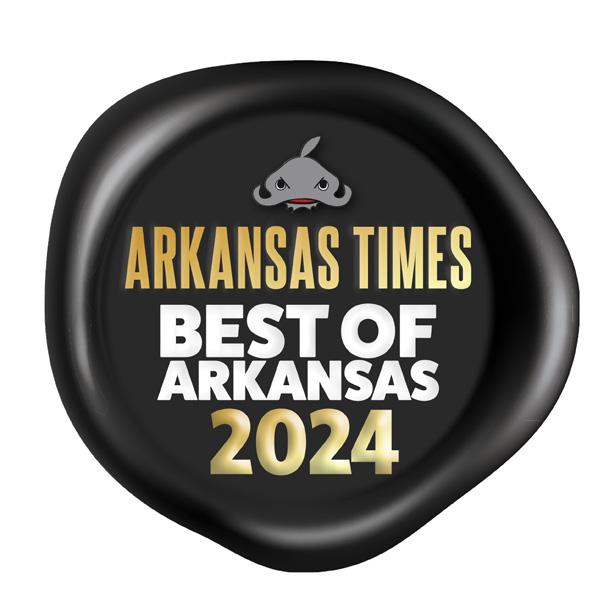
Congratulations to reader faves Toddy Tobacco & Vape Shop, University of Arkansas Pulaski Technical College, Box Turtle, University of Arkansas for Medical Sciences and more, winners in our annual Best of Arkansas readers poll who were inadvertently omitted from our July issue. Mea culpa and major congrats!
EDUCATION
BEST PRE-K OR PRESCHOOL
Winner: Little Rock School District
Finalists: Little Rock Christian Academy, Child Development Center, Langston Aerospace and Environmental Magnet School, Pulaski Heights United Methodist Church Early Learning Center
COMMUNITY COLLEGE
Winner: UA-Pulaski Tech (North Little Rock)
Finalists: National Park College (Hot Springs), Northwest Arkansas Community College (Bentonville), University of Arkansas Community College at Morrilton, Southeast Arkansas College/SEARK (Pine Bluff)
FOUR-YEAR COLLEGE OR UNIVERSITY
Winner: University of Arkansas (Fayetteville)
Finalists: Hendrix College (Conway), University of Arkansas at Little Rock, University of Central Arkansas (Conway), Arkansas State University (Jonesboro)
PRIVATE SCHOOL
Winner: The Anthony School
Finalists: Episcopal Collegiate School, Little Rock Christian Academy, Pulaski Academy, Catholic High School for Boys
PUBLIC SCHOOL
Winner: Little Rock Central High School
Finalists: North Little Rock High School, Conway High School, Parkview Arts and Science Magnet High School, Pulaski Heights Middle School
LOCAL ENTERTAINMENT
FAMILY ATTRACTION
Winner: Little Rock Zoo
Finalists: Magic Springs Theme and Water Park (Hot Springs), Main Event, Museum of Discovery, Topgolf
MEDICAL AND PERSONAL CARE
OPTHALMOLOGIST
Winner: Dr. Tracy Baltz (Little Rock Eye Clinic)
Finalists: Dr. Edward Penick (Central Arkansas Opthalmology), Dr. Paul Phillips (UAMS Health)
OPTOMETRIST
Winner: Dr. Kathryn Brown (UAMS Health-Harvey & Bernice Jones Eye Clinic)
Finalists: Dr. Brittany Boyette (Sherwood), Dr. Megan Shirey (UAMS Health), Dr. Sophear Seng (Shackleford Family Eye Care), Dr. Brian Guice (Kavanaugh Eye Care), Dr. Derek Scott Long (Maumelle Eye Care), Dr. Julie Dolven (James Eye Care)
PAIN SPECIALIST
Winner: UAMS Division of Interventional Pain Medicine
Finalists: Arkansas Pain Management, Dr. Ahmed Ghaleb (Baptist Health), Little Rock Pain Management, Natural State Pain & Wellness
SHOPPING
MEN’S CLOTHING
Winner: Baumans Fine Men’s Clothing
Finalists: Father & Sons Clothier (Pine Bluff), J Duke and Co., Mr. Wicks, The Woodsman Company (Fort Smith)
MOBILE PHONE PROVIDER
Winner: AT&T
Finalists: Straight Talk Wireless, T-Mobile, Verizon Wireless
MOTORCYCLE DEALER
Winner: Rock City Harley-Davidson
Finalists: Richards Honda-Yamaha, Sunrise Yamaha Motorsports (Searcy), Rodney’s Cycle Shop, Mike Johnson’s Powersports (Russellville)
OUTDOOR STORE
Winner: Ozark Outdoor Supply
Finalists: Bass Pro Shop, Domestic Domestic, Fort Thompson (Sherwood), The Woodsman Company (Fort Smith)
PAWN SHOP
Winner: Braswell & Son Pawn Brokers
Finalists: Big Daddy’s Pawn Shop, National Pawn Shop (North Little Rock), Pawnderosa Pawn, Randy’s Pawn Shop Inc. (Fort Smith)
RV/CAMPER DEALER
Winner: Moix RV Supercenter (Conway)
Finalists: Crain RV (Benton), Gander RV & Outdoors (North Little Rock), Goss Camper Sales, Kiko’s Kountry RV (North Little Rock)
SHOES
Local Winner: Rock City Kicks
Winner: Dillard’s
Finalists: Domestic Domestic, Fleet Feet, Warren’s Shoes
SPORTING GOODS
Local Winner: Gene Lockwood’s
Winner: Academy Sports + Outdoor
Finalists: Dick’s Sporting Goods (North Little Rock), Ozark Outdoor Supply, Rock City Running
TOY STORE
Winner: The Toggery
Finalists: Domestic Domestic, Box Turtle, Knowledge Tree, The Geeky Oasis (Sherwood)
VAPE SHOP
Winner: Toddy Tobacco & Vape Shop
Finalists: Rogue Vapers, Abby Road, Emerald’s Triangle (Jonesboro)
VINTAGE CLOTHING
Winner: Crying Weasel Vintage
Finalists: Oak Forest Vintage, The Retro Fit (Hot Springs), Thriftpologie, Vintage Socialite
WOMEN’S CLOTHING
Winner: Anthropologie
Finalists: Crying Weasel Vintage, BEIGE, J. McLaughlin, Thriftpologie






BY DAVE ANDERSON

PIZZAPEEL: Brian Krikorian puts his heart where his dough is.
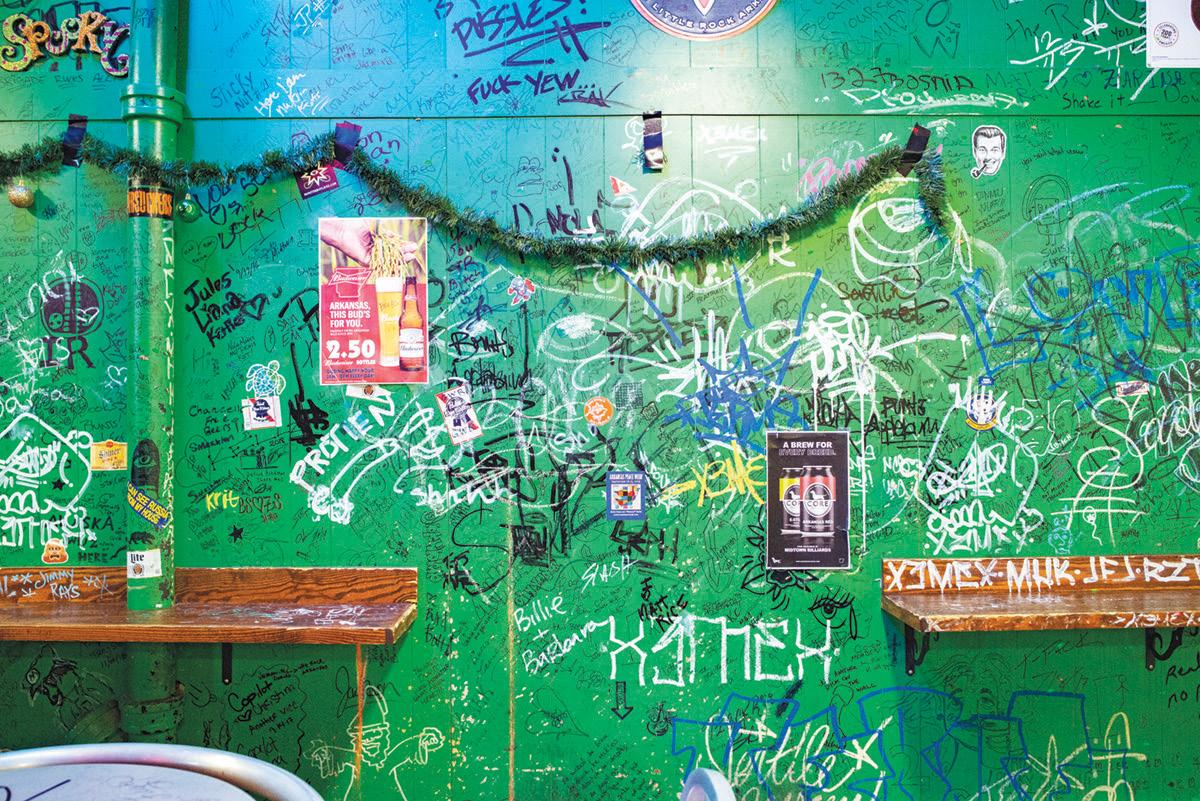
The back of Brian Krikorian’s head is as flat as a pizza stone. Genetics, you ask?
Nope. The founder of Different Dough Pizza Co. in Bryant has a much simpler explanation: an infancy spent resting in the car seat his parents parked beneath the cash register of the family’s pizza joint in Bryant.
“I was born on a Monday,” Krikorian said. “By Friday night, Mom was out of the hospital, and I was under the counter.” He told the story with relish as the rain from Tropical Storm Beryl pelted the cozy Bryant space he converted just one short year ago, not far from the kitchen where he once napped as a baby.
Now 28, this pizza-obsessed young chef has survived the nail-biting early days of past-due bills and dough-mixing challenges, emerging into the sunny glow of ecstatic foodie embrace.
Different Dough Pizza Co. is not just another pizza joint; it’s the years-in-the-making product of a world-class pizza obsessive. Serving the tastiest of traditional New Yorkstyle thin-crust pizza, it also stealthily introduces Arkansas to the hottest pizza style fresh from The Mitten State of Michigan: the deep dish, sauce-on-top, cheese-crusted Detroit-style pizza.
Every luscious, rectangular Detroit slice begins with that signature cheese crust. This crunchy, flavorful mix of mozzarella, cheddar and provolone (called a “frico” cheese edge) quickly gives way to the pillowy heaven of Krikorian’s signature dough, which he then tops with heaps of Wisconsin mozzarella (the cheese of choice among many pizza hot shots), big dollops of sauce and the freshest of toppings. (Hint: The Cup-n-Comb pie, which is drizzled with Mike’s Hot Honey, is to die for.)


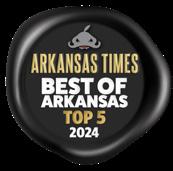
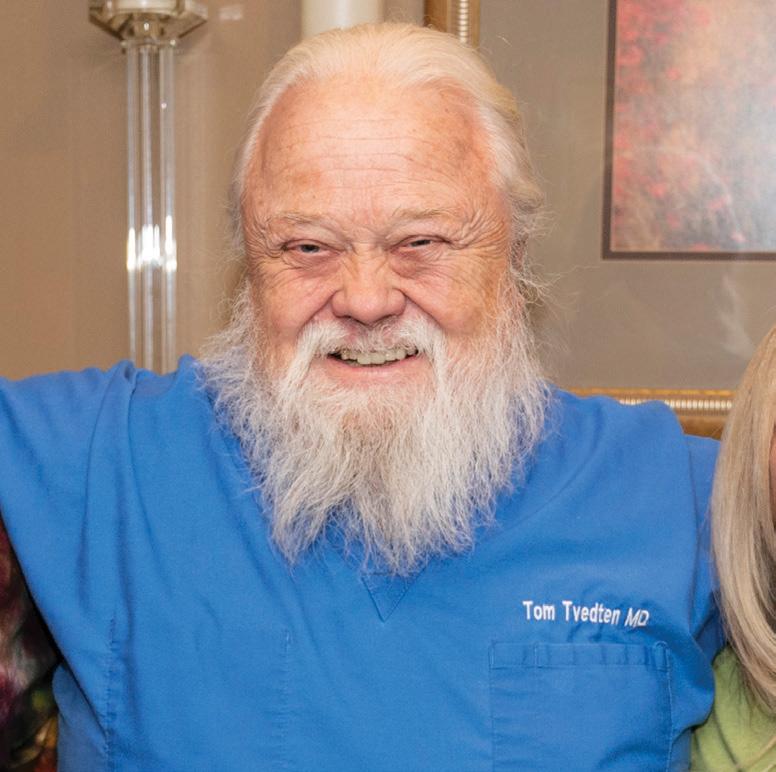



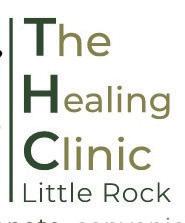



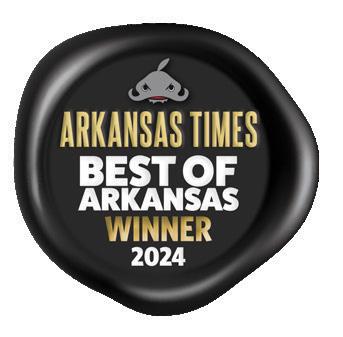
“ANYTHING
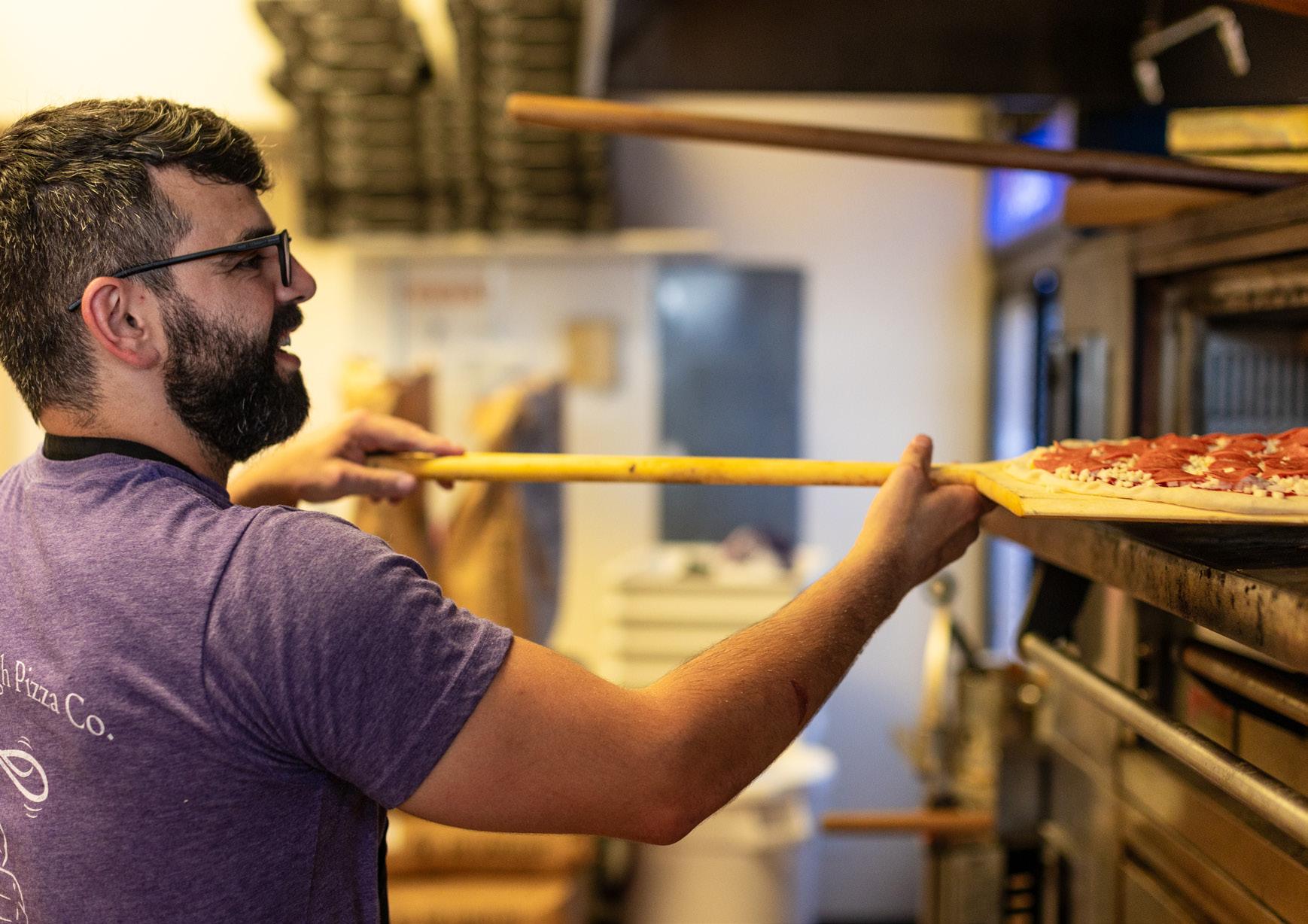


Krikorian’s parents owned two Bryantbased pizza places (Sergio’s Pizza and later Sergio’s Extreme Pizza). They also had a catering business that became so popular they decided to close the pizza place. Brian was 13 and not pleased. Upset at losing the nonstop stream of pizza he’d been raised on, Krikorian did the natural teen rebel thing and wrote a business plan for a pizza place. He described the original concept as “eerily similar” to the spot he would open 13 years later.
Fast-forward to college at Henderson State University, where Krikorian purchased his first pizza oven and started cooking on the sly. “I would make pizza in the dorm room if I knew my [resident assistant] wasn’t around. Or I’d go to my friends’ apartments and make it there,” he said. “I’ve always been making pizza and fine-tuning.”
While able to pull good grades, he never cared much for school. But he did take every business class he could to learn how to run one of his own. One of those classes featured a Chick-fil-A consultant who took a shine to Krikorian, eventually helping him join the company and rise up the ranks to manage one of the most efficient locations in the country. Meanwhile, he kept voraciously consuming and making pizza. A fortuitous trip to the annual International Pizza Expo in Las Vegas led to meeting legendary pizza maestro Tony Gemignani, the first American to win the World Pizza Cup in Italy. Krikorian jumped at the opportunity to learn from the best and traveled to San Francisco, attending Gemignani’s pizza school in the kitchen of Tony’s Pizza Napoletana. While there, Krikorian was able to try his hand at learning (and sampling) over 10 different styles of pizza.

It was there that he came across his first Detroit-style pizza. One bite and he was smitten.
“I fell in love immediately,” he said. “Detroit-style pizza is the epitome of the best qualities from every pizza.”
The dough (“a little bit chewy but should give”), cheese (“not overwhelming but a good amount”), and sauce (“a little bit heavier”) are perfectly balanced with the unique cheesy crust that makes a memorable final impression (“a nice crispy exit you can’t get anywhere else”).
Not one to waste time, Krikorian finished that first slice and bought a Detroit pan “the moment I left that day.” He also “bought special flour and literally anything and everything” he could possibly need to make the specialty pizza. He was making Detroits at home within a matter of weeks.
Returning to Little Rock, he continued working at Chick-fil-A, saving money and perfecting his recipes and restaurant management skills. Eventually, he approached his parents about repurposing the family food truck into a pizza operation. With discussions underway, he ran by Brooklyn Pizza for takeout one night and discovered it had closed. Two short months later, he had updated the business plan, arranged a loan and financing, and taken possession of the property.
Different Dough Pizza Co. opened to the public in May 2023.
The reaction was positive and encouraging. The restaurant began selling out almost immediately. But things slowed in the summer and started to get a bit precarious.
“The newness wears off and summer comes full swing,” Krikorian recalled. “People are going on vacations, I’m losing sales and then I’m freaking out.”
Working for free to keep his staff paid, bills at home were piling up. His car was saved from repossession only by an erroneous address on file with the creditor.
Krikorian was able to institute some production efficiencies and things began to pick up in the fall. Meanwhile, Kevin Shalin of The Mighty Rib food blog caught wind of the place, mentioning his interest on Facebook, and then appeared at the restaurant one night with his daughter.
Krikorian, as he always does, circled the dining room meeting customers. That’s when he heard the magical words, “I run the Mighty
Rib and I want to let you know your pizza is really good.”
“I was like, holy shit!” Krikorian exclaimed. Different Dough quickly received a ringing endorsement from Shalin (“Is one visit too early to anoint a place as pizza royalty? Maybe. But darn it, Different Dough Pizza Co. has me in a tizzy.”). Not long after, the restaurant made Shalin’s year-end list and growth has been exponential ever since.
While the traditional New York-style pizza is Different Dough’s most familiar and popular, the Detroit-style pies are fast becoming a favorite among customers in the know. They’ve also created a new constituency of customers: Michigan expats living in Arkansas.
“I did not realize Arkansas was such a hot spot for people that once lived in Michigan,” Krikorian said. “We get three to four unique customers from Michigan every week.”
“Anything that reminds me of growing up in Detroit, I’m gonna take it,” declared Bryant truck driver Terrell Myles. “You can tell he prepares that food with love. And you can tell he loves what he does.”
David Campbell, who grew up in Pinckney, Michigan, heard about Different Dough and came right away. “I was definitely stoked about this,” Campbell said. “It’s a bit of a drive from North Little Rock, but it’s just like the nostalgia thing. Like playing pond hockey or something like that.”
Campbell was wearing a Michigan State sweatshirt on one visit and was spotted by another Michigan native (and Michigan State Spartan fan). He was soon invited to join a text chat group of Spartan fans residing in Central Arkansas.
Such is the life of an expat Michigander, finding a tasty bit of home courtesy of a kid who was practically born in a nearby family pizza place and inspired by a great Michigan dish. There’s a kind of symmetry to it. Nostalgia, home and food.
For Krikorian, it’s a dream come true to see all of this happen in the cozy little spot he’s made not far from the kitchens he once napped in as a child.
“I’m just some kid who was lucky enough to find something he loved at a very young age and be able to do it for a living,” he said. “That’s the most beautiful thing in the world. I get to live an actual dream. Most people don’t get to say that, and I’m forever grateful.”
So are we, Brian.


HOW A PROPOSED MEDICAL MARIJUANA AMENDMENT COMPARES TO LAWS IN NEIGHBORING STATES.
BY GRIFFIN COOP
Sponsors of a state constitutional amendment to expand Arkansas’s medical marijuana program announced last month that they turned in 111,402 signatures to state officials. If 90,704 of those signatures are verified and the group thwarts any legal challenges, the Arkansas Medical Marijuana Amendment of 2024 appears headed for the November ballot.
With that in mind, we took a look at how the proposed expansion compares to the state’s existing medical marijuana program and how it would compare to programs in surrounding states.
The amendment would not create any new dispensaries or cultivators, but would increase access to the program in several ways. The ballot measure would allow more types of medical professionals to certify patients; surrounding states allow nurse practitioners, physician assistants, doctors of osteopathic medicine (DO, in the chart at right) or other professionals to do certifications. The expanded program would also allow those professionals to certify patients for any debilitating condition, not just the 18 medical conditions that currently allow a patient to qualify for a medical marijuana card.
The expanded program would also eliminate the cost of a medical marijuana card; Arkansas patients now pay a nonrefundable $50 annually to maintain their patient card.
The expanded Arkansas program, like those in Oklahoma and Missouri, would allow patients to grow some plants of their own. Arkansas’s proposed maximum of seven mature plants and seven immature plants is similar to the plant limits in other states.
plus any other debilitating condition recognized by a medical professional
conditions. Medical professionals must use the same standards as they would for recommending or approving any medication

2nd
10th
24th
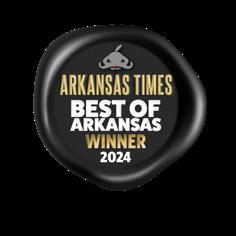




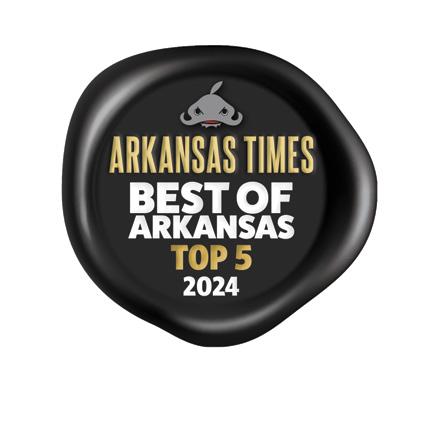






Runway fashion, massage therapy, mental health experts and more at the Arkansas Times Cannabis & Wellness Expo. BY
As the state’s medical marijuana industry continues to grow, experts are keen to explore health and wellness through a cannabis lens. Lucky for Central Arkansans, the Cannabis and Wellness Expo is set to blaze through the capital city on Friday, Aug. 16 (Industry Day), and Saturday, Aug. 17 (Consumer Day). Presented by the Arkansas Times and the Arkansas Cannabis Industry Association, this event offers a jam-packed schedule from 10 a.m.4:20 p.m. on both days at Simmons Bank Arena in North Little Rock.
Sponsored by Good Day Farm, the expo is the sole networking cannabis event of the year for industry professionals and premier cannabis education opportunity for patients and consumers. No medical marijuana card is required, but you must be 18 or older to join the fun.
Friday’s programming is all about the cannabis industry pros and hopefuls, featuring a variety of educational sessions. Get the lowdown on the latest legislation from the Alcoholic Beverage Control Division, learn about the ballot initiative supporting the expansion of the state’s medical marijuana program and see how these changes might impact your cannabis business. Plus, this year we’re introducing the Big Bud Classic, the state’s very first official cannabis competition, emceed by MMJ Arkansas. We’ll announce the winners on Saturday afternoon — at 4:20 p.m., of course.
Saturday’s schedule opens up to a wider audience, including medical marijuana patients, the cannabis-curious and
ARKANSAS TIMES STAFF
the general public. The arena will transform into a cannabis wellness wonderland, complete with booths, vendors, live demonstrations and patient panels. You’ll find mental health therapists, health clinics, dispensaries, CBD vendors, skincare experts, massage therapists, glass shops, acupuncturists, vape shops, clothing, artists, a pop-up cannabis kitchen with live cooking demonstrations and much more. Acclaimed Arkansas-based designer Korto Momolu headlines a “canna couture” fashion show at 1 p.m., an “Ask Ethel” Q&A panel answers your burning questions about cannabis, and the industry’s top growers share their best practices for cannabis cultivation. Meanwhile, the Roots & Reefer podcast records live from the arena floor.
Dive into sessions on microdosing, the entourage effect and the 18 state-approved qualifying conditions. Discover more about veterans’ health and get insights from a diverse patient panel of current cardholders. On-site doctors will be available for certifications.
Alongside the educational programming, enjoy giveaways and live wellness performances, featuring yoga and more.
Our exhibitors and participants include names like Good Day Farm Dispensaries, Custom Cannabis, The Source, Greenlight Dispensaries, Natural Relief Dispensary, Arkansas Natural Products, Dizpot, Benevolent Bakery, River Valley Relief, Osage Creek Dispensary, Buffalo Co, Smokiez Edibles, The Clear Vape, Z Cannabis Company, Healing Hemp of Arkansas, Now and Zen
Massage Therapy, Steep Hill, Chef Pete The Canna Chef, Cannabis By Women™ by SHAKE, CBD&ME® by SHAKE, Arkansans for Patient Access Campaign, Get Loud Arkansas, Clover & Stone, Little Rock Chiropractic and Acupuncture, Core Wellness, Restoration Health, Arkansas NORML, Central Arkansas Pride, Arkansans for Limited Government, Robert Cook Massage Therapy, Arkansas Yoga Collective, Korto Momolu, SuprRock Goobers, Sound Extractions, Stained Hearts Glassworks, Tessi Todd Tie-Dyes, Spring River Dispensary, Natural State CannaShop, Ask Ethel, Glotologie Med Spa, WAT 22, Arkansas Beverage Control, Arcanna Analytics, Hippie Hounds, MMJ Arkansas, High Speed Extract, Dizpot, Flyway Brewing, Arkansas Times, Interventional Pain Specialists, The Healing Clinic and Speakeasy Dispensary.
This year’s sponsors include Custom Cannabis, Wright Lindsey Jennings, Dark Horse Medicinals, Natural State Medicinals, Leafology, Smokiez Edibles, The Clear, Keef Cola, Speakeasy Dispensary by Dark Horse, Greenlight Dispensaries, Dizpot, Leafology, Wana Brands, Benevolent Bakery, River Valley Relief, Arkansas Natural Products and Mary’s Medicinals. Participating physicians include Dr. Brian Nichol, Dr. Lee Nayles, Dr. Chizoba Usuwa, Dr. Willard Howard, Dr. Mary Clifton, Dr. Thomas Tvedten, Dr. Archie Hearne and Dr. Kimberly Whicker.
Don’t miss out — join us for a weekend that’s sure to be a high point in your wellness journey!
Support Little Rock Public Radio by becoming a sponsor! When you partner with Little Rock Public Radio you support independent local journalism. Visit our website to learn how your organization can be a part of Arkansas Tiny Desk, The Signal Event, or All Drinks Considered!
Learn more at www ualrpublicradio org/underwrite-programming Or call 501-916-6400

Arkansas Times magazine is expanding our advertising sales staff.
The Arkansas Times is a mission driven magazine and online news source that is here to shine light on political skullduggery, celebrate our natural beauty and environment and spotlight the many culinary and cultural offerings this wonderful place has to offer. If you join our sales staff, you will be making a good living in addition to helping a magazine grow that is determined to make Arkansas a more just, prosperous and inclusive place to live.
This year marks our 50th year of publishing the Arkansas Times. In addition to the glossy magazine, arktimes.com is one of the largest online local news sites in the state with nearly a half million unique visitors a month. We sell advertising into all of these various media as well as into special sections targeted to the restaurant, college, legal and medical fields.
If you are fearless, have high energy, like people, and love learning new things from a wide variety of clients, then the Times might be for you.
Sales experience is preferred, but the greatest value is a willingness to work hard, close sales and renew business.
If this sounds like the type of place and the type of work you would like to do, email your resume to Brooke Wallace, Advertising Director at Brooke@arktimes.com.
OF MODEL RISK MANAGEMENT
(Little Rock, AR) Rspnsble for Model Validation & Review, Policy & Standards, Reporting, etc. Email CV to Simmons Bank: wendy.shirar@ simmonsbank.com.
HAVE JOB OPPORTUNITIES OR SOMETHING TO SELL? EMAIL LUIS@ARKTIMES.COM TO ADVERTISE IN MARKETPLACE.

The Observer’s daughter turned 16 in February. She’s never been much of a shopper or expressed any real interest in money, so I was a bit surprised when she told me she wanted to get a summer job. Nevertheless, when I saw that the Arkansas Travelers were hiring for the season, I sent her the link.
I didn’t expect her to apply, and certainly not right away, but that’s exactly what she did. She told them she wanted to work in the playground/splash pad area with little kids, and she proudly informed me that she was hired “pretty much immediately.”
Thursday night, July 4, while the Travelers were playing in Frisco, the organization opened Dickey-Stephens Park for anyone who wanted to watch Fourth of July fireworks over the Arkansas River while eating a ballpark hot dog. When my daughter’s boss asked who would be willing and able to work the kids’ zone that night, she volunteered. I asked if she was sure she wanted to work on a holiday. “It’s two more hours for my next paycheck,” she said. Hard to argue with that, I guess.
She, my fiancée Jess and I drove to DickeyStephens together on Thursday evening and got there early enough to get a spot on Willow Street, facing the fence behind the scoreboard above left field, where we could see most of the field and the crowd. My daughter went in to start her shift, and Jess and I stayed behind. Given the heat and humidity, we took advantage of the free admission and
went in only long enough to get hot dogs and drinks, then returned to the car to listen to the Travelers’ game on the radio while enjoying the wonders of modern automotive air conditioning.
For an hour after the gates opened at 7 p.m., kids and adults could even play catch on the outfield grass. If you squinted just right through the humidity and orange-red rays of sunset, you could almost make out an America that only ever existed in Norman Rockwell paintings and Baby Boomers’ fever dreams.
Before my daughter left the car, we’d all discussed whether to stay for fireworks after she returned. The general consensus among the three of us was, “Eh … doesn’t matter to me.” No one seemed particularly excited, but no one was opposed either. (That’s frequently how things go with a 16-year-old.)
Just before she finished her 2-hour shift, however, I was overcome with a wave of … sadness, I guess? It wasn’t really nostalgia, at least in the modern sense. I wasn’t pining for some memory of watching fireworks with my parents when I was a teenager; I was remembering those old days fondly and grieving a hypothetical future, 30 years from now, in which my daughter didn’t have similar memories to reflect upon.
Oh, sure, she’d seen fireworks before. There are plenty of pictures of her sitting on my shoulders at 2 and 3 years old, watching brightly colored explosions. But between a
divorce and a pandemic, plus the inertia that comes from letting things fall by the wayside, we hadn’t really made it a point to see Fourth of July fireworks in recent years. So I made the executive decision that we were going to stay and watch these.
Anyone watching the fireworks show without sudden emotional baggage would have found it to be just about the perfect length for a pyrotechnics display. As my daughter reached over and squeezed my hand during the grand finale, however, I found myself wishing the whole thing — the fireworks, the moment, her days of being a kid without the pressures of adulthood — would go on forever. But when the final red, white and blue streaks gave way to the night sky, I realized that the sadness I’d felt just 15 minutes earlier had given way to the kind of happiness that only shows up when your heart is truly full.
This whole thing isn’t directly related to Travelers baseball, I suppose. But, then again, in an alternative timeline in which we aren’t Travelers fans, I probably never send her the link to the open job position, and we likely don’t wind up there on a humid, non-game night to watch fireworks that we could have seen a bit better from other observation points.
In that situation, we almost certainly don’t find ourselves standing alone on a Willow Street sidewalk, sharing a moment that I hope she remembers forever.
I know I will.





